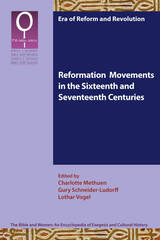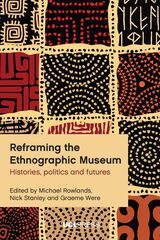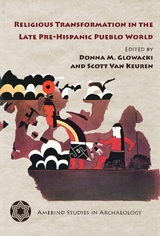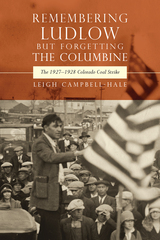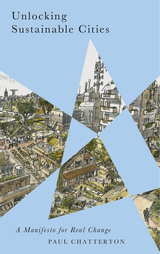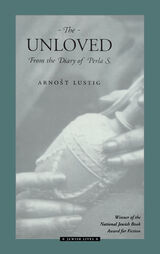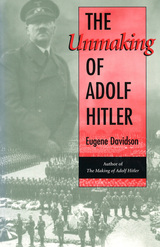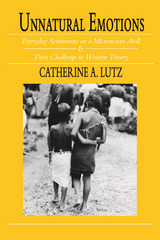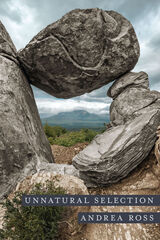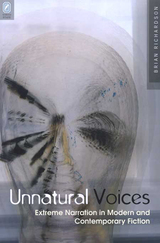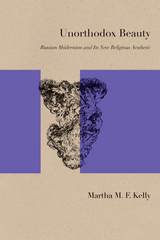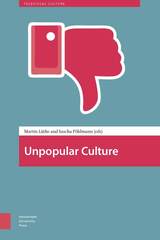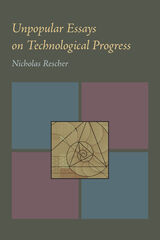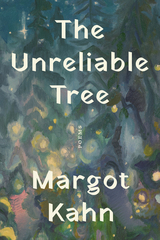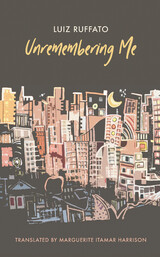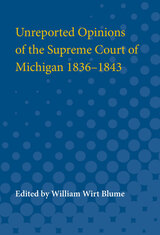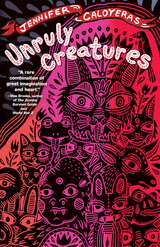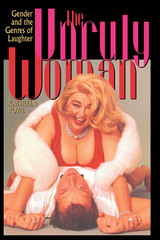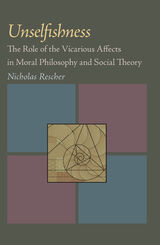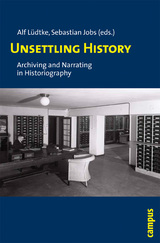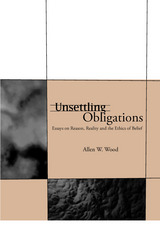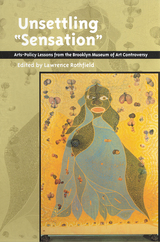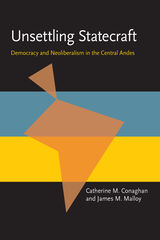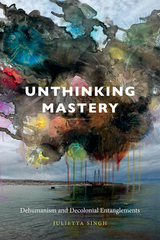Unlocking Sustainable Cities: A Manifesto for Real Change
Paul Chatterton
Pluto Press, 2018 Our urban spaces today struggle to thrive in the face corporate greed, increasing privatization, and rising inequality. Unlocking Sustainable Cities offers a way forward, challenging the unsustainable and damaging practices our cities are mired in and paving the way for alternative urban futures.
Across the world, people are implementing promising new practices—from transforming abandoned public spaces and setting up community co-operatives, to rewilding urban nature and powering up civic energy. Paul Chatterton explores how these grassroots experiments harness the creative power of the collective to transform our city systems, from transportation, energy, and economy, to community, democracy, and nature. Imagining radical alternatives—such as car-free, post-carbon, “bio cities”—this is a toolkit for realizing a better urban future.
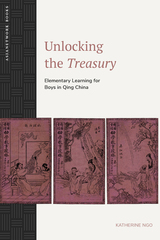 Unlocking the Treasury: Elementary Learning for Boys in Qing China
Katherine Ngo
Lever Press, 2025 In recent years, the renewed interest in traditional Chinese elementary educational material has led to an increased use of these texts as teaching materials in Chinese schools, as well as popular literature and in academic research. Unlocking the Treasury: Elementary Learning for Boys in Qing China seeks to address the existing gap in Western scholarship regarding pre-modern Chinese primary education, its theories, and textbooks. With a focus on the Qing dynasty textbook, Treasury of Elementary Learning (Youxue qionglin 幼學瓊林), this volume is the first major study of the Treasury in English and reveals a rich tradition of education through close and critical readings of the text.
Unlocking the Treasury grounds its study of primary education in the intellectual history of the period. Using the concept of interpretive communities, Katherine Ngo explores the impact of socio-political influences and differences in Qing schools of thought, including the school of principle, the school of heart-mind, and practical learning. As such, this volume examines the Treasury through three critical readings of the text: as a handbook for practical learning, a child-oriented reading of the school of heart-mind, and the instrumental perspective of education as examination training.
Ngo reframes the curricular content, skills, learning approaches, and teaching strategies of Chinese pre-modern elementary education with the goal of facilitating a broader transcultural dialogue in contemporary education. Far from the notion of traditional Chinese elementary education being monolithic and “rote learning,” Unlocking the Treasury reveals that elementary learning in the Qing dynasty offered a sophisticated and complex educational agenda with diverse learning goals of examination, preparation, moral development, and textual scholarship training that were shaped by intellectual trends of the time. An engaging text for scholars of Qing China and historians of education alike, Katherine Ngo’s Unlocking the Treasury is essential to understanding the philosophical, historical, literary, and psychological dimensions of education and educational theory in the Qing era.
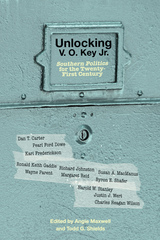 Unlocking V.O. Key Jr.: "Southern Politics" for the Twenty-First Century
Angie Maxwell
University of Arkansas Press, 2011 Over sixty years ago, political scientist V.O. Key Jr. published his seminal work, Southern Politics in State and Nation. Key's book redefined the field of southern politics and remains one of the most cited and influential works in twentieth-century political science and southern history. In Unlocking V.O. Key Jr., prominent southern scholars in history, political science, and southern and American studies reconsider Key's analysis, debating his omissions as well as highlighting the timeless elements of his work. Charles Reagan Wilson, Kari Frederickson, and Pearl K. Ford argue that Key's exclusion of religion, violence, and African American political participation altered the field of southern politics. Keith Gaddie and Justin Wert draw attention to Key's methodological innovations, while Margaret Reid questions Key's limited and gendered vision of the southern electorate. Harold Stanley discusses the complexity of teaching Key in the twenty-first century. Byron E. Shafer and Richard Johnston argue for the role that class and the economy played in the realignment of the South with the Republican Party, while Dan T. Carter points to race as the driving factor in this major shift. Susan MacManus tracks immigration trends in the region to explain contemporary southern political behavior. Supported with a foreword by Byron E. Shafer that provides an overview of Key's major contributions as a political scientist, and concluding with Wayne Parent's discussion of Key and the contemporary student, Unlocking V.O. Key Jr. is a must-read companion to the classic Southern Politics in State and Nation.
 Unloose My Heart: A Personal Reckoning with the Twisted Roots of My Southern Family Tree
Marcia Edwina Herman-Giddens
University of Alabama Press, 2023 A deeply personal memoir that unearths a family history of racism, slaveholding, and trauma as well as love and sparks of delight
Marcia Herman’s family moved to Birmingham in 1946, when she was five years old, and settled in the steel-making city dense with smog and a rigid apartheid system. Marcia, a shy only child, struggled to fit in and understand this world, shadowed as it was by her mother’s proud antebellum heritage. In 1966, weary of Alabama’s toxic culture, Marcia and her young family left Birmingham and built a life in North Carolina.
Later in life, Herman-Giddens resumed a search to find out what she did not know about her family history. Unloose My Heart interweaves the story of her youth and coming of age in Birmingham during the Civil Rights Movement together with this quest to understand exactly who and what her maternal ancestors were and her obligations as a white woman within a broader sense of American family.
More than a memoir set against the backdrop of Jim Crow and the civil rights struggle, this is the work of a woman of conscience writing in the twenty-first century. Haunted by the past, Unloose My Heart is a journey of exploration and discovery, full of angst, sorrow, and yearning. Unearthing her forebears’ centuries-long embrace of plantation slavery, Herman-Giddens dug deeply to parse the arrogance and cruelty necessary to be a slaveholder and the trauma and fear that ripple out in its wake. All this forced her to scrutinize the impact of this legacy in her life, as well as her debt to the enslaved people who suffered and were exploited at her ancestors’ hands. But she also discovers lost connections, new cousins and friends, unexpected joys, and, eventually, a measure of peace in the process. With heartbreak, moments of grace, and an enduring sense of love, Unloose My Heart shines a light in the darkness and provides a model for a heartfelt reckoning with American history.
 Unlove Story
Sudipto Pal
Seagull Books, 2024 A gay novel in which the rural landscapes of Bengal set the stage for a story that transcends the boundaries of tradition and love.
Mallar, a shy and introspective sixteen-year-old, finds himself drawn to Srijan, his classmate’s enigmatic elder cousin, during a fateful summer in a small-town family home. At first, Mallar’s fantasies take shape in secret sketches of Srijan. But soon, their connection becomes a complex play of mutual desire and dominance, which leads to the forging of a unique pact—a promise never to fall in love with each other.
As their lives take them from the serene landscapes of Bengal to the vibrant beaches of Chennai, the mysterious alleys of Paris, and the buzzing streets of Bangalore, the two men’s unconventional companionship deepens. With each meeting comes a new revelation, a fresh twist to their agreement, and a surprising facet of their identities. Mallar, reviving his childhood passion, embarks on a journey to establish himself as an artist. Collaborating on an art project, Mallar transforms Srijan’s body into a living canvas. But what begins as a creative endeavor quickly becomes a voyage into uncharted depths, as the canvas asks questions, challenges their resolve, and unravels hidden truths, culminating in new beginnings.
Delving into the intricate layers of two men’s lives, their fears, insecurities, hopes, and the mosaic of experiences that shape them, this novel is a testament to the complexities of human connection. One of the first openly gay novels written in Bengali, and the first to be translated into English, Sudipto Pal’s Unlove Story is a groundbreaking addition to the canon of queer literature from around the world.
The Unloved: From the Diary of Perla S.
Arnost Lustig
Northwestern University Press, 1996 Winner of the National Jewish Book Award for Fiction
Perla S. is a beautiful seventeen-year-old girl who, while interred in the Theresienstadt concentration camp, becomes a prostitute. Capturing Perla's voice through a series of diary entries, Arnost Lustig shows how she maintains her integrity, honesty, and hope amidst lies and horror. This first paperback edition has been extensively revised and expanded by the author.
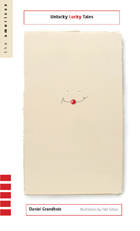 Unlucky Lucky Tales
Daniel Grandbois, with illustrations by Fidel Sclavo; foreword by Ed Ochester
Texas Tech University Press, 2012 Inventive, disconcerting, and hilarious, Daniel Grandbois’s present-day fables call to mind Rudyard Kipling's Just So Stories as readily as they do Italo Calvino's Cosmicomics, Rikki Ducornet's Butcher's Tales, and Woody Allen's most literary writings. Braced on the shoulders of the fabulists, fantasists, flash-fictionists, absurdists, surrealists, and satirists who came before him, Daniel Grandbois dredges up impossible meanings from the mineral and plant kingdoms, as well as the animal, and serves them to us as if they were nothing more fantastic than a plate of eggs and ham.Like Zen koans, these stories playfully short-circuit the brain to bypass normal thought and open the mind to undiscovered worlds of perception. As the human organism responds inexplicably to music, to particular combination of notes of varying pitches and durations and the intervals of silence between them, so too it responds in profound yet ultimately incomprehensible ways to the absurd, twisted language of Grandbois’ poetic prose.
 Unmaking Botany: Science and Vernacular Knowledge in the Colonial Philippines
Kathleen Cruz Gutierrez
Duke University Press, 2025 In Anglo-European botany, it is customary to think of the vernacular as that which is not a Latin or Latinized scientific plant name. In Unmaking Botany, Kathleen Cruz Gutierrez traces a history of botany in the Philippines during the last decades of Spanish rule and the first decades of US colonization. Through this history, she redefines the vernacular, expanding it to include embodied, cosmological, artistic, and varied taxonomic practices. From the culinary textures of rice and the lyrics crooned to honor a flower to the touch of a skirt woven from banana fiber, she illuminates how vernaculars of plant knowing in the Philippines exposed the philosophical and practical limits of botany. Such vernaculars remained as sovereign forms of knowledge production. Yet, at the same time, they fueled botany’s dominance over other ways of knowing plants. Revealing this tension allows Gutierrez to theorize “sovereign vernaculars,” or insight into plants that made and unmade the science, which serves as a methodological provocation to examine the interplay of different knowledge systems and to study the history of science from multiple vantage points.
The Unmaking of Adolf Hitler
Eugene Davidson
University of Missouri Press, 2003 The Unmaking of Adolf Hitler, which includes dozens of photos from German collections, covers literally every aspect of Hitler's life from his success after he came to power in 1933 to his self-destruction. Renowned author Eugene Davidson describes in detail Hitler’s stratagems in reviving morale and undoing the inequitable treaties imposed on Germany after World War I and his shrewd moves to take advantage of the fatal miscalculations of the coalition that had been aligned against the Reich. Once Hitler had brutally improved Germany's desperate state, there followed mortal errors and fateful mistakes of judgment arising from his own inadequacies. Compelling, well-researched, and eminently readable, The Unmaking of Adolf Hitler strives to explain how and why Hitler's empire collapsed from his own actions.
Available only in the USA and Canada.
 Unmaking Russia’s Abortion Culture: Family Planning and the Struggle for a Liberal Biopolitics
Michele Rivkin-Fish
Vanderbilt University Press, 2024 Honorable Mention, Davis Center Book Prize in Political and Social Studies, Association for Slavic, East European, and Eurasian Studies, 2025
As the predominant form of birth control in Soviet society, abortion reflected key paradoxes of state socialism: women held formal equality but lacked basic needs such as contraceptives. With market reforms, Russians enjoyed new access to Western contraceptives and new pressures to postpone childbearing until economically self-sufficient. But habits of family planning did not emerge automatically—they required extensive physician retraining, public education, and cultural transformation. In Unmaking Russia’s Abortion Culture, author Michele Rivkin-Fish examines the creative strategies of Russians who promoted family planning in place of routine abortion. Rather than emphasizing individual rights, they explained family planning’s benefits to the nation—its potential to strengthen families and prevent the secondary sterility that resulted when women underwent repeat, poor-quality abortions. Still, fierce debates about abortion and contraceptives erupted as declining fertility was framed as threatening Russia’s demographic sovereignty.
Although Russian family planners embraced a culturally meaningful liberalism that would rationalize public policy and reenchant relations, nationalist opponents cast family planning as suspicious for its association with the individualistic, “child-free” West. This book tells the story of how Russian family planners developed culturally salient frameworks to promote the acceptability of contraceptives and help end routine abortion. It also documents how nationalist campaigns for higher fertility denounced family planning and ultimately dismantled its institutions. By tracing these processes, Unmaking Russia’s Abortion Culture demonstrates the central importance of reproductive politics in the struggle for liberalizing social change that preceded Russia’s 2022 descent into war, repression, and global marginalization.
 Unmaking the Public University: The Forty-Year Assault on the Middle Class
Christopher Newfield
Harvard University Press, 2008 An essential American dream—equal access to higher education—was becoming a reality with the GI Bill and civil rights movements after World War II. But this vital American promise has been broken. Christopher Newfield argues that the financial and political crises of public universities are not the result of economic downturns or of ultimately valuable restructuring, but of a conservative campaign to end public education’s democratizing influence on American society. Unmaking the Public University is the story of how conservatives have maligned and restructured public universities, deceiving the public to serve their own ends. It is a deep and revealing analysis that is long overdue.
Newfield carefully describes how this campaign operated, using extensive research into public university archives. He launches the story with the expansive vision of an equitable and creative America that emerged from the post-war boom in college access, and traces the gradual emergence of the anti-egalitarian “corporate university,” practices that ranged from racial policies to research budgeting. Newfield shows that the culture wars have actually been an economic war that a conservative coalition in business, government, and academia have waged on that economically necessary but often independent group, the college-educated middle class. Newfield’s research exposes the crucial fact that the culture wars have functioned as a kind of neutron bomb, one that pulverizes the social and culture claims of college grads while leaving their technical expertise untouched. Unmaking the Public University incisively sets the record straight, describing a forty-year economic war waged on the college-educated public, and awakening us to a vision of social development shared by scientists and humanists alike.
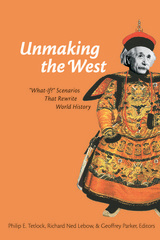 Unmaking the West: "What-If?" Scenarios That Rewrite World History
Philip E. Tetlock, Richard Ned Lebow, and Geoffrey Parker, editors
University of Michigan Press, 2006 What if the Persians had won at Salamis? What if Christ had not been crucified? What if the Chinese had harnessed steam power before the West? Disparaged by some as a mere parlor game, counterfactual history is seen by others as an indispensable historical tool. Taking as their point of inquiry the debate over the inevitability of the rise of the West, the eminent scholars in Unmaking the West argue that there is no escaping counterfactual history. Whenever we make claims of cause and effect, we commit ourselves to the assumption that if key links in the causal chain were broken, history would have unfolded otherwise. Likewise, without counterfactual history we all too easily slip into the habit of hindsight bias, forgetting, as soon as we learn what happened, how unpredictable the world looked beforehand, and closing our minds to all the ways the course might have changed. This collection is thus both an exploration of alternative scenarios to world history and an exercise in testing the strengths and weaknesses of counterfactual experiments.
"If ever there was an argument for the usefulness of counterfactual history, this admirable, and admirably focused, collection has convincingly made it."
—Robert Cowley, editor of the What If?TM series
"With chapters ranging from politics to war to religion to economics and to science and technology, this is the most thematically wide-ranging collection on counterfactuality. An intelligent, cutting-edge study with important things to say."
—Jonathan C. D. Clark, Department of History, University of Kansas
"This volume is likely to become a standard reference in the literature on historical methodology, and could have a dramatic impact on the way future generations of historians approach disciplinary inquiry. . . . By allowing readers to share in the doubts and epiphanies that lead up to the authors' epistemological revelations, the volume allows readers to grasp the rich potential of approaching their own research from a counterfactual perspective."
—Aaron Belkin, Associate Professor of Political Science, University of California, Santa Barbara
Philip E. Tetlock is Mitchell Professor, Haas School of Business, University of California, Berkeley, and author of Expert Political Judgment: How Good Is It? How Can We Know? Richard Ned Lebow is James O. Freedman Presidential Professor of Government at Dartmouth College and author of The Tragic Vision of Politics: Ethics, Interests and Orders, winner of the Alexander L. George Award for the best book in political psychology. Geoffrey Parker is Andreas Dorpalen Professor of History at Ohio State University, a Fellow of the British Academy, and author of The Military Revolution: Military Innovation and the Rise of the West, 1500-1800, winner of two book prizes.
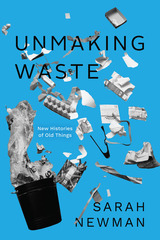 Unmaking Waste: New Histories of Old Things
Sarah Newman
University of Chicago Press, 2023 Explores the concept of waste from fresh historical, cultural, and geographical perspectives.
Garbage is often assumed to be an inevitable part and problem of human existence. But when did people actually come to think of things as “trash”—as becoming worthless over time or through use, as having an end?
Unmaking Waste tackles these questions through a long-term, cross-cultural approach. Drawing on archaeological finds, historical documents, and ethnographic observations to examine Europe, the United States, and Central America from prehistory to the present, Sarah Newman traces how different ideas about waste took shape in different times and places. Newman examines what people consider to be “waste” and how they interact with it, as well as what happens when different perceptions of trash come into conflict. Conceptions of waste have shaped forms of reuse and renewal in ancient Mesoamerica, early modern ideas of civility and forced religious conversion in New Spain, and even the modern discipline of archaeology. Newman argues that centuries of assumptions imposed on other places, times, and peoples need to be rethought. This book is not only a broad reconsideration of waste; it is also a call for new forms of archaeology that do not take garbage for granted. Unmaking Waste reveals that waste is not—and never has been—an obvious or universal concept.
 Unmanaged Landscapes: Voices For Untamed Nature
Edited by Bill Willers
Island Press, 1999 The idea that humans can effectively "manage" nature -- that we can successfully manipulate and control our environment to meet our needs and satisfy our desires -- is almost universally accepted in today's society. While we may be aware that nearly all significant environmental problems are caused by human actions, we remain convinced that the key to solving these problems is "better management." In Unmanaged Landscapes, editor Bill Willers brings together an insightful and thought-provoking selection of writings that challenge that assumption. Written between the mid-nineteenth century and the late 1990s, the pieces range from two paragraphs written in response to an exam question to tightly reasoned philosophical arguments. They offer the thoughts, stories, and analysis of scientists, journalists, philosophers, historians, educators, and others who have considered the effects and implications of "resource management," and have found themselves in favor of keeping some landscapes free from human interference. The collection is divided into three sections: one that focuses on biology and ecology, one that examines the idea of wildness from the standpoint of human society and its economic concerns, and a third that considers philosophical and spiritual aspects of wildness. Featured are works from leading environmental thinkers including Rachel Carlson, George Wuerthner, Joanna Macy, Paul Shepard, David Orr, John Burroughs, David Ehrenfeld, Arne Naess, Bill McKibben, Donald Worster, Carolyn Merchant, Rick Bass, and many others. As Willers explains in his introduction, "If wildness and wild creatures are to survive on Earth, so then must unmanaged landscapes, for they are the fountainheads of the wildness that Henry Thoreau taught is the preservation of the world. They are the blank spots on the map longed for by Aldo Leopold." Unmanaged Landscapes presents a compelling argument for protecting and restoring that wildness.
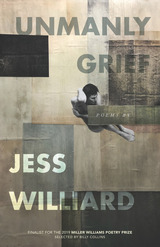 Unmanly Grief: Poems
Jess Williard
University of Arkansas Press, 2019 Finalist, 2019 Miller Williams Poetry Prize “Poems that lead us to striking insights and strange destinations.”
—Billy Collins The men who recur as characters throughout Jess Williard’s Unmanly Grief perform their masculinity in a variety of ways: boxing, theater, brotherhood, labor, and familial and romantic love. Marked by a sharp nostalgia, Williard’s poems move from Wisconsin to New York City and back, tracing the geographic movement of the speaker and his family: a teenage sister who disappears and returns, changed irrevocably; an older brother dismantled in adulthood; an ever-sacrificing father. Woven through the musculature of this varied and exciting collection, music appears as readily in dexterous formal verse as in lean, scrappy storytelling. What results is a crooning celebration of struggle and tenderness in this world, “where to be small and furious is enough.” Finalist, 2020 Milt Kessler Poetry Book Award from the Binghamton Center for Writers
 Unmanning: How Humans, Machines and Media Perform Drone Warfare
Katherine Fehr Chandler
Rutgers University Press, 2020 Unmanning studies the conditions that create unmanned platforms in the United States through a genealogy of experimental, pilotless planes flown between 1936 and 1992. Characteristics often attributed to the drone—including machine-like control, enmity and remoteness—are achieved by displacements between humans and machines that shape a mediated theater of war. Rather than primarily treating the drone as a result of the war on terror, this book examines contemporary targeted killing through a series of failed experiments to develop unmanned flight in the twentieth century. The human, machine and media parts of drone aircraft are organized to make an ostensibly not human framework for war that disavows its political underpinnings as technological advance. These experiments are tied to histories of global control, cybernetics, racism and colonialism. Drone crashes and failures call attention to the significance of human action in making technopolitics that comes to be opposed to “man” and the paradoxes at their basis.
Unmapping the City: Perspectives of Flatness
Edited by Alfredo Cramerotti
Intellect Books, 2010 Unmapping the City, the first title in the new Intellect series Critical Photography, features photographs shot between 2004 and 2008 in different cities around the world. The images are linked by their shared attempts to define a two-dimensional approach to a three-dimensional built reality, and to address spatial representation, ritual, and urbanity through art. In representing the cityscape through a flat texture of lines and bold colors, the reader is drawn into a conversation about the interplay between reality and its representation. This volume significantly challenges and expands the critical discourse on photography and text and will be of interest to artists, curators, photographers, architects, and critical theorists.
 Unmarried Couples with Children
Paula England
Russell Sage Foundation, 2007 Today, a third of American children are born outside of marriage, up from one child in twenty in the 1950s, and rates are even higher among low-income Americans. Many herald this trend as one of the most troubling of our time. But the decline in marriage does not necessarily signal the demise of the two parent family—over 80 percent of unmarried couples are still romantically involved when their child is born and nearly half are living together. Most claim they plan to marry eventually. Yet half have broken up by their child's third birthday. What keeps some couples together and what tears others apart? After a breakup, how do fathers so often disappear from their children's lives? An intimate portrait of the challenges of partnering and parenting in these families, Unmarried Couples with Children presents a variety of unique findings. Most of the pregnancies were not explicitly planned, but some couples feel having a child is the natural course of a serious relationship. Many of the parents are living with their child plus the mother's child from a previous relationship. When the father also has children from a previous relationship, his visits to see them at their mother's house often cause his current partner to be jealous. Breakups are more often driven by sexual infidelity or conflict than economic problems. After couples break up, many fathers complain they are shut out, especially when the mother has a new partner. For their part, mothers claim to limit dads' access to their children because of their involvement with crime, drugs, or other dangers. For couples living together with their child several years after the birth, marriage remains an aspiration, but something couples are resolutely unwilling to enter without the financial stability they see as a sine qua non of marriage. They also hold marriage to a high relational standard, and not enough emotional attention from their partners is women's number one complaint. Unmarried Couples with Children is a landmark study of the family lives of nearly fifty American children born outside of a marital union at the dawn of the twenty-first century. Based on personal narratives gathered from both mothers and fathers over the first four years of their children's lives, and told partly in the couples' own words, the story begins before the child is conceived, takes the reader through the tumultuous months of pregnancy to the moment of birth, and on through the child's fourth birthday. It captures in rich detail the complex relationship dynamics and powerful social forces that derail the plans of so many unmarried parents. The volume injects some much-needed reality into the national discussion about family values, and reveals that the issues are more complex than our political discourse suggests.
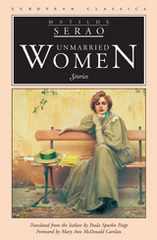 Unmarried Women: Stories
Matilde Serao
Northwestern University Press, 2007 Matilde Serao is widely regarded as the most successful Italian woman journalist of the nineteenth century as well as being an important writer of fiction. A great observer of life, Serao focused her writing directly on the most pressing problems of a newly unified Italy, urban poverty, and the North/South divide. Historian and critic Benedetto Croce said of her that she had an "imagination that is limpid and alive"; Nobel Laureate Giosuè Carducci called her the greatest woman writer in Italy; and Gabriele D'Annunzio dedicated a novel to her. She was apparently on the short list for the Nobel Prize in 1926, which ultimately went to the Sardinian writer Grazia Deledda.
This collection, the first to make Serao’s short stories available in English translation, reflects this naturalistic writer’s interest in the everyday drama of the lives of women in the Italy of her day. In Serao’s spare and simple prose, the young women of turn-of-the-century Naples come to life, negotiating the details of school and work, church and marriage, in a world circumscribed by fathers and chaperones, fiancés and bosses. Infused with the writer’s deep sense of humanity, their quietly involving stories—at once so poetic and so ordinary—attest to the transformative power of literature, and to the promise that even the most humble life holds.
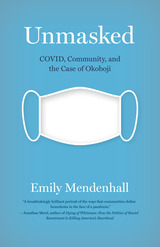 Unmasked: COVID, Community, and the Case of Okoboji
Emily Mendenhall
Vanderbilt University Press, 2022 Unmasked is the story of what happened in Okoboji, a small Iowan tourist town, when a collective turn from the coronavirus to the economy occurred in the COVID summer of 2020. State political failures, local negotiations among political and public health leaders, and community (dis)belief about the virus resulted in Okoboji being declared a hotspot just before the Independence Day weekend, when an influx of half a million people visit the town.
The story is both personal and political. Author Emily Mendenhall, an anthropologist at Georgetown University, grew up in Okoboji, and her family still lives there. As the events unfolded, Mendenhall was in Okoboji, where she spoke formally with over 100 people and observed a community that rejected public health guidance, revealing deep-seated mistrust in outsiders and strong commitments to local thinking. Unmasked is a fascinating and heartbreaking account of where people put their trust, and how isolationist popular beliefs can be in America's small communities.
This book is the recipient of the 2022 Norman L. and Roselea J. Goldberg Prize from Vanderbilt University Press for the best book in the area of art or medicine.
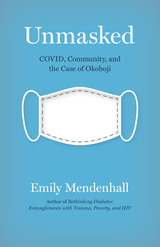 Unmasked: COVID, Community, and the Case of Okoboji
Emily Mendenhall
Vanderbilt University Press, 2022 Unmasked is the story of what happened in Okoboji, a small Iowan tourist town, when a collective turn from the coronavirus to the economy occurred in the COVID summer of 2020. State political failures, local negotiations among political and public health leaders, and community (dis)belief about the virus resulted in Okoboji being declared a hotspot just before the Independence Day weekend, when an influx of half a million people visit the town.
The story is both personal and political. Author Emily Mendenhall, an anthropologist at Georgetown University, grew up in Okoboji, and her family still lives there. As the events unfolded, Mendenhall was in Okoboji, where she spoke formally with over 100 people and observed a community that rejected public health guidance, revealing deep-seated mistrust in outsiders and strong commitments to local thinking. Unmasked is a fascinating and heartbreaking account of where people put their trust, and how isolationist popular beliefs can be in America's small communities.
This book is the recipient of the 2022 Norman L. and Roselea J. Goldberg Prize from Vanderbilt University Press for the best book in the area of art or medicine.
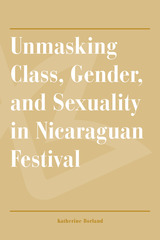 Unmasking Class, Gender, and Sexuality in Nicaraguan Festival
Katherine Borland
University of Arizona Press, 2006 Masaya, a provincial capital of Nicaragua, cultivates an aggressively traditional identity that contrasts with Managua’s urban modernity. In 2001 the city was officially designated Capital of Nicaraguan Folklore, yet residents have engaged in a vibrant folk revival since at least the 1960s. This book documents the creative innovations of Masaya’s performing artists.
The first extended study in English of Nicaraguan festival arts, Unmasking Class, Gender, and Sexuality in Nicaraguan Festival is an ethnographically and historically grounded inquiry into three festival enactments during the Somoza, Sandinista, and Neoliberal periods: the carnivalesque torovenado masquerades, the transvestite Negras marimba dances, and the wagon pilgrimage to Popoyuapa. Through a series of interlinked essays, Katherine Borland shows that these enactments constitute a people’s theater, articulating a range of perspectives on the homegrown and the global; on class, race, and ethnicity; on gender and sexuality; and on religious sensibilities.
Borland’s book is a case study of how the oppositional power of popular culture resides in the process of cultural negotiation itself as communities deploy cherished traditions to assert their difference from the nation and the world. It addresses both the gendered dimensions of a particular festival masquerade and the ways in which sexuality is managed in traditional festival transvestism. It demonstrates how performativity and theatricality interact to negotiate certain crucial realities in a festival complex. By showing how one locale negotiates, incorporates, and resists globally circulating ideas, identities, and material objects, it makes a major contribution to studies of ritual and festival in Latin America.
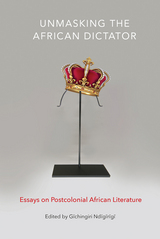 Unmasking the African Dictator: Essays on Postcolonial African Literature
Gichingiri Ndigirigi
University of Tennessee Press, 2014 In Africa, the development of “dictatorship fiction” as a vehicle for depicting the authoritarian state arose more slowly than in other parts of the world. The dictator novel emerged earlier in Latin America, as the region’s anticolonial disengagement preceded that of Africa. Thus, the Latin American variant of this literary genre has been extensively studied, but until now there has been no comparable exploration of the fictional and dramatic representations of tyrannical regimes in Africa. In Unmasking the African Dictator, Gĩchingiri Ndĩgĩrĩgĩ redresses that imbalance with a collection of essays that fully examine the figure of the “Big Man” in African arts.
This volume features twelve articles from both established and emerging scholars who undertake representative readings of the African despot in fiction, drama, films, and music. Arranged chronologically, these essays cover postcolonial realities in a wide range of countries: Mali, Cote d’Ivoire, Senegal, the Congo, Nigeria, the Central African Republic, Somalia, Kenya, and Uganda. Included here are a variety of voices that illuminate the different aspects of dictator fiction in Africa and in the process enrich our understanding of the continent’s literature, politics, and culture.
This work features a foreword by formerly exiled Kenyan novelist, poet, and critic Ngũgĩ wa Thiong’o. Ndĩgĩrĩgĩ’s own extended introduction reviews the overarching themes found in the collection and summarizes each of the artistic works being examined while placing the individual essays in context. A pioneering study, Unmasking the African Dictator examines the works of several major authors of dictator fictions like Achebe, Ngugi, Farah, and Tamsi, among others. It is an ideal resource for both undergraduate and graduate courses on African literature, culture, and politics.
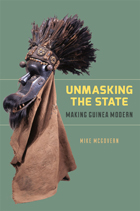 Unmasking the State: Making Guinea Modern
Mike McGovern
University of Chicago Press, 2012 When the Republic of Guinea gained independence in 1958, one of the first policies of the new state was a village-to-village eradication of masks and other ritual objects it deemed “fetishes.” The Demystification Program, as it was called, was so urgent it even preceded the building of a national road system. In Unmasking the State, Mike McGovern attempts to understand why this program was so important to the emerging state and examines the complex role it had in creating a unified national identity. In doing so, he tells a dramatic story of cat and mouse where minority groups cling desperately to their important— and outlawed—customs. Primarily focused on the communities in the country’s southeastern rainforest region—people known as Forestiers—the Demystification Program operated via a paradox. At the same time it banned rituals from Forestiers’ day-to-day lives, it appropriated them into a state-sponsored program of folklorization. McGovern points to an important purpose for this: by objectifying this polytheistic group’s rituals, the state created a viable counterexample against which the Muslim majority could define proper modernity. Describing the intertwined relationship between national and local identity making, McGovern showcases the coercive power and the unintended consequences involved when states attempt to engineer culture.
The Unmasterable Past: History, Holocaust, and German National Identity, With a New Preface
Charles S. Maier
Harvard University Press, 1997 Bringing his book up to date with reflections since its first publication a decade ago, Charles S. Maier writes that the historians’ controversy gave Germany a chance to air the issues immediately before unification and, in effect, the controversy substituted for the constitutional debate that a united Germany never got around to holding. The premises of national community, whether formulated in terms of legal culture, inherited collective responsibilities, or patriotic habits of the heart, had already been subjects for vigorous discussion.
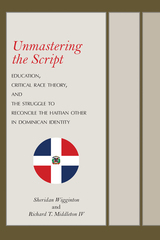 Unmastering the Script: Education, Critical Race Theory, and the Struggle to Reconcile the Haitian Other in Dominican Identity
Sheridan Wigginton and Richard T. Middleton IV
University of Alabama Press, 2019 Analyzes textbooks in the Dominican Republic for evidence of reproducing Haitian Otherness
Unmastering the Script: Education, Critical Race Theory, and the Struggle to Reconcile the Haitian Other in Dominican Identity examines how school curriculum–based representations of Dominican identity navigate black racial identity, its relatedness to Haiti, and the culturally entrenched pejorative image of the Haitian Other in Dominican society. Wigginton and Middleton analyze how social science textbooks and historical biographies intended for young Dominicans reflect an increasing shift toward a clear and public inclusion of blackness in Dominican identity that serves to renegotiate the country’s long-standing antiblack racial master script.
The authors argue that although many of the attempts at this inclusion reflect a lessening of “black denial,” when considered as a whole, the materials often struggle to find a consistent and coherent narrative for the place of blackness within Dominican identity, particularly regarding the ways in which blackness continues to be meaningfully related to the otherness of Haitian racial identity. Unmastering the Script approaches the text materials as an example of “reconstructing” and “unburying” an African past, supporting the uneven, slow, and highly context-specific nature of the process.
This work engages with multiple disciplines including history, anthropology, education, and race studies, building on a new wave of Dominican scholarship that considers how contemporary perspectives of Dominican identity both accept the existence of an African past and seek to properly weigh its importance. The use of critical race theory as the framework facilitates unfolding the past political and legal agendas of governing elites in the Dominican Republic and also helps to unlock the nuance of an increasingly black-inclusive Dominican identity. In addition, this framework allows the unveiling of some of the socially damaging effects the Haitian Other master script can have on children, particularly those of Haitian ancestry, in the Dominican Republic.
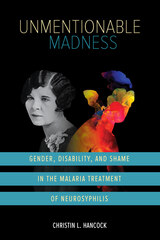 Unmentionable Madness: Gender, Disability, and Shame in the Malaria Treatment of Neurosyphilis
Christin L. Hancock
University of Illinois Press, 2025 In 1930, neurosyphilis struck an unsuspecting Mabel Smith. Doctors at the Central State Hospital for the Insane in Indianapolis turned to malaria therapy--a radical treatment that relied on the belief that infection with malaria might save Smith’s life by attacking the bacterium that causes syphilis. Christin L. Hancock looks through the lens of feminist disability to examine the popular but ethically suspect treatment and its consequences. As Hancock shows, the treatment’s purported success rate relied on the disabled minds and bodies of people incarcerated in mental hospitals. The backgrounds and identities of these patients reflected and perpetuated attitudes around poverty, gender, race, and disability while betraying authorities’ desire to protect the public from women and men perceived as abnormal, sexually tainted, and unworthy of community life. Paying special attention to the patients’ voices and experiences, Unmentionable Madness offers a disability history that confronts the ethics of experimentation.
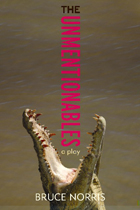 The Unmentionables: A Play
Bruce Norris
Northwestern University Press, 2009 Set in western equitorial Africa on the estate of a wealthy American businessman, The Unmentionables opens with a pugnacious monologue warning the audience to get out now, while they still have a chance to do something really fun, like watch cable television. For those who choose to stay despite the allure of TV, the play follows the intersecting lives of members of the local population with the various Americans who have come to "do good in the world": a young Christian missionary who brings both food and the New Testament to the local children (and whose predecessor met with a grisly fate); a disenchanted Hollywood actress in search of meaning but finding only brutality; and the aging businessman and his wife, a woman simply desperate for conversation. Over the course of one long night their humanitarian notions of themselves are called into question as they come up against the realities of money, politics, and power. As the events escalate from calm to crisis with shocking speed, the worth of one American life is measured against the worth of their so-called American values, as they become the agents of violence against one sixteen-year-old African boy.
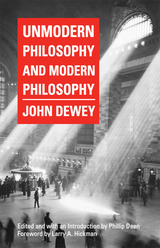 Unmodern Philosophy and Modern Philosophy
John Dewey, Edited by Phillip Deen, Foreword by Larry A. Hickman
Southern Illinois University Press, 2012 800x600Normal0falsefalsefalseEN-USX-NONEX-NONEMicrosoftInternetExplorer4 In 1947 America’s premier philosopher, educator, and public intellectual John Dewey purportedly lost his last manuscript on modern philosophy in the back of a taxicab. Now, sixty-five years later, Dewey’s fresh and unpretentious take on the history and theory of knowledge is finally available. Editor Phillip Deen has taken on the task of editing Dewey’s unfinished work, carefully compiling the fragments and multiple drafts of each chapter that he discovered in the folders of the Dewey Papers at the Special Collections Research Center at Southern Illinois University Carbondale. He has used Dewey’s last known outline for the manuscript, aiming to create a finished product that faithfully represents Dewey’s original intent. An introduction and editor’s notes by Deen and a foreword by Larry A. Hickman, director of the Center for Dewey Studies, frame this previously lost work.
In Unmodern Philosophy and Modern Philosophy, Dewey argues that modern philosophy is anything but; instead, it retains the baggage of outdated and misguided philosophical traditions and dualisms carried forward from Greek and medieval traditions. Drawing on cultural anthropology, Dewey moves past the philosophical themes of the past, instead proposing a functional model of humanity as emotional, inquiring, purposive organisms embedded in a natural and cultural environment.
Dewey begins by tracing the problematic history of philosophy, demonstrating how, from the time of the Greeks to the Empiricists and Rationalists, the subject has been mired in the search for immutable absolutes outside human experience and has relied on dualisms between mind and body, theory and practice, and the material and the ideal, ultimately dividing humanity from nature. The result, he posits, is the epistemological problem of how it is possible to have knowledge at all. In the second half of the volume, Dewey roots philosophy in the conflicting beliefs and cultural tensions of the human condition, maintaining that these issues are much more pertinent to philosophy and knowledge than the sharp dichotomies of the past and abstract questions of the body and mind. Ultimately, Dewey argues that the mind is not separate from the world, criticizes the denigration of practice in the name of theory, addresses the dualism between matter and ideals, and questions why the human and the natural were ever separated in philosophy. The result is a deeper understanding of the relationship among the scientific, the moral, and the aesthetic.
More than just historically significant in its rediscovery, Unmodern Philosophy and Modern Philosophy provides an intriguing critique of the history of modern thought and a positive account of John Dewey’s naturalized theory of knowing. This volume marks a significant contribution to the history of American thought and finally resolves one of the mysteries of pragmatic philosophy.
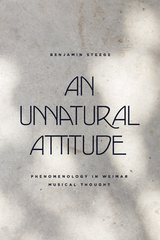 An Unnatural Attitude: Phenomenology in Weimar Musical Thought
Benjamin Steege
University of Chicago Press, 2021 An Unnatural Attitude traces a style of musical thought that coalesced in the intellectual milieu of the Weimar Republic—a phenomenological style that sought to renew contact with music as a worldly circumstance. Deeply critical of the influence of naturalism in aesthetics and ethics, proponents of this new style argued for the description of music as something accessible neither through introspection nor through experimental research, but rather in an attitude of outward, open orientation toward the world. With this approach, music acquires meaning in particular when the act of listening is understood to be shared with others.
Benjamin Steege interprets this discourse as the response of a young, post–World War I generation amid a virtually uninterrupted experience of war, actual or imminent—a cohort for whom disenchantment with scientific achievement was to be answered by reasserting the value of imaginative thought. Steege draws on a wide range of published and unpublished texts from music theory, pedagogy, criticism, and philosophy of music, some of which appear for the first time in English translation in the book’s appendixes. An Unnatural Attitude considers the question: What are we thinking about when we think about music in non-naturalistic terms?
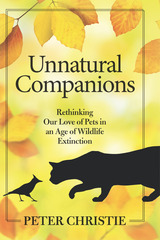 Unnatural Companions: Rethinking Our Love of Pets in an Age of Wildlife Extinction
Peter Christie
Island Press, 2019 "Highly compelling...page-turning read" — TNC's Cool Green Science
We love our pets. Dogs, cats, birds, reptiles, and other species have become an essential part of more families than ever before—in North America today, pets outnumber people. Pet owners are drawn to their animal companions through an innate desire to connect with other species. But there is a dark side to our domestic connection with animal life: the pet industry is contributing to a global conservation crisis for wildlife—often without the knowledge of pet owners.
In Unnatural Companions, journalist Peter Christie issues a call to action for pet owners. If we hope to reverse the alarming trend of wildlife decline, pet owners must acknowledge the pets-versus-conservation dilemma and concede that our well-fed and sheltered cats too often prey on small backyard wildlife and seemingly harmless reptiles released into the wild might be the next destructive invasive species. We want our pets to eat nutritionally healthy food, but how does the designer food we feed them impact the environment?
Christie's book is a cautionary tale to responsible pet owners about why we must change the ways we love and care for our pets. It concludes with the positive message that the small changes we make at home can foster better practices within the pet industry that will ultimately benefit our pets’ wild brethren.
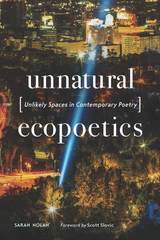 Unnatural Ecopoetics: Unlikely Spaces in Contemporary Poetry
Sarah Nolan
University of Nevada Press, 2017 What constitutes an environment in American literature is an issue that has undergone much debate across environmental humanities in the last decade. In the field, some have argued that environments are markedly natural or wild sites while others contend literary spaces can be both wild and urban, or even cultural. Yet, few of the works produced to date have addressed the pronounced influence the author of a text has on a literary environment. Despite exciting work on materiality and culture in conceptions of environments, critics have not yet fully examined the contributions of poetry’s language, form, and self-awareness in rethinking what constitutes an environment.
By approaching environments in a new way, Nolan closes this gap and recognizes how contemporary poets employ self-reflexive commentary and formal experimentation in order to create new natural/cultural environments on the page. She proposes a radical new direction for ecopoetics and deploys it in relation to four major American poets. Working from literal to textual spaces through the contemporary poetry of A.R. Ammons’s Garbage, Lyn Hejinian’s My Life, Susan Howe’s The Midnight, and Kenneth Goldsmith’s Seven American Deaths and Disasters, the book presents applications of unnatural ecopoetics in poetic environments, ones that do not engage with traditional ideas of nature and would otherwise remain outside the scope of ecocritical and ecopoetic studies.
Nolan proposes a new practical approach for reading poetic language. Ecocriticism is a very fluid and evolving discipline, and Nolan’s pioneering new book pushes the boundaries of second-wave ecopoetics—the fundamental issue being what is nature/natural, and how does poetic language, particularly self-conscious contemporary poetic agency, contribute to and complicate that question.
 Unnatural Formations, Volume 69
Michael Moon
Duke University Press “Nothing typifies the American sense of identity more,” Mark Seltzer writes at the beginning of his 1992 book Bodies and Machines, “than the love of nature (nature’s nation) except perhaps the love of technology (made in America).” The term “nature,” along with a few others—“culture,” “technology,” “nation”—has been of central importance in American literary and cultural studies throughout the past century. The essays in his special issue of American Literature explore in rich detail some of the roles of the “unnatural” in the making of American literature and culture. Several of the essays focus on literary works—both celebrated and forgotten ones—from the turn of the century, when social Darwinism, eugenics, and other forms of the new “scientific” social thinking were being used to exclude large segments of the population from the realm of the “natural” or the “healthy.” Beginning with the treatment of the figure of the spinster in the fiction of Harriet Beecher Stowe, these essays move in provocative and refreshing ways through their reconsiderations of the “unnatural formations” to be found in the work of writers ranging from pioneering African American author Pauline Hopkins to Henry James, Florence Converse, Willa Cather, and Djuna Barnes. Readers interested in sampling the best current scholarship on the effects on American cultural and social history of different ways of understanding gender, sexuality, and race will find this special issue of American Literature a valuable and stimulating resource.
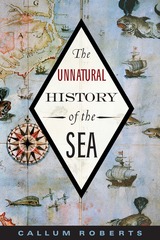 The Unnatural History of the Sea
Callum Roberts
Island Press, 2007 Humanity can make short work of the oceans’ creatures. In 1741, hungry explorers discovered herds of Steller’s sea cow in the Bering Strait, and in less than thirty years, the amiable beast had been harpooned into extinction. It’s a classic story, but a key fact is often omitted. Bering Island was the last redoubt of a species that had been decimated by hunting and habitat loss years before the explorers set sail.
As Callum M. Roberts reveals in The Unnatural History of the Sea, the oceans’ bounty didn’t disappear overnight. While today’s fishing industry is ruthlessly efficient, intense exploitation began not in the modern era, or even with the dawn of industrialization, but in the eleventh century in medieval Europe. Roberts explores this long and colorful history of commercial fishing, taking readers around the world and through the centuries to witness the transformation of the seas.
Drawing on firsthand accounts of early explorers, pirates, merchants, fishers, and travelers, the book recreates the oceans of the past: waters teeming with whales, sea lions, sea otters, turtles, and giant fish. The abundance of marine life described by fifteenth century seafarers is almost unimaginable today, but Roberts both brings it alive and artfully traces its depletion. Collapsing fisheries, he shows, are simply the latest chapter in a long history of unfettered commercialization of the seas.
The story does not end with an empty ocean. Instead, Roberts describes how we might restore the splendor and prosperity of the seas through smarter management of our resources and some simple restraint. From the coasts of Florida to New Zealand, marine reserves have fostered spectacular recovery of plants and animals to levels not seen in a century. They prove that history need not repeat itself: we can leave the oceans richer than we found them.
 Unnatural Landscapes: Tracking Invasive Species
Ceiridwen Terrill; Foreword by Gary Paul Nabhan
University of Arizona Press, 2007 Louisiana crawfish, cheatgrass, Russian thistle, Hottentot figs, rats, and sweet fennel. These and dozens of other seemingly benign flora and fauna have become some of the worst culprits in the destruction of ecosystems and native wildlife in the American Southwest and Baja California. Although widely publicized threats—such as pollution, land development, changes in the atmospheric condition, fire, and drought—are frequently credited with posing the greatest danger to indigenous animals and plants, invasive species are quickly becoming a far more insidious peril to the survival of native wildlife. A result of both accident and human intervention, the frequency with which exotic species are being introduced into nonnative environments is increasing at an alarming rate. In Unnatural Landscapes, Ceiridwen Terrill combines lucid science writing with first-person tales of adventure to provide a compelling introduction to invasion ecology and restoration management. Traveling aboard her trusty kyak, The Grebe, Terrill brings readers on a firsthand tour of various “islands” in the Southwest and Mexico—both actual islands and self-contained habitat communities. From the islands of Anaho, Santa Cruz, and Anacapa to Isla Tiburón in the Sea of Cortez, Mexicali irrigation canals, and Pyramid Lake, Terrill takes an in-depth look at the damage that invasive species cause. Drawing on field observations, research, and interviews with scientists, resource managers, and local residents, this book provides readers with the background and knowledge they need to understand and to begin combating what is quickly becoming the most important environmental crisis facing the fragile ecosystems of the Southwest. For more information on invasive species visit the Author's Web site.
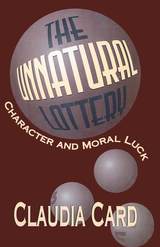 The Unnatural Lottery: Character and Moral Luck
Claudia Card
Temple University Press, 1996 The opportunities to become a good person are not the same for everyone. Modern European ethical theory, especially Kantian ethics, assumes the same virtues are accessible to all who are capable of rational choice. Character development, however, is affected by circumstances, such as those of wealth and socially constructed categories of gender, race, and sexual orientation, which introduce factors beyond the control of individuals. Implications of these influences for morality have, since the work of Williams and Nagel in the seventies, raised questions in philosophy about the concept of moral luck. In The Unnatural Lottery, Claudia Card examines how luck enters into moral character and considers how some of those who are oppressed can develop responsibility. Luck is often best appreciated by those who have known relatively bad luck and have been unable to escape steady comparison of their lot with those of others. The author takes as her paradigms the luck of middle and lower classes of women who face violence and exploitation, of lesbians who face continuing pressure to hide or self-destruct, of culturally Christian whites who have ethnic privilege, and of adult survivors of child abuse. How have such people been affected by luck in who they are and can become, the good lives available to them, the evils they may be liable to embody? Other philosophers have explored the luck of those who begin from privileged positions and then suffer reversals of fortune. Claudia Card focuses on the more common cases of those who begin from socially disadvantaged positions, and she considers some who find their good luck troubling when its source is the unnatural lottery of social injustice.
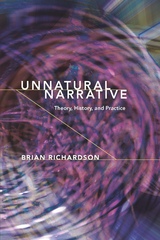 Unnatural Narrative: Theory, History, and Practice
Brian Richardson
Ohio State University Press, 2015 Unnatural Narrative: Theory, History, and Practice provides the first extended account of the concepts and history of unnatural narrative. In this book, Brian Richardson, founder of unnatural narrative studies, offers a theoretical model that can encompass antirealist and antimimetic works from Aristophanes to postmodernism. Unnatural Narrative begins with a sustained critique of contemporary narratology, diagnosing its mimetic bias and establishing the need for a more comprehensive account. This new approach results in original theoretical insights into the basic elements of story, such as beginnings, sequencing, temporality, endings, and narrative itself.
Applying these theoretical insights, Richardson also provides a compelling alternative view of the history of narrative. He traces a genealogy of unnatural narratives from ancient Greek and Sanskrit works through medieval and renaissance fiction to eighteenth-century and romantic fiction. The study continues through the twentieth century, discussing the unnatural elements of Ulysses and other early twentieth-century texts, and engages with contemporary fiction by offering an alternative account of postmodernism. Unnatural Narrative makes an essential intervention in narrative theory and an important contribution to the history of the novel.
 Unnatural Narratology: Extensions, Revisions, and Challenges
Edited by Jan Alber and Brian Richardson
Ohio State University Press, 2020 Unnatural Narratology: Extensions, Revisions, and Challenges offers a number of developments, refinements, and defenses of key aspects of unnatural narrative studies. The first section applies unnatural narrative theory and analysis to ideologically charged areas such as feminism, postcolonial studies, cultural alterity, and subaltern discourse. The book goes on to engage with and intervene in theoretical debates in several areas of both critical theory and narrative theory, including affect studies, immersion, narration, character theory, frames, and theories of reception and interpretation. Antimimetic perspectives are also extended to additional fields, including autobiography, graphic narratives, drama and film, performance studies, and interactive gamebooks. Written by an international assemblage of distinguished and emerging narrative scholars and theorists, this collection promises to greatly enhance the study of narrative and further advance the frontiers of narrative theory.
The Unnatural Nature of Science
Lewis Wolpert
Harvard University Press, 1993 How is it that nobody—except maybe scientists—sees science for what it is? In this entertaining and provocative book, Lewis Wolpert draws on the entire history of science, from Thales of Miletus to Watson and Crick, from the study of eugenics to the discovery of the double helix. The result is a scientist’s view of the culture of science, authoritative and informed and at the same time mercifully accessible to those who find cohabiting with this culture a puzzling experience.
Science is arguably the defining feature of our age. For anyone who hopes to understand its nature, this lively and thoughtful book provides the perfect starting point.
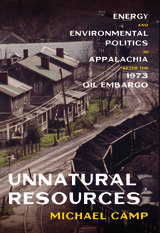 Unnatural Resources: Energy and Environmental Politics in Appalachia after the 1973 Oil Embargo
Michael Camp
University of Pittsburgh Press, 2019
Unnatural Resources explores the intersection of energy production and environmental regulation in Appalachia after the oil embargo of 1973. The years from 1969 to 1973 saw the passage of a number of laws meant to protect the environment from human destruction, and they initially enjoyed broad public popularity. However, the oil embargo, which caused lines and fistfights at gasoline stations, refocused Americans’ attention on economic issues and alerted Americans to the dangers of relying on imported oil. As a drive to increase domestic production of energy gained momentum, it soon appeared that new environmental regulations were inhibiting this initiative. A backlash against environmental regulations helped inaugurate a bipartisan era of market-based thinking in American politics and discredited the idea that the federal government had a constructive role to play in addressing energy issues. This study connects political, labor, and environmental history to contribute to a growing body of literature on the decline of the New Deal and the rise of pro-market thinking in American politics.
Unnatural Selection: A Memoir of Adoption and Wilderness
Andrea Ross
CavanKerry Press, 2021 Adopted at birth, Andrea Ross grew up inhabiting two ecosystems: one was her tangible, adoptive family, the other her birth family, whose mysterious landscape was hidden from her. In this coming-of-age memoir, Ross narrates how in her early twenties, while working as a ranger in Grand Canyon National Park, she embarked on a journey to discover where she came from and, ultimately, who she was. After many missteps and dead ends, Ross uncovered her heartbreaking and inspiring origin story and began navigating the complicated turns of reuniting with her birth parents and their new families. Through backcountry travel in the American West, she also came to understand her place in the world, realizing that her true identity lay not in a choice between adopted or biological parents, but in an expansion of the concept of family.
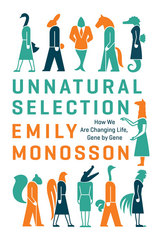 Unnatural Selection: How We Are Changing Life, Gene by Gene
Emily Monosson
Island Press, 2015 Gonorrhea. Bed bugs. Weeds. Salamanders. People. All are evolving, some surprisingly rapidly, in response to our chemical age. In Unnatural Selection, Emily Monosson shows how our drugs, pesticides, and pollution are exerting intense selection pressure on all manner of species. And we humans might not like the result.
Monosson reveals that the very code of life is more fluid than once imagined. When our powerful chemicals put the pressure on to evolve or die, beneficial traits can sweep rapidly through a population. Species with explosive population growth—the bugs, bacteria, and weeds—tend to thrive, while bigger, slower-to-reproduce creatures, like ourselves, are more likely to succumb.
Monosson explores contemporary evolution in all its guises. She examines the species that we are actively trying to beat back, from agricultural pests to life-threatening bacteria, and those that are collateral damage—creatures struggling to adapt to a polluted world. Monosson also presents cutting-edge science on gene expression, showing how environmental stressors are leaving their mark on plants, animals, and possibly humans for generations to come.
Unnatural Selection is eye-opening and more than a little disquieting. But it also suggests how we might lessen our impact: manage pests without creating super bugs; protect individuals from disease without inviting epidemics; and benefit from technology without threatening the health of our children.
Unnatural Selection: The Yanomami, the Kayapo & the Onslaught of Civilisation
Linda Rabben
Pluto Press, 1998 A passionate firsthand account of the Yanomami and Kayapó’s struggle to survive in their increasingly ‘civilised’ world, written by a respected academic who has worked with indigenous groups for both Sting and Amnesty International.
Linda Rabben interviews celebrated leaders such as Paulinho Payakan and Davi Yanomami; looks at the ways that both groups interact with Brazilian society and the wider world, and considers their differing futures.
 The Un-Natural State: Arkansas and the Queer South
Brock Thompson
University of Arkansas Press, 2010 The Un-Natural State is a one-of-a-kind study of gay and lesbian life in Arkansas in the twentieth century, a deft weaving together of Arkansas history, dozens of oral histories, and Brock Thompson's own story. Thompson analyzes the meaning of rural drag shows, including a compelling description of a 1930s seasonal beauty pageant in Wilson, Arkansas, where white men in drag shared the stage with other white men in blackface, a suggestive mingling that went to the core of both racial transgression and sexual disobedience. These small town entertainments put on in churches and schools emerged decades later in gay bars across the state as a lucrative business practice and a larger means of community expression, while in the same period the state's sodomy law was rewritten to condemn sexual acts between those of the same sex in language similar to what was once used to denounce interracial sex. Thompson goes on to describe several lesbian communities established in the Ozark Mountains during the sixties and seventies and offers a substantial account of Eureka Springs's informal status as the "gay capital of the Ozarks." Through this exploration of identity formation, group articulation, political mobilization, and cultural visibility within the context of historical episodes such as the Second World War, the civil rights movement, and the AIDS epidemic, The Un-Natural State contributes not only to our understanding of gay and lesbian history but also to our understanding of the South.
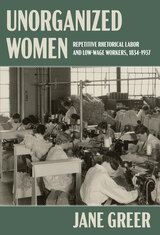 Unorganized Women: Repetitive Rhetorical Labor and Low/No-Wage Workers
Jane Greer
University of Pittsburgh Press, 2023 Across a range of industrial, domestic, and agricultural sites, Greer shows how repetitive discursive performances served as rhetorical tools as women workers sought to rescript power relations in their workplaces and to resist narratives about their laboring lives. The case studies reveal noteworthy patterns in how these women’s words helped to construct the complex web of class relations in which they were enmeshed. Rather than a teleological narrative of economic empowerment over the course of a century, Unorganized Women speaks to the enduring obstacles low- and no-wage women face, their creativity and resilience in the face of adversity, and the challenges that impede the creation of meaningful coalitions. By focusing on repetitive rhetorical labor, this book affords a point of entry for analyzing the discursive productions of a range of women workers and for constructing a richer history of women’s rhetoric in the United States.
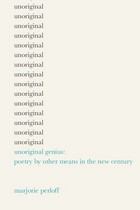 Unoriginal Genius: Poetry by Other Means in the New Century
Marjorie Perloff
University of Chicago Press, 2010 What is the place of individual genius in a global world of hyper-information— a world in which, as Walter Benjamin predicted more than seventy years ago, everyone is potentially an author? For poets in such a climate, "originality" begins to take a back seat to what can be done with other people’s words—framing, citing, recycling, and otherwise mediating available words and sentences, and sometimes entire texts. Marjorie Perloff here explores this intriguing development in contemporary poetry: the embrace of "unoriginal" writing. Paradoxically, she argues, such citational and often constraint-based poetry is more accessible and, in a sense, "personal" than was the hermetic poetry of the 1980s and 90s. Perloff traces this poetics of "unoriginal genius" from its paradigmatic work, Benjamin’s encyclopedic Arcades Project, a book largely made up of citations. She discusses the processes of choice, framing, and reconfiguration in the work of Brazilian Concretism and Oulipo, both movements now understood as precursors of such hybrid citational texts as Charles Bernstein’s opera libretto Shadowtime and Susan Howe’s documentary lyric sequence The Midnight. Perloff also finds that the new syncretism extends to language: for example, to the French-Norwegian Caroline Bergvall writing in English and the Japanese Yoko Tawada, in German. Unoriginal Genius concludes with a discussion of Kenneth Goldsmith’s conceptualist book Traffic—a seemingly "pure’" radio transcript of one holiday weekend’s worth of traffic reports. In these instances and many others, Perloff shows us "poetry by other means" of great ingenuity, wit, and complexity.
Unorthodox Beauty: Russian Modernism and Its New Religious Aesthetic
Martha M. F. Kelly
Northwestern University Press, 2016 Unorthodox Beauty shows how Russian poets of the early twentieth century consciously adapted Russian Orthodox culture in order to create a distinctly religious modernism. Martha M. F. Kelly contends that, beyond mere themes, these writers developed an entire poetics that drew on liturgical tradition. Specifically, Russian Orthodoxy held out the possibility of unifying spirit and matter, as well as a host of other dichotomies—subject and object, empirical and irrational, noumena and phenomena. The artist could produce a work of transformative and regenerative power. Using a range of crossdisciplinary tools, Kelly reads key works by Blok, Kuzmin, Akhmatova, and Pasternak in ways that illustrate how profoundly religious traditions and ideas shaped Russian modernist literature.
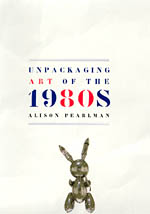 Unpackaging Art of the 1980s
Alison Pearlman
University of Chicago Press, 2003 American art of the 1980s is as misunderstood as it is notorious. Critics of the time feared that market hype and self-promotion threatened the integrity of art. They lashed out at contemporary art, questioning the validity of particular media and methods and dividing the art into opposing camps. While controversies have since subsided, critics still view art of the 1980s as a stylistic battlefield. Alison Pearlman rejects this picture, which is truer of the period's criticism than of its art.
Pearlman reassesses the works and careers of six artists who became critics' biggest targets. In each of three chapters, she pairs two artists the critics viewed as emblematic of a given trend: Julian Schnabel and David Salle in association with Neo-Expressionism; Jean-Michel Basquiat and Keith Haring vis-à-vis Graffiti Art; and Peter Halley and Jeff Koons in relation to Simulationism. Pearlman shows how all these artists shared important but unrecognized influences and approaches: a crucial and overwhelming inheritance of 1960s and 1970s Conceptualism, a Warholian understanding of public identity, and a deliberate and nuanced use of past styles and media. Through in-depth discussions of works, from Haring's body-paintings of Grace Jones to Schnabel's movie Basquiat, Pearlman demonstrates how these artists' interests exemplified a broader, generational shift unrecognized by critics. She sees this shift as starting not in the 1980s but in the mid-1970s, when key developments in artistic style, art-world structures, and consumer culture converged to radically alter the course of American art.
Unpackaging Art of the 1980s offers an innovative approach to one of the most significant yet least understood episodes in twentieth-century art.
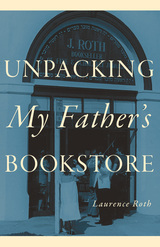 Unpacking My Father's Bookstore
Laurence Roth
Rutgers University Press, 2025 Unpacking My Father’s Bookstore brings to life the history of J. Roth / Bookseller of Fine & Scholarly Judaica, which was a microcosm of the Los Angeles Jewish community from 1966 to 1994 and one of the premier Jewish bookstores in the United States. Blending critical analysis with a personal account of growing up in his father’s bookstore, and connecting both to larger forces that helped shape Jewish and American book retailing in the twentieth-century, Laurence Roth crafts a richly felt narrative about his family’s Jewish experience in America. It is a reminder, too, that while most independent bookstores like J. Roth Bookseller disappear from history, these retailers often had outsized effects on their communities. Breaking with conventional modes of scholarship, Unpacking My Father’s Bookstore tells a unique and troubled story that rarely gets told, one that is both personal and analytical, theoretical but rooted in the everyday.
 Unpacking Tourism
Daniel Bender, Steven Fabian, Jason Ruiz, and Daniel Walkowitz, special issue editors
Duke University Press, 2017 Tourism shapes popular fantasies of adventure, structures urban and natural space, creates knowledge around difference, and demands an array of occupations servicing the insatiable needs of those who travel for leisure. Even as migrants and refugees have become targets of ire from far-right parties, international tourism has grown worldwide. This issue posits a radical approach to the study of tourism, highlighting how tourism as a paradigmatic modern encounter bleeds into diplomacy, militarism, and empire building. Contributors investigate, among other topics, how the United States has used tourism in Latin America as a tool of interventionist foreign policy, how Bethlehem’s Manger Square has become a contested space between Palestinians and the Israeli state, how Spain's economy increasingly relies on northern European tourists, and how the US military's Cold War–era guidebooks attempted to convert soldiers stationed abroad into "ambassadors of goodwill."
Contributors. Ryvka Barnard, Daniel Bender, Julio Capo Jr., Rüstem Ertuğ Altinay, Steven Fabian, Vernadette Vicuña Gonzalez, Max Holleran, Rebecca J. Kinney, Scott Laderman, Katrina Phillips, Mark Rice, Jason Ruiz, Daniel Walkowitz, Kim Warren
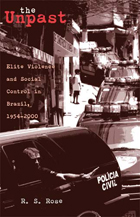 The Unpast: Elite Violence and Social Control in Brazil, 1954–2000
R. S. Rose
Ohio University Press, 2005 Portuguese and Brazilian slave-traders shipped at least four million slaves to Brazil—in contrast to the five hundred thousand slaves that English vessels brought to the Americas. Controlling the vast number of slaves in Brazil became of primary importance. The Unpast: Elite Violence and Social Control in Brazil, 1954–2000 documents the ways in which the brutal methods used on plantations led directly to the phenomenon of Brazilian death squads. The Unpast examines how and why, after the abolition of slavery, elites in Brazil imported new methods of killing, torturing, or disfiguring dissidents and the poor to maintain dominance. Bringing a critical-historical analysis to events following the 1954 suicide of President Getúlio Vargas, R. S. Rose takes the reader along a fifty-year path that helped to shape a nation’s morals. He covers the misunderstood presidency of João Goulart; the overthrow of his government by a U.S.-assisted military; the appalling dictatorship that followed; the efforts to rid the countryside of troublemakers; and the ongoing attempt to cleanse the urban environment of the needy, an endeavor that produced 32,675 victims in just two Brazilian states between 1954 and 2000. The largest and most comprehensive documentation of suspected death-squad victims ever undertaken, The Unpast is an exposé of practices and attitudes toward the poor in Latin America’s largest country.
Unpeopled Eden
Rigoberto González
Four Way Books, 2013 Unpeopled Eden opens in Mictlán, the region of the dead in Aztec mythology, inviting us down into a world where “the men are never coming home” and “rows of ghosts come forth to sing.” Haunted by border crossers and forgotten deportees, lost brothers and sons, González unearths the beautiful and musical amidst the grotesque. These poems are prayer and memorial “for those whose / patron saints are longing and despair.”
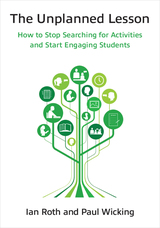 The Unplanned Lesson: How to Stop Searching for Activities and Start Engaging Students
Ian Roth and Paul Wicking
University of Michigan Press, 2023 The complexities of language education demand that teachers have the flexibility to be able to adapt their plans during lessons in order to meet the needs of their students. Yet teachers are trained to meticulously prepare lesson plans and numerous activities to keep their students engaged. This can lead to teachers feeling locked into the plan they spent time preparing. The Unplanned Lesson suggests a new paradigm for how to prepare for and conduct language lessons based on curating what the authors term “structures.” By focusing on structures that are flexible, evolvable, repeatable, and memorable, teachers can reduce the amount of time they spend planning and increase the amount of time students are engaged in deliberate practice. Designed to integrate with any syllabus or textbook, The Unplanned Lesson approach aims to allow teachers to transform their classrooms by giving them more time to focus on supporting their students’ learning.
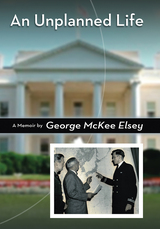 An Unplanned Life: A Memoir
George McKee Elsey
University of Missouri Press, 2005 An Unplanned Life is the scintillating memoir of George Elsey, a small-town kid from western Pennsylvania who, at age twenty-four, was assigned to Franklin Roosevelt’s top-secret intelligence and communications center in the White House. As an officer in the U.S. Naval Reserve, Elsey helped brief the president and his senior associates on war events. He and his map room colleagues acted as the secretariat for Roosevelt’s cabled exchanges with Winston Churchill, Joseph Stalin, and Chiang Kai-shek; filed records of “summit conferences”; and stored in safes plans for future operations. He also traveled with the president in order to code and decode the classified messages that flowed between the presidential train or ship and the White House. Elsey’s duties continued with Harry Truman’s succession to the presidency. He decoded the famous message from Secretary of War Henry Stimson reporting the dropping of the atomic bomb on Hiroshima and carried it to President Truman. In 1947, he shed his Naval Reserve uniform and joined the White House’s civilian staff as assistant to the special counsel to the president. In 1949, he became administrative assistant to the president, and, in 1952, he became a member of the Mutual Security Agency staff. During those years, he grew very close to Harry Truman, and thus, a major portion of An Unplanned Life relates to his experiences then. In the first postwar winter, Elsey was frequently the only staff member who accompanied President Truman on the USS Williamsburg. In September 1946, Elsey submitted a report to Truman on U.S.-Soviet relations, which came to be well known as the “Clifford-Elsey Report.” Providing Truman with notes for some two hundred of his “back-of-the-train” informal talks, Elsey played a part in the best remembered feature of the “Whistle-Stop Campaign” that resulted in “the political upset of the century.” In addition to his years at the White House, Elsey also touches on his post–White House years—his time in private industry, his months with Clark Clifford when Clifford was trying unsuccessfully to extricate America from Vietnam, and his long association with the American Red Cross.
An Unplanned Life is a fascinating look at the life of an extraordinary individual who played an important and unprecedented part in two different presidents’ decisions and affected the course of our nation. Anyone with an interest in history will find this memoir fascinating and invaluable.
Unpopular Culture
Martin Luthe
Amsterdam University Press, 2016 This volume introduces a new concept that boldly breaks through the traditional dichotomy of high and low culture while offering a fresh approach to both: unpopular culture. From the works of David Foster Wallace and Ernest Hemingway to fanfiction and The Simpsons, from natural disasters to 9/11 and beyond, the essays find the unpopular across media and genres, analysing the politics and aesthetics of a side to culture that has been overlooked by previous theories and methods in cultural studies.
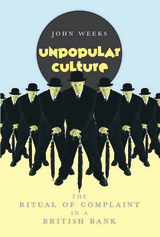 Unpopular Culture: The Ritual of Complaint in a British Bank
John R. Weeks
University of Chicago Press, 2003 When you start a new job, you learn how things are done in the company, and you learn how they are complained about too. Unpopular Culture considers why people complain about their work culture and what impact those complaints have on their organizations. John Weeks based his study on long-term observations of the British Armstrong Bank in the United Kingdom. Not one person at this organization, he found, from the CEO down to the junior clerks, had anything good to say about its corporate culture. And yet, despite all the griping—and despite high-profile efforts at culture change—the way things were done never seemed fundamentally to alter. The organization was restructured, jobs redefined, and processes redesigned, but the complaining remained the same.
As Weeks demonstrates, this is because the everyday standards of behavior that regulate complaints curtail their effectiveness. Embarrass someone by complaining in a way that is too public or too pointed, and you will find your social standing diminished. Complain too loudly or too long, and your coworkers might see you as contrary. On the other hand, complain too little and you may be seen as too stiff or just too strange to be trusted. The rituals of complaint, Weeks shows, have powerful social functions.
Unpopular Essays on Technological Progress
Nicholas Rescher
University of Pittsburgh Press, 1980 Nicholas Rescher examines a number of controversial social issues using the intellectual tools of the philosopher, in an attempt to clarify some of the complexities of modern society, technology, and economics. He elucidates his thoughts on topics such as: whether technological progress leads to greater happiness; environmental problems; endangered species, costly scientific research on the frontiers of knowledge, medical/moral issues on the preservation of life; and crime and justice, among others.
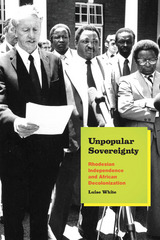 Unpopular Sovereignty: Rhodesian Independence and African Decolonization
Luise White
University of Chicago Press, 2015 In 1965 the white minority government of Rhodesia (after 1980 Zimbabwe) issued a unilateral declaration of independence from Britain, rather than negotiate a transition to majority rule. In doing so, Rhodesia became the exception, if not anathema, to the policies and practices of the end of empire. In Unpopular Sovereignty, Luise White shows that the exception that was Rhodesian independence did not, in fact, make the state that different from new nations elsewhere in Africa: indeed, this history of Rhodesian political practices reveals some of the commonalities of mid-twentieth-century thinking about place and race and how much government should link the two.
White locates Rhodesia’s independence in the era of decolonization in Africa, a time of great intellectual ferment in ideas about race, citizenship, and freedom. She shows that racists and reactionaries were just as concerned with questions of sovereignty and legitimacy as African nationalists were and took special care to design voter qualifications that could preserve their version of legal statecraft. Examining how the Rhodesian state managed its own governance and electoral politics, she casts an oblique and revealing light by which to rethink the narratives of decolonization.
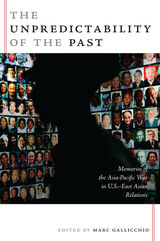 The Unpredictability of the Past: Memories of the Asia-Pacific War in U.S.–East Asian Relations
Marc Gallicchio, ed.
Duke University Press, 2007 In The Unpredictability of the Past, an international group of historians examines how collective memories of the Asia-Pacific War continue to affect relations among China, Japan, and the United States. The contributors are primarily concerned with the history of international relations broadly conceived to encompass not only governments but also nongovernmental groups and organizations that influence the interactions of peoples across the Pacific. Taken together, the essays provide a rich, multifaceted analysis of how the dynamic interplay between past and present is manifest in policymaking, popular culture, public commemorations, and other arenas. The contributors interpret mass media sources, museum displays, monuments, film, and literature, as well as the archival sources traditionally used by historians. They explore how American ideas about Japanese history shaped U.S. occupation policy following Japan’s surrender in 1945, and how memories of the Asia-Pacific War influenced Washington and Tokyo policymakers’ reactions to the postwar rise of Soviet power. They investigate topics from the resurgence of Pearl Harbor images in the U.S. media in the decade before September 11, 2001, to the role of Chinese war museums both within China and in Chinese-Japanese relations, and from the controversy over the Smithsonian Institution’s Enola Gay exhibit to Japanese tourists’ reactions to the USS Arizona memorial at Pearl Harbor. One contributor traces how a narrative commemorating African Americans’ military service during World War II eclipsed the history of their significant early-twentieth-century appreciation of Japan as an ally in the fight against white supremacy. Another looks at the growing recognition and acknowledgment in both the United States and Japan of the Chinese dimension of World War II. By focusing on how memories of the Asia-Pacific War have been contested, imposed, resisted, distorted, and revised, The Unpredictability of the Past demonstrates the crucial role that interpretations of the past play in the present. Contributors. Marc Gallicchio, Waldo Heinrichs, Haruo Iguchi, Xiaohua Ma, Frank Ninkovich, Emily S. Rosenberg, Takuya Sasaki, Yujin Yaguchi, Daqing Yang
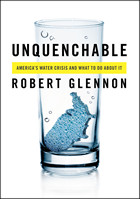 Unquenchable: America's Water Crisis and What To Do About It
Robert Glennon
Island Press, 2010 In the middle of the Mojave Desert, Las Vegas casinos use billions of gallons of water for fountains, pirate lagoons, wave machines, and indoor canals. Meanwhile, the town of Orme, Tennessee, must truck in water from Alabama because it has literally run out.
Robert Glennon captures the irony—and tragedy—of America’s water crisis in a book that is both frightening and wickedly comical. From manufactured snow for tourists in Atlanta to trillions of gallons of water flushed down the toilet each year, Unquenchable reveals the heady extravagances and everyday inefficiencies that are sucking the nation dry.
The looming catastrophe remains hidden as government diverts supplies from one area to another to keep water flowing from the tap. But sooner rather than later, the shell game has to end. And when it does, shortages will threaten not only the environment, but every aspect of American life: we face shuttered power plants and jobless workers, decimated fi sheries and contaminated drinking water.
We can’t engineer our way out of the problem, either with traditional fixes or zany schemes to tow icebergs from Alaska. In fact, new demands for water, particularly the enormous supply needed for ethanol and energy production, will only worsen the crisis. America must make hard choices—and Glennon’s answers are fittingly provocative. He proposes market-based solutions that value water as both a commodity and a fundamental human right.
One truth runs throughout Unquenchable: only when we recognize water’s worth will we begin to conserve it.
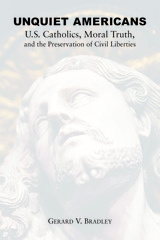 Unquiet Americans: U.S. Catholics, Moral Truth, and the Preservation of Civil Liberties
Gerard V. Bradley
St. Augustine's Press, 2013 Before the Second Vatican Council, America’s Catholics operated largely as a coherent voting bloc, usually in connection with the Democratic Party. Their episcopal leaders generally spoke for Catholics in political matters; at least, where America’s bishops asserted themselves in public affairs there was little audible dissent from the faithful. More than occasionally, the immigrant Church’s eagerness to demonstrate its patriotic bona fides furthered its tendency to speak with one voice about national matters, and in line with the broader societal consensus. And, notwithstanding the considerable conflict which Catholics encountered, and generated, in American political life, there was before the Council broad agreement in American culture about the centrality of Biblical morality to the success of Americans’ experiment with republican government. In other words: before the Council, American Catholics’ relationship to the political common good was mediated, somewhat uncritical, and insulated from conflict (both within and without the Church) over such fundamental matters as protection of innocent life, marriage and family life, and (to a lesser extent) religious liberty. This has all changed since the mid-1960s. For the first time in the Church’s pilgrimage on these shores, controversial questions about the basic moral requirements of the political common good are front and center for America’s Catholics. These questions require Catholics to confront matters which heretofore they either took for granted, read off from the background culture, or which they left to the bishops to handle. But the Council Fathers rightly recognized that Jesus calls upon a formed and informed laity to act as leaven in the public realm, to bring Gospel values to the temporal sphere. In this book of essays touching upon Catholic social doctrine, the truth about human equality and political liberty, and religious faith as it bears upon public life and the public engagement of lay Catholics, Gerard Bradley supplies indispensable aid to those seeking to answer Jesus’ call.
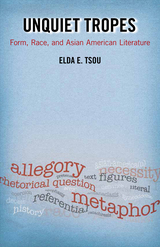 Unquiet Tropes: Form, Race, and Asian American Literature
Elda E Tsou
Temple University Press, 2015 Until quite recently, Asian American literary criticism had little to do with form. Instead, the tendency was to bind the literary tradition to identity formation. For Elda Tsou, however, the distinctions of ethnic writing extend beyond such facile referential practices to incorporate form and aesthetics.
In Unquiet Tropes, Tsou reconceptualizes the literature as a set of highly particular classical rhetorical tropes including antanaclasis, rhetorical question, apophasis, catachresis, and allegory. Looking at five canonical works—Aiiieeeee!, No-No Boy, China Men, Blu’s Hanging, and Native Speaker—Tsou shows how these texts use figurative means to confront the problem of race. She also explores how traces of Asian American history live on through these figures.
Each case study in Unquiet Tropes considers a different scenario—defiance, coercion, necessity, error, and deceit—to show how literary representation from the 1950s through 1997 has responded to a specific political condition.
 Unraveled: Labor Strife and Carolina Folk during the Marion Textile Strikes of 1929
Travis Sutton Byrd
University of Tennessee Press, 2015 It was called “the summer of dynamite.” In 1929, on the eve of the Great Depression, the southern textile belt—from the rayon mills of upper East Tennessee to the bleacheries and weave rooms of the Carolina piedmont—exploded in a full-on civil war marked by political intrigue, kidnapping, attempted and outright murder, rioting, and the threat of armed insurrection against the state. Communists agitated in Gastonia, North Carolina; the American Federation of Labor led organizing efforts in nearby Marion; and the regional elite was forced to choose sides as its forces collided with those of the millworkers and rival unions battling for organizational supremacy.
Drawing on never-before-utilized sources, including minutes of corporate board meetings, union rosters, scrapbooks kept by local residents, courtroom testimony, a wide assortment of news reports, and ballads written by striking workers, Travis Sutton Byrd has woven together a complex and arresting account of the textile strikes that signaled the passage of the great mill-building campaigns of the New South into the modern era. Focusing especially on labor unrest in the town of Marion, while intertwining that story with events elsewhere in the textile belt, Byrd shows in fascinating detail the ways in which the industrial culture of the New South came unraveled during one fateful summer. With fearful memories of turn-of-century Fusion politics—a coalition between the working class and the Republican Party—shaping the response of the region’s Democratic, business-as-usual elite, the outcome was a campaign by the AFL to “Organize the South,” an effort that laid the groundwork for reform under Franklin Roosevelt’s New Deal.
With its novelistic narrative and rich cast of characters—owners and politicians, millhands and reporters, reformers and radicals—Unraveled will seize the attention of anyone interested in the politics of class, culture, and regional transformation
Travis Sutton Byrd is an independent historian and writer who lives in Asheville, North Carolina. A historical consultant for the International Brotherhood of Electrical Workers, he has lectured on union history in the South at various forums and symposiums. The 1991 recipient of the Thomas Wolfe Prize for Short Fiction, he was also the Madison County, North Carolina, site director for the statewide Support Our Schools program.
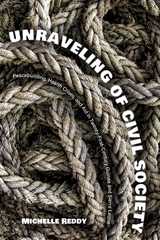 Unraveling of Civil Society: Peacebuilding, Health Crises, and Aid in Twenty-First-Century Guinea and Sierra Leone
Michelle Reddy
Ohio University Press In recent years, the capacity of civil society to respond to crises has been increasingly constrained by rising authoritarianism. Yet in West Africa, where civil society has historically played a pivotal role in democratization, this trend reveals deeper structural challenges. Unraveling of Civil Society examines how international aid strategies emphasizing technical capacity and professionalization have inadvertently contributed to the politicization and fragmentation of civil society in Guinea and Sierra Leone. Drawing on extensive fieldwork—including interviews with representatives of more than a hundred locally led organizations, analysis of 260 strategic plans, and collection of cross-national survey data—this book offers a rare longitudinal and comparative study of civil society in the region. It traces how donor-driven models have led organizations to become sector specific, mimic donor institutions, or align with political interests—ultimately reducing organizational diversity and weakening the social infrastructure necessary for collective action and crisis resilience. The book situates these findings within broader debates on democratic backsliding, noting that three of the nine countries that transitioned to autocracy between 2021 and 2023—Guinea, Chad, and Mali—are in West Africa. Despite significant international investment, “coup culture” and unconstitutional power shifts have resurged, raising urgent questions about the effectiveness of aid and the role of civil society in sustaining democratic norms. Combining comparative historical analysis with a mixed-methods approach, Unraveling of Civil Society challenges prevailing assumptions about capacity building and offers practical recommendations for democratizing local organizations from within. It advocates for participatory governance and funding mechanisms and engages with ongoing conversations around the localization and decolonization of aid in a shifting geopolitical landscape. This book is essential reading for scholars of African studies, political science, development studies, and global civil society as well as for practitioners in crisis management and political reform.
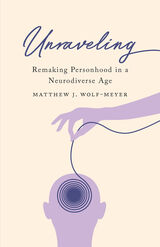 Unraveling: Remaking Personhood in a Neurodiverse Age
Matthew J. Wolf-Meyer
University of Minnesota Press, 2020 Developing a cybernetic model of subjectivity and personhood that honors disability experiences to reconceptualize the category of the human
Twentieth-century neuroscience fixed the brain as the basis of consciousness, the self, identity, individuality, even life itself, obscuring the fundamental relationships between bodies and the worlds that they inhabit. In Unraveling, Matthew J. Wolf-Meyer draws on narratives of family and individual experiences with neurological disorders, paired with texts by neuroscientists and psychiatrists, to decenter the brain and expose the ableist biases in the dominant thinking about personhood.
Unraveling articulates a novel cybernetic theory of subjectivity in which the nervous system is connected to the world it inhabits rather than being walled off inside the body, moving beyond neuroscientific, symbolic, and materialist approaches to the self to focus instead on such concepts as animation, modularity, and facilitation. It does so through close readings of memoirs by individuals who lost their hearing or developed trauma-induced aphasia, as well as family members of people diagnosed as autistic—texts that rethink modes of subjectivity through experiences with communication, caregiving, and the demands of everyday life.
Arguing for a radical antinormative bioethics, Unraveling shifts the discourse on neurological disorders from such value-laden concepts as “quality of life” to develop an inclusive model of personhood that honors disability experiences and reconceptualizes the category of the human in all of its social, technological, and environmental contexts.
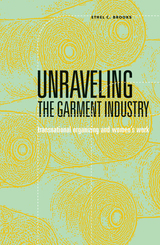 Unraveling the Garment Industry: Transnational Organizing and Women’s Work
Ethel C. Brooks
University of Minnesota Press, 2007 Unraveling the Garment Industry is an ambitious investigation of the politics of labor and protest within an industry that has come to define the possibilities and abuses of globalization and its feminized labor: the garment industry. Focusing on three labor rights movements—against GAP clothing in El Salvador, child labor in Bangladesh, and sweatshops in New York City—Ethel C. Brooks examines how transnational consumer protest campaigns effect change, sometimes with unplanned penalties for those they intend to protect. Brooks analyzes a two-pronged problem in consumer boycott campaigns against labor abuse in the garment industry. First, how are we to understand the political necessities of local protest such as the right to unionize against the emphasis placed on consumer boycotts? Second, what and whose agency is privileged or obscured within the symbolic economies and the politics of information deployed by these campaigns? Tying both of these questions together is a commitment to seeing globalization as embedded in the everyday realities of the local. Drawing attention to the race, class, and gender assumptions central to powerful consumer boycotts, Brooks reveals how these movements unintentionally reinforce the global economic forces they denounce. Ethel C. Brooks is assistant professor of women’s and gender studies and sociology at Rutgers University.
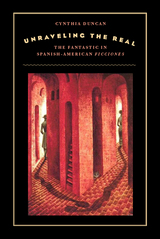 Unraveling the Real: The Fantastic in Spanish-American Ficciones
Authored by Cynthia Duncan
Temple University Press, 2010 In literary and cinematic fictions, the fantastic blurs the lines between reality and fantasy. Lacking a consensus on definition, critics often describe the fantastic as supernatural, or similar to, but quite different from fantasy, science fiction, and magical realism. In Unraveling the Real Cynthia Duncan provides a new theoretical framework for discussing how the fantastic explores both metaphysical and socially relevant themes in Spanish American fictions. Duncan deftly shows how authors and artists have used this literary genre to convey marginalized voices as well as critique colonialism, racism, sexism, and classism. Selecting examples from the works of such noted writers as Jorge Luis Borges, Julio Cortázar, and Carlos Fuentes, among others, she shows how capacious the concept is, and why it eludes standard definition. Challenging the notion that the fantastic is escapist in nature, Unraveling the Real shows how the fantastic has been politically engaged throughout the twentieth century, often questioning what is real or unreal. Presenting a mirror image of reality, the fantastic does not promoting a utopian parallel universe but rather challenges the way we think about the world around us and the cultural legacy of colonialism.
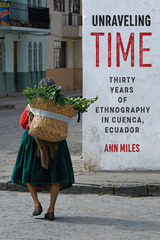 Unraveling Time: Thirty Years of Ethnography in Cuenca, Ecuador
Ann Miles
University of Texas Press, 2022 Ann Miles has been chronicling life in the Ecuadorian city of Cuenca for more than thirty years. In that time, she has witnessed change after change. A large regional capital where modern trains whisk residents past historic plazas, Cuenca has invited in the world and watched as its own citizens risk undocumented migration abroad. Families have arrived from rural towns only to then be displaced from the gentrifying city center. Over time, children have been educated, streetlights have made neighborhoods safer, and remittances from overseas have helped build new homes and sometimes torn people apart. Roads now connect people who once were far away, and talking or texting on cell phones has replaced hanging out at the corner store. Unraveling Time traces the enduring consequences of political and social movements, transnational migration, and economic development in Cuenca. Miles reckons with details that often escape less committed observers, suggesting that we learn a good deal more when we look back on whole lives. Practicing what she calls an ethnography of accrual, Miles takes a long view, where decades of seemingly disparate experiences coalesce into cultural transformation. Her approach not only reveals what change has meant in a major Latin American city but also serves as a reflection on ethnography itself.
 Unravelling Gramsci: Hegemony and Passive Revolution in the Global Political Economy
Adam David Morton
Pluto Press, 2007 Unravelling Gramsci makes extensive use of Antonio Gramsci's writings, including his pre-prison journalism, prison letters, and prison notebooks, to provide a fresh approach to understanding his contemporary relevance in the current neoliberal world order. Adam David Morton examines in detail the themes of hegemony, passive revolution, and uneven development to provide a useful way of analyzing the contemporary global political economy, neoliberalism, state formation, and practices of resistance. The book explores the theoretical and practical limitations to the use of Gramsci's ideas today.
"Powerful and clarifying . . . a landmark volume."
---John Agnew, University of California, Los Angeles
"Morton draws upon an impressive knowledge of Gramsci's writings to provide new insights into key processes in today's world order."
---Anne Showstack Sassoon, Kingston University and Birbeck College, University of London.
The Unreal City
Mike Lala
Tupelo Press, 2023 A complex and multifaceted reckoning with literary and cultural lineage, Mike Lala’s The Unreal City locates our moment, and reimagines what we might make of it, by subjecting the history of literature to a radical détournement.
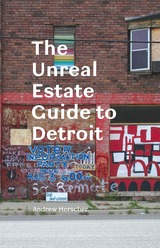 The Unreal Estate Guide to Detroit
Andrew Herscher
University of Michigan Press, 2012 Intense attention has been paid to Detroit as a site of urban crisis. This crisis, however, has not only yielded the massive devaluation of real estate that has so often been noted; it has also yielded an explosive production of seemingly valueless urban property that has facilitated the imagination and practice of alternative urbanisms. The first sustained study of Detroit’s alternative urban cultures, The Unreal Estate Guide to Detroit initiates a new focus on Detroit as a site not only of urban crisis but also of urban possibility. The Guide documents art and curatorial practices, community and guerilla gardens, urban farming and forestry, cultural platforms, living archives, evangelical missions, temporary public spaces, intentional communities, furtive monuments, outsider architecture, and other work made possible by the ready availability of urban space in Detroit. The Guide poses these spaces as “unreal estate”: urban territory that has slipped through the free- market economy and entered other regimes of value, other contexts of meaning, and other systems of use. The appropriation of this territory in Detroit, the Guide suggests, offers new perspectives on what a city is and can be, especially in a time of urban crisis.
 Unreal Houses: Character, Gender, and Genealogy in the Tale of Genji
Edith Sarra
Harvard University Press, 2020 The Tale of Genji (ca. 1008), by noblewoman Murasaki Shikibu, is known for its sophisticated renderings of fictional characters’ minds and its critical perspectives on the lives of the aristocracy of eleventh-century Japan. Unreal Houses radically rethinks the Genji by focusing on the figure of the house. Edith Sarra examines the narrative’s fictionalized images of aristocratic mansions and its representation of the people who inhabit them, exploring how key characters in the Genji think about houses in both the architectural and genealogical sense of the word.
Through close readings of the Genji and other Heian narratives, Unreal Houses elucidates the literary fabrication of social, architectural, and affective spaces and shows how the figure of the house contributes to the structuring of narrative sequences and the expression of relational nuances among fictional characters. Combining literary analysis with the history of gender, marriage, and the built environment, Sarra opens new perspectives on the architectonics of the Genji and the feminine milieu that midwifed what some have called the world’s first novel.
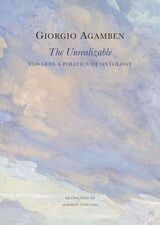 The Unrealizable: Towards a Politics of Ontology
Giorgio Agamben
Seagull Books, 2024 A patient, genealogical investigation of the dichotomies that are foundational to the Western philosophical tradition.
We are so used to distinguishing between the possible and the real, between essence and existence that we do not realize that these distinctions, which seem so obvious to us, are the result of a long and laborious process that has led to the splitting of being—the “matter” of thought—into two fragments that are both conflicting and intimately intertwined.
This book argues that the ontological-political machine of the West is based on the splitting of this “matter,” without which neither science nor politics would be possible. Without the partition of reality into essence and existence and into possibility and actuality, neither scientific knowledge nor the ability to control human action—which characterizes the historical power of the West—would have been possible.
If we could not suspend the exclusive concentration of our attention on what immediately exists (as animals seem to do), to think and define its essence, Western science and technology would not have experienced the advances that characterize them. And if the dimension of possibility disappeared entirely, neither plans nor projects would be thinkable, and human actions could be neither directed nor controlled. The incomparable power of the West has one of its essential presuppositions in this ontological machine.
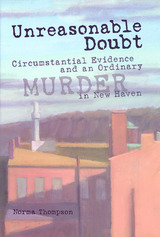 Unreasonable Doubt: Circumstantial Evidence and an Ordinary Murder in New Haven
Norma Thompson
University of Missouri Press, 2006 It was to all appearances an ordinary murder—many might have said that it was an open-and-shut case. But some jurors were not convinced, and the taint of reasonable doubt led one of them to question the very future of our legal system. For many Americans, the civic responsibility of jury duty might seem an inconvenience; for Norma Thompson, it was a unique opportunity to bring her expertise to bear on the state of trial procedures in America today. With a background in political science, literature, and the classics, Thompson served as jury foreman in a trial of an “ordinary” murder in New Haven, Connecticut. Deliberations were buffeted by crosswinds of common sense and strong emotion. The trial ended in a hung jury because of what Thompson calls the “unreasonable doubts” of two fellow jurors concerning circumstantial evidence in an age when DNA testing holds out the promise of irrefutable proof. In a compelling tale of contrasting rhetoric, Thompson takes readers into the courtroom to hear a streetwise convict verbally sparring with the D.A., then brings us into the confines of the jury room to have us witness nervous chatter over the meaning of evidence. She also contrasts this ordinary murder with the concurrent brutal stabbing of a Yale student, a case that attracted considerably more police and media attention. Thompson argues that the indeterminate results of the trial are symptomatic of larger problems in the justice system and society and that the reluctance of most people today to be judgmental is damaging the criminal justice system. As an antidote, she suggests that great literary and historical texts can help us develop the capacity for prudential judgment. Gleaning insights from an imaginary jury of Tocqueville and Plato, Jane Austen and William Faulkner, among other writers and thinkers, Thompson shows how confrontation with the works of such authors can help model more proper habits of deliberation. Blending personal memoir, social analysis, and literary criticism, Unreasonable Doubt is a challenging book that deals squarely with the evasion of judgment in contemporary political, social, and legal affairs. Brimming with brilliant insights, it suggests that the foundations for thought and action in our time have been neglected as a result of the wall erected between the social sciences and the humanities and invites readers to consider jury duty in a new light. Through real-world drama and literary reflection, it shows us that there is more to politics than power—and more of value to be found in the humanities than we may have supposed.
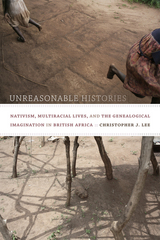 Unreasonable Histories: Nativism, Multiracial Lives, and the Genealogical Imagination in British Africa
Christopher J. Lee
Duke University Press, 2015 In Unreasonable Histories, Christopher J. Lee unsettles the parameters and content of African studies as currently understood. At the book's core are the experiences of multiracial Africans in British Central Africa—contemporary Malawi, Zimbabwe, and Zambia—from the 1910s to the 1960s. Drawing on a spectrum of evidence—including organizational documents, court records, personal letters, commission reports, popular periodicals, photographs, and oral testimony—Lee traces the emergence of Anglo-African, Euro-African, and Eurafrican subjectivities which constituted a grassroots Afro-Britishness that defied colonial categories of native and non-native. Discriminated against and often impoverished, these subaltern communities crafted a genealogical imagination that reconfigured kinship and racial descent to make political claims and generate affective meaning. But these critical histories equally confront a postcolonial reason that has occluded these experiences, highlighting uneven imperial legacies that still remain. Based on research in five countries, Unreasonable Histories ultimately revisits foundational questions in the field, to argue for the continent's diverse heritage and to redefine the meanings of being African in the past and present—and for the future.
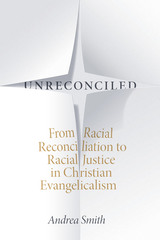 Unreconciled: From Racial Reconciliation to Racial Justice in Christian Evangelicalism
Andrea Smith
Duke University Press, 2019 In the 1990s, many evangelical Christian organizations and church leaders began to acknowledge their long history of racism and launched efforts at becoming more inclusive of people of color. While much of this racial reconciliation movement has not directly confronted systemic racism's structural causes, there exists a smaller countermovement within evangelicalism, primarily led by women of color who are actively engaged in antiracism and social justice struggles. In Unreconciled Andrea Smith examines these movements through a critical ethnic studies lens, evaluating the varying degrees to which evangelical communities that were founded on white supremacy have addressed racism. Drawing on evangelical publications, sermons, and organization statements, as well as ethnographic fieldwork and participation in evangelical events, Smith shows how evangelicalism is largely unable to effectively challenge white supremacy due to its reliance upon discourses of whiteness. At the same time, the work of progressive evangelical women of color not only demonstrates that evangelical Christianity can be an unexpected place in which to find theoretical critique and social justice organizing but also shows how critical ethnic studies' interventions can be applied broadly across political and religious divides outside the academy.
 Unrefined: How Capitalism Reinvented Sugar
David Singerman
University of Chicago Press, 2025 A surprising look at how modern capitalism changed sugar from a natural food to a scientific commodity.
Sugar is everywhere in the western diet, blamed for epidemics of obesity, diabetes, and other modern maladies. Our addiction to sweetness has a long and unsavory history. Over the past five hundred years, sugar has shaped empires, made fortunes for a few, and brought misery for millions of workers both enslaved and free. How did sugar become a defining modern food and an essential global commodity?
In Unrefined, David Singerman recasts our thinking about this crucial substance in the history of capitalism. Before the nineteenth century, sugar’s value depended on natural qualities: its color, its taste, where it was grown, and who had made it. But beginning around 1850, a combination of plantation owners, industrialists, and scientists set out to redefine sugar itself. Deploying the tools and rhetoric of science, they transformed not just how sugar was produced or traded but even how people thought about it. By changing sugar into a pure chemical object, these forces stripped power from workers and enabled—and obscured—new kinds of fraud, corruption, and monopoly.
Taking us to unexplored spaces in the world of sugar, from laboratories and docks to refineries and the halls of Congress, Singerman illuminates dark intersections of the histories of corruption, science, and capitalism.
The Unreliable Tree: Poems
Margot Kahn
Northwestern University Press, 2025 A luminous poetry collection that weaves together nature, family ties, and memory
Born from a state of fragmented time, the poems in The Unreliable Tree call out the intimate feelings mothers so often fear to share. With a precise and tender eye, Margot Kahn tracks her early years of parenthood alongside the seasons of her family’s orchard. As she chronicles the changes in her marriage, her friendships, and her own shifting identity, Kahn questions the risks we take for devotion and the labors we devote to love. These poems shine a light on the patience and perseverance required to care—for homes, for people, for heritage—and ultimately question the choices we make: to hold on to others around us, and to hold on to ourselves. Compassionate, unflinching, lyric, and raw, The Unreliable Tree portrays the world of early motherhood with humility and complicated beauty.
 The Unremarkable Wordsworth
Geoffrey H. HartmanForeword by Donald G. Marshall
University of Minnesota Press, 1987 The Unremarkable Wordsworth was first published in 1987. Minnesota Archive Editions uses digital technology to make long-unavailable books once again accessible, and are published unaltered from the original University of Minnesota Press editions. William Wordsworth was attacked by the critics of his time for imposing unremarkable sights and sentiments on his audience. In this book's title essay, an exemplary reading of the Westminster Bridge sonnet, Geoffrey Hartman shows how Wordsworth's "unremarkable phrases" attain their curious vigor. Drawing upon the propositions of semiological analysis—that signs are not signs unless they become perceptible, through the contrast between "marked" and "unmarked"—Hartman, in a deft and sensitive analysis, is able to play these notions of marking and the unremarkable off against each other. Wordsworth, in the end, overcomes both his critics and the science of signs: his quiet sonnet—with its muted or near-absent signs—is itself, as epitaph for an era, a faithful sign of the times. Hartman's capacity to open up a dialogue between contemporary theory and Wordsworth's poetry informs all of these essays, written since the 1964 publication of Wordsworth's Poetry, a book that marked an epoch in the study of that poet and of Romantic poetry in general. In the years since then, the nature of literary study has changed dramatically, and Hartman has been a leader in the turn to theoretical modes of interpretation. The fifteen essays in The Unremarkable Wordsworth draw upon a wide range of contemporary theoretical approaches, from psychoanalysis to structuralism, from deconstruction to phenomenology. Yet, as Donald Marshall points out in his foreword, "Wordsworth remains so much the focus of this book that 'critical method' is strangely transmuted." For Hartman, reading and thinking are inseparable; he has an uncanny power to convey in an intensified form the poet's own consciousness, not under the rubric of "intertextuality" but because he "has ears to hear." Geoffrey H. Hartman is Karl Young Professor of English and Comparative Literature at Yale University. His most recent book is Easy Pieces. Donald G. Marshall is a professor of English at the University of Iowa.
Unremembering Me
Luiz Ruffato
Tagus Press, 2018 Inspired by his own family's struggles, as well as the broader sociopolitical and economic forces that shaped Brazil in the 1970s, Luiz Ruffato's epistolary novel, Unremembering Me, traces the story of the narrator's older brother. Leaving behind his parents and younger siblings in order to assume financial responsibility for his family, Célio, a young factory hand from Cataguases, Minas Gerais, goes to work in industrial São Paulo. His letters home convey details about his work, living situation, adjustments to urban life, and fierce homesickness, even as they point to growing political unrest under the military dictatorship and Célio's increasing participation as a union organizer.
Unrepayable Debt: Law, Redress, Reconciliation, and the Unmaking of Empire
Yukiko Koga
University of Chicago Press What does it mean, and take, to repay the unrepayable?
In the 1990s, a series of lawsuits was raised on behalf of Chinese survivors of violence and enslavement by the Japanese empire. Both inside and outside the courtroom, a movement emerged as Chinese victims, their descendants, and Japanese lawyers and activists forged transnational and intergenerational collaborations, seeking redress and reconciliation, and leading to a sea change in the legal sphere and settlements with implicated corporations.
Asking what happens when moral and financial debts both demand and defy repayment, Unrepayable Debt explores what it takes to reckon with the nature and the scale of imperial violence, set against the entangled processes of decolonization and deimperialization.
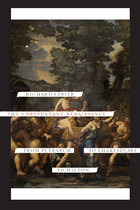 The Unrepentant Renaissance: From Petrarch to Shakespeare to Milton
Richard Strier
University of Chicago Press, 2011 Dedicated to discussing writings of the European Renaissance that dissented from the dominant values of the period.
Who during the Renaissance could have dissented from the values of reason and restraint, patience and humility, rejection of the worldly and the physical? These widely articulated values were part of the inherited Christian tradition and were reinforced by key elements in the Renaissance, especially the revival of Stoicism and Platonism. This book is devoted to those who did dissent from them. Richard Strier reveals that many long-recognized major texts did question the most traditional values and belong to a Renaissance far more unconstrained and affirmative than much recent scholarship has allowed.
The Unrepentant Renaissance counters the prevalent view of the period as dominated by the regulation of bodies and passions; the book aims to reclaim the Renaissance as an era happily churning with surprising, worldly, and self-assertive energies. Reviving the perspective of Burckhardt and Nietzsche, Strier provides fresh and uninhibited readings of texts by Petrarch, Shakespeare (sonnets and plays), Loyola, Montaigne, Descartes, and Milton. Strier’s lively argument, expressed in lucid prose, is meant to stir debate throughout the field of Renaissance studies.
Unreported Opinions of the Supreme Court of Michigan 1836-1843
Edited by William Wirt Blume
University of Michigan Press, 1945 Those who are interested in the judicial history of Michigan prior to 1863 are fortunate in having access to much of such history contained in the six volumes entitled Transactions of the Supreme Court of Michigan, edited by William Wirt Blume of the Michigan Law School faculty. In Unreported Opinions of the Supreme Court of Michigan 1836–1843, Blume brings to light and for the first time makes accessible the Michigan Supreme Court decisions that were rendered during the seven years from 1836 to 1843. The volume includes seventy of the opinions of the Michigan Territorial Court during this time period, along with other interesting material.
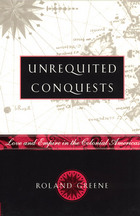 Unrequited Conquests: Love and Empire in the Colonial Americas
Roland Greene
University of Chicago Press, 2000 Love poetry dominated European literature during the Renaissance. Its attitudes, conventions, and values appeared not only in courtly settings but also in the transatlantic world, where cultures were being built, power exercised, and policies made. In this major contribution to our understanding of both the Age of Exploration and early modern lyric, Roland Greene argues that love poetry was not simply a reflection of the times but a means of cultural transformation.
European encounters with the Americas awakened many forms of desire, which pervaded the writings of explorers like Columbus and his contemporaries. These experiences in turn shaped colonial society in Brazil, Peru, and elsewhere. The New World, while it could be explored, conquered, and exploited, could never really be "known"—leaving Europe's desire continually unrequited and the project of empire unfulfilled.
Using numerous poetic examples and extensive historical documentation, Unrequited Conquests rewrites the relations between the Renaissance and colonial Latin America and between poetry and history.
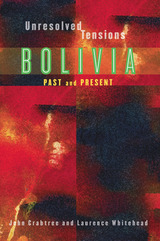 Unresolved Tensions: Bolivia Past and Present
John Crabtree
University of Pittsburgh Press, 2008 The landslide election of Evo Morales in December 2005 pointed toward a process of accelerated change in Bolivia, forging a path away from globalization and the neoliberal paradigm in favor of greater national control and state intervention. This in turn shifted the power relations of Bolivia's internal politics-beginning with greater inclusion of the indigenous population-and altered the nation's foreign relations. Unresolved Tensions engages this realignment from a variety of analytical perspectives, using the Morales election as a lens through which to reassess Bolivia's contemporary political reality and its relation to a set of deeper historical issues.
This volume brings together an expert group of commentators and participants from within the Bolivian political arena to offer diverse perspectives and competing views on issues of ethnicity, regionalism, state-society relations, constitutional reform, economic development, and globalization. In this way, the contributors seek to reassess Bolivia's past, present, and future, consider the ways in which the nation's historical developments flow from these deeper currents, and assess the opportunities and challenges that arise within the new political context.
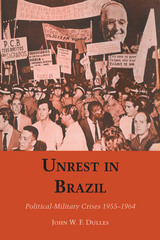 Unrest in Brazil: Political-Military Crises 1955-1964
By John W. F. Dulles
University of Texas Press, 1970 … I offer my life in a holocaust … This people whose slave I was will no longer be slave to anyone. My sacrifice will remain forever in their souls and my blood will be the price of their ransom. President Getulio Vargas' testament—written shortly before his suicide on August 24, 1954—was prophetic, for the Vargas legacy was to cast a shadow on political-military events of the next decade. With news of Vargas' suicide, opponents of the late President, who were usually out of power, tried to organize. The military itself was split, but those favoring Kubitschek, apparent winner of the 1955 presidential election on a ticket of Vargas-created parties, gained control. To assure Kubitschek's inauguration Army leaders deposed two acting Presidents in 1955. During Kubitschek's presidency (1956–1961 ) there were manifestations of discontent by military and political groups who ascribed numerous evils to Vargas and his followers. In 1961, when Kubitschek's successor, Jânio Quadros, resigned after six months in office, the unrest intensified. Vice President Jango Goulart assumed the presidency and sought unsuccessfully to conciliate contending forces; his battle for reform seemed to make him an ally of "far leftists." Feeling that discipline was being undermined by men close to the President and that only military action could save Brazil from following the path favored by influential Communist labor leaders, a majority of the Army officers agreed to overthrow Goulart's administration in 1964. Unrest in Brazil describes in exciting detail the government crises and resulting military interventions that punctuated the power struggle between supporters and opponents of Vargas in the decade following his death.
 unrest in the nebulae
Gitan Djeli
Duke University Press, 2026 In unrest in the nebulae, Gitan Djeli wields prose poetry to archive five hundred years of exploitative colonization, ecocide, extinction, militarization and deportation, slavery, indenture, negotiated nationhood, postcolonial plantation structures, and apologist histories. Writing in a queer anticolonial poetics, and using lines of Kreol, Gitan Djeli mines the tension that emerges between colonialism and language, disarticulating the myth-making aesthetics of the colonial world. She tells the story of the ‘other slavery’ in the Indian Ocean and its histories of enslavement and indenture through a subversive, fragmented poetics, and often from the perspective its geologic witnesses—a misnamed ocean or the range of mountains within it or the volcanic idea of islands. In a charge of resistance to the catastrophe of modernity, unrest in the nebulae takes seriously Sylvia Wynter’s invitation to engage “a new science of the word.”
 Unrest in the Roman Empire: A Discursive History
Edited by Lisa Pilar Eberle and Myles Lavan
Campus Verlag, 2024 An edited collection exploring how Roman contemporaries thought about unrest.
Despite Roman claims to have brought peace, unrest was widespread in the Roman Empire. Revolts, protests, and piracy were common occurrences. How did contemporaries relate to and make sense of such phenomena?
This volume gathers eleven contributions by specialists in the various literatures and modes of thinking that flourished in the empire between the second century BCE and the fifth century CE, including Graeco-Roman historiography and philosophy, Jewish prophecy, Christian apology, and the writings of the Tannaitic rabbis, to investigate these questions. Each contribution analyzes the discourses by which the diverse authors of these texts understood instances of unrest. Together, the contributions expand our understanding of the varied politics that pervaded the Roman empire. They highlight the intellectual labor at every level of society that went to (re)making this imperial formation throughout its long history.
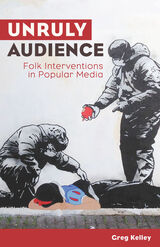 Unruly Audience: Folk Interventions in Popular Media
Greg Kelley
Utah State University Press, 2020 Unruly Audience explores grassroots appropriations of familiar media texts from film, television, stand-up comedy, popular music, advertising, and tourism. Case studies probe the complex relationship between folklore and media, with particular attention to the dynamics of production and reception.
Greg Kelley examines how “folk interventions” challenge institutional media with active—often public—social engagement. Drawing on a diverse range of examples—popular music parodies of “The Colonel Bogey March,” jokes about Disney’s Snow White and the Seven Dwarfs, touristic performance at Jamaica’s haunted Rose Hall, internet memes about NBC’s The Office, children’s parodies of commercials, and jokes about joking—Kelley demonstrates how active audiences mobilize folklore to disrupt dominant modes of media discourse. With materials both historical and contemporary and compiled from print, internet archives, and original fieldwork, Kelley’s audience-centered analysis demonstrates that producers of media are not the sole arbiters of meaning. With folklore as an important tool, unruly audiences refashion mediated expression so that the material becomes more relevant to their own circumstances.
Unruly Audience foregrounds the fluid interplay between media production and audience reception and between forces of cultural domination and cultural resistance, bringing new analytical insights to familiar folk practices. This carefully crafted book will speak to students and scholars in folklore, popular culture, and media studies in multidisciplinary ways.
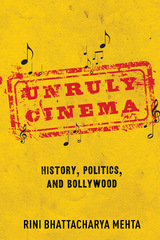 Unruly Cinema: History, Politics, and Bollywood
Rini Bhattacharya Mehta
University of Illinois Press, 2020 Between 1931 and 2000, India's popular cinema steadily overcame Hollywood domination. Bollywood, the film industry centered in Mumbai, became nothing less than a global cultural juggernaut. But Bollywood is merely one part of the country's prolific, multilingual cinema. Unruly Cinema looks at the complex series of events that allowed the entire Indian film industry to defy attempts to control, reform, and refine it in the twentieth century and beyond. Rini Bhattacharya Mehta considers four aspects of Indian cinema's complicated history. She begins with the industry's surprising, market-driven triumph over imports from Hollywood and elsewhere in the 1930s. From there she explores how the nationalist social melodrama outwitted the government with its 1950s cinematic lyrical manifestoes. In the 1970s, an action cinema centered on the angry young male co-opted the voice of the oppressed. Finally, Mehta examines Indian film's discovery of the global neoliberal aesthetic that encouraged the emergence of Bollywood.
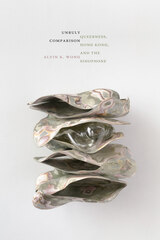 Unruly Comparison: Queerness, Hong Kong, and the Sinophone
Alvin K. Wong
Duke University Press, 2025 In Unruly Comparison, Alvin K. Wong examines queerness in Hong Kong through a transdisciplinary analysis of Sinophone literature, cinema, visual culture, and civil society. Moving beyond Eurocentrism in queer theory and China-centrism in area studies, Wong frames Hong Kong as a model for global comparison by theorizing a method of unruly comparison—acknowledging the incommensurability of cultural texts and queer figures across different temporal and spatial locations. Here, unruly comparison positions Hong Kong as an undefinable time-space that troubles historicist, colonial, and China-centric renderings of the city as merely a site of British colonial legacy, Chinese rule, or global capital. Wong analyzes queer interracial desire in WWII; a cinema of gay male cosmopolitanism; queer intimacy among migrant workers; trans visuality and legality; cross-border sex work; and the queer diaspora of Hong Kong after the 2019 protests. Through Wong’s readings, Hong Kong becomes a queer region of racial, gender, and sexual incommensurability. By foregrounding the friction, asymmetry, and perverse juxtapositions of unruly comparison of Hong Kong with the Sinophone world, Wong reframes key debates in queer theory and East Asian studies.
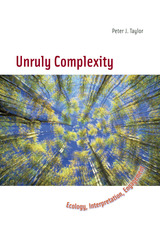 Unruly Complexity: Ecology, Interpretation, Engagement
Peter J. Taylor
University of Chicago Press, 2005 Ambitiously identifying fresh issues in the study of complex systems, Peter J. Taylor, in a model of interdisciplinary exploration, makes these concerns accessible to scholars in the fields of ecology, environmental science, and science studies. Unruly Complexity explores concepts used to deal with complexity in three realms: ecology and socio-environmental change; the collective constitution of knowledge; and the interpretations of science as they influence subsequent research.
For each realm Taylor shows that unruly complexity-situations that lack definite boundaries, where what goes on "outside" continually restructures what is "inside," and where diverse processes come together to produce change-should not be suppressed by partitioning complexity into well-bounded systems that can be studied or managed from an outside vantage point. Using case studies from Australia, North America, and Africa, he encourages readers to be troubled by conventional boundaries-especially between science and the interpretation of science-and to reflect more self-consciously on the conceptual and practical choices researchers make.
Unruly Creatures: Stories
Jennifer Caloyeras
West Virginia University Press, 2017 Independent Publisher’s Book Awards, Silver Medal, Short Story Fiction In this collection rife with humor and pathos, alienated characters struggle to subvert, contain, control, and even escape their bodies. A teenage girl grapples with pubic hair grown wild, a biologist finds herself in love with a gorilla, a prisoner yearns to escape her biological destiny.
In some stories, the bodies have surrogates: a high-school girl babysits an elderly woman’s plastic doll while negotiating her own sexual awakening, and a young man finds that he can only receive affection from his father when he is in costume. Dark humor and magical realism put in sharp relief the everyday trials of Americans in a story collection that asks, in what way are we more than the sum of our parts?
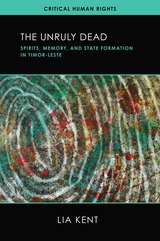 The Unruly Dead: Spirits, Memory, and State Formation in Timor-Leste
Lia Kent
University of Wisconsin Press, 2024 “What might it mean to take the dead seriously as political actors?” asks Lia Kent in this exciting new contribution to critical human rights scholarship. In Timor-Leste, a new nation-state that experienced centuries of European colonialism before a violent occupation by Indonesia from 1975 to 1999, the dead are active participants in social and political life who continue to operate within familial structures of obligation and commitment. On individual, local, and national levels, Timor-Leste is invested in various forms of memory work, including memorialization, exhumation, reburial, and commemoration of the occupation’s victims. Such practices enliven the dead, allowing them to forge new relationships with the living and unsettling the state-building logics that seek to contain and control them.
With generous, careful ethnography and incisive analysis, Kent challenges comfortable, linear narratives of transitional justice and argues that this memory work is reshaping the East Timorese social and political order—a process in which the dead are active, and sometimes disruptive, participants. Community ties and even the landscape itself are imbued with their presence and demands, and the horrific scale of mass death in recent times—at least a third of the population perished during the Indonesian occupation—means Timor-Leste’s dead have real, significant power in the country’s efforts to remember, recover, and reestablish itself.
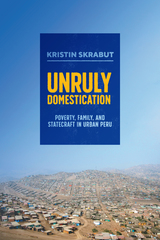 Unruly Domestication: Poverty, Family, and Statecraft in Urban Peru
Kristin Skrabut
University of Texas Press, 2024 2024 Flora Tristán Book Award, Sección Perú, Latin American Studies Association How the international war on poverty shapes identities, relationships, politics, and urban space in Peru. Unruly Domestication investigates how Peru’s ongoing, internationally endorsed "war on poverty" shapes politics, intimate identities, and urban space in Lima. Drawing on a decade of embedded, ethnographic research in Lima’s largest and most recently founded “extreme poverty zone,” Kristin Skrabut demonstrates how Peru’s efforts to fight poverty by formalizing property, identity, and family status perpetuate environmentally unsustainable urban sprawl, deepen discrimination against single mothers, and undermine Peruvians’ faith in public officials and in one another. In the process, Skrabut reveals myriad entanglements of poverty, statecraft, and private life, exploring how families are made and unmade through political practices, how gender inequalities are perpetuated through policy, and how Peruvians’ everyday pursuits of state-sanctioned domestic ideals reproduce informality and landscapes of poverty in the urban periphery. The only full-length ethnography written about Lima’s iconic and policy-inspiring shantytowns in thirty years, Unruly Domestication provides valuable insight into the dynamics of housing and urban development in the Global South, elucidating the most intimate and profound effects of global efforts to do good.
Unruly Eloquence: Lucian and the Comedy of Traditions
R. Bracht Branham
Harvard University Press, 1989 Branham expounds with sophistication and subtlety the essential ingredients of Lucian's satirical humor. He makes frequent reference to its importance for comic theory and literary history.
 The Unruly Facts of Race: The Politics of Knowledge Production in the Early Twentieth-Century Immigration Debate
Sunmin Kim
University of Chicago Press Reveals the surprising historical roots of US immigration policy and discourse.
Unfortunately, we’re all too familiar with the US’s legacy of maligning immigrants. Some Americans see immigrants as inherently threatening, a blank screen onto which the nation’s worst fears are projected. But this phenomenon is neither timeless nor static. Instead, it arose and transformed alongside the unprecedented arrival of immigrants in the early twentieth century—and the federal government’s response. In The Unruly Facts of Race, sociologist Sunmin Kim explains how American ideas about race and ethnicity were transformed in the early twentieth century as an unintended consequence of anti-immigrant mobilization.
Kim presents a wealth of archival evidence, including the proceedings of the 1907 Dillingham Commission, to reconstruct how competing racialized visions of nationhood evolved in the early twentieth-century immigration debate. Immigration restrictionist politicians believed that the United States should be a White, Anglo-Saxon, and Protestant nation. However, when they mobilized researchers—some of whom were women and/or immigrants—to gather data at a massive scale to rationalize their aims, they were met with unruly facts that did not support their racial project. Newer European immigrants, as the data showed, were not much different from descendants of earlier immigrants from northern Europe. When facts failed to support the vilification of immigrants, exclusionist politicians instead turned to race as a marker of ineluctable difference to justify their aims. This led to a new principle of national belonging: the United States transitioned to a country that encompassed various European groups, including Catholics and Jews, but excluded non-White immigrants, as they were deemed too different to become a part of the nation.
Kim’s analysis shows that throughout US history, the opportunity for belonging for some immigrants was predicated on the exclusion of others. His focus on the role of facts in the early twentieth century provides a refreshing take on why the so-called “nation of immigrants” has always demonized some immigrants while cherishing others, highlighting the selection and control of immigrants as the core principles of the American nation-building project. Amid a vitriolic explosion of American immigration discourse, Kim offers a needed corrective to and context for debates around who belongs in the United States.
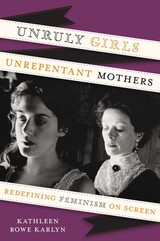 Unruly Girls, Unrepentant Mothers: Redefining Feminism on Screen
By Kathleen Rowe Karlyn
University of Texas Press, 2010 Since the 1990s, when Reviving Ophelia became a best seller and "Girl Power" a familiar anthem, girls have assumed new visibility in the culture. Yet in asserting their new power, young women have redefined femininity in ways that have often mystified their mothers. They have also largely disavowed feminism, even though their new influence is a likely legacy of feminism's Second Wave. At the same time, popular culture has persisted in idealizing, demonizing, or simply erasing mothers, rarely depicting them in strong and loving relationships with their daughters. Unruly Girls, Unrepentant Mothers, a companion to Kathleen Rowe Karlyn's groundbreaking work, The Unruly Woman, studies the ways popular culture and current debates within and about feminism inform each other. Surveying a range of films and television shows that have defined girls in the postfeminist era—from Titanic and My So-Called Life to Scream and The Devil Wears Prada, and from Love and Basketball to Ugly Betty—Karlyn explores the ways class, race, and generational conflicts have shaped both Girl Culture and feminism's Third Wave. Tying feminism's internal conflicts to negative attitudes toward mothers in the social world, she asks whether today's seemingly materialistic and apolitical girls, inspired by such real and fictional figures as the Spice Girls and Buffy the Vampire Slayer, have turned their backs on the feminism of their mothers or are redefining unruliness for a new age.
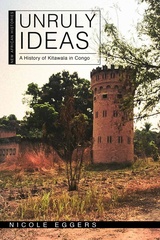 Unruly Ideas: A History of Kitawala in Congo
Nicole Eggers
Ohio University Press, 2023 Original oral and ethnographic sources inform this conceptual history of power in central Africa, imagined through the lens of Kitawala religious practices. Unruly Ideas: A History of Kitawala in Congo recounts the multifaceted history of the Congolese religious movement Kitawala from its colonial beginnings in the 1920s through its continued practice in some of the most conflict-riven parts of the eastern Democratic Republic of Congo today. Drawing on a rich body of original oral, ethnographic, and archival research, Nicole Eggers uses Kitawala as a lens through which to address the complex relationship between politics, religion, healing, and violence in central African history. Kitawala, which has roots in the African Watchtower (Jehovah’s Witness) movement, has long been viewed both by scholars and by popular historians as a form of male-dominated, anticolonial insurgency. But just as Kitawalists were never exclusively male, their teachings and activities were never directed solely at the Belgian colonial state, and their yearnings for self-rule were never entirely about the secular realms of authority. A more comprehensive look at the oral and archival evidence reveals they were and are concerned with the morality of power more broadly: on state, communal, and individual levels. Moreover, Kitawalist doctrine is itself unruly, and its preachers, prophets, and practitioners have articulated innumerable interpretations—most quite different from Watchtower Christianity—across space and time. More than a case study of a particular religious movement, Unruly Ideas is a conceptual history of power that investigates how communities and individuals in the region have historically imagined power, sought to access it, wielded it, and policed the morality of its uses. By focusing on power and its intellectual and social history in Congo, Unruly Ideas creates an analytical space in which readers can understand the differing manifestations of Kitawala—from its overtly political and sometimes violent moments to those more aptly characterized as individual quests for spiritual and physical therapy—as varying themes in the same story: the pursuit of wellness in the context of malady. On a more practical level, the book raises important questions about the project of writing histories of places like eastern Congo: a region where the repercussions of decades of political neglect, upheaval, and violence force us to reconsider how we can think about and use oral and archival sources. Finally, the book investigates the embodied and gendered nature of field research and interrogates the intersubjective and reciprocal nature of knowledge production.
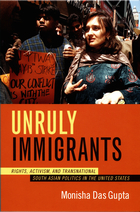 Unruly Immigrants: Rights, Activism, and Transnational South Asian Politics in the United States
Monisha Das Gupta
Duke University Press, 2006 In Unruly Immigrants, Monisha Das Gupta explores the innovative strategies that South Asian feminist, queer, and labor organizations in the United States have developed to assert claims to rights for immigrants without the privileges or security of citizenship. Since the 1980s many South Asian immigrants have found the India-centered “model minority” politics of previous generations inadequate to the task of redressing problems such as violence against women, homophobia, racism, and poverty. Thus they have devised new models of immigrant advocacy, seeking rights that are mobile rather than rooted in national membership, and advancing their claims as migrants rather than as citizens-to-be. Creating social justice organizations, they have inventively constructed a transnational complex of rights by drawing on local, national, and international laws to seek entitlements for their constituencies. Das Gupta offers an ethnography of seven South Asian organizations in the northeastern United States, looking at their development and politics as well as the conflicts that have emerged within the groups over questions of sexual, class, and political identities. She examines the ways that women’s organizations have defined and responded to questions of domestic violence as they relate to women’s immigration status; she describes the construction of a transnational South Asian queer identity and culture by people often marginalized by both mainstream South Asian and queer communities in the United States; and she draws attention to the efforts of labor groups who have sought economic justice for taxi drivers and domestic workers by confronting local policies that exploit cheap immigrant labor. Responding to the shortcomings of the state, their communities, and the larger social movements of which they are a part, these groups challenge the assumption that citizenship is the necessary basis of rights claims.
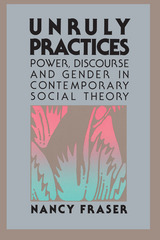 Unruly Practices: Power, Discorse, and Gender in Contemporary Social Theory
Fraser, Nancy
University of Minnesota Press, 1989 “A wonderfully rich and insightful collection of well-integrated essays on important current thinkers and social movements.” -Martin Jay
University of California, Berkeley
Unruly Practices brings together a series of widely discussed essays in feminism and social theory. Read together, they constitute a sustained critical encounter with leading European and American approaches to social theory. In addition, Nancy Fraser develops a new and original socialist-feminist critical theory that overcomes many of the limitations of current alternatives. First, in a series of critical essays, she deploys philosophical and literary techniques to sort the wheat from the chaff in the work of Michel Foucault, the French deconstructionists, Richard Rorty, and Jurgen Habermas. Then, in a group of constructive essays, she incorporates their respective strengths in a new critical theory of late-capitalist political culture.
Fraser breaks new ground methodologically by integrating the previously divergent insights of poststructuralism, critical social theory, feminist theory, and pragmatism. Thematically, she deals with varied forms of dominance and subordination in modern, industrial, late-capitalist societies - especially gender dominance and subordination; state-bureaucratic forms of organization; the institutional politics of knowledge and expertise; and the structure and function of social-welfare programs. In the last section of the book, these themes are integrated in an original theory of “the politics of need interpretation.” This concept becomes the linchpin of he socialist-feminist critical theory proposed in the last chapter.
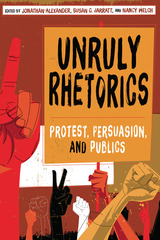 Unruly Rhetorics: Protest, Persuasion, and Publics
Jonathan Alexander
University of Pittsburgh Press, 2018 What forces bring ordinary people together in public to make their voices heard? What means do they use to break through impediments to democratic participation? Unruly Rhetorics is a collection of essays from scholars in rhetoric, communication, and writing studies inquiring into conditions for activism, political protest, and public assembly. An introduction drawing on Jacques Rancière and Judith Butler explores the conditions under which civil discourse cannot adequately redress suffering or injustice. The essays offer analyses of “unruliness” in case studies from both twenty-first-century and historical sites of social-justice protest. The collection concludes with an afterword highlighting and inviting further exploration of the ethical, political, and pedagogical questions unruly rhetorics raise. Examining multiple modes of expression—embodied, print, digital, and sonic—Unruly Rhetorics points to the possibility that unruliness, more than just one of many rhetorical strategies within political activity, is constitutive of the political itself.
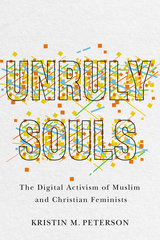 Unruly Souls: The Digital Activism of Muslim and Christian Feminists
Kristin M. Peterson
Rutgers University Press, 2022 Amid growing digital activism to address gender-based violence, institutional racism, and homophobia in U.S. society, Unruly Souls explores the intersectional feminist activism among young people within Islam and Evangelical Christianity. These religious misfits—marginalized from traditional religious spaces due to their sexuality, gender, or race—employ the creative tactics of digital media in their work to seek justice and to display their fundamental equality in the eyes of God. Through an analysis of various digital projects from hip-hop music videos and Instagram accounts to Twitter hashtags and podcasts, Kristin Peterson argues that the hybrid, flexible, playful, and sensory nature of digital media facilitate intersectional feminist activism within and beyond religious communities. Drawing on work from queer theory, decolonial theory, and Black feminist theory, this study explores how those who have been marginalized are able to effectively deploy their disregarded status along with digital media tactics to cultivate empathetic communities for those recovering from religious trauma.
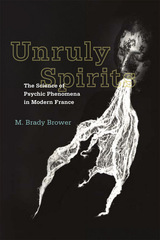 Unruly Spirits: The Science of Psychic Phenomena in Modern France
M. Brady Brower
University of Illinois Press, 2010 Unruly Spirits connects the study of séances, telepathy, telekinesis, materializations, and other parapsychic phenomena in France during the age of Sigmund Freud to an epistemological crisis that would eventually yield the French adoption of psychoanalysis. Skillfully navigating experiments conducted by nineteenth-century French psychical researchers and the wide-ranging debates that surrounded their work, M. Brady Brower situates the institutional development of psychical research at the intersection of popular faith and the emergent discipline of psychology. Brower shows how spiritualist mediums were ignored by French academic scientists for nearly three decades. Only after the ideologues of the Third Republic turned to science to address what they took to be the excess of popular democracy would the marvels of mediumism begin to emerge as legitimate objects of scientific inquiry. Taken up by the most prominent physicists, physiologists, and psychologists of the last decades of the nineteenth century, psychical research would eventually stall in the 1920s as researchers struggled to come to terms with interpersonal phenomena (such as trust and good faith) that could not be measured within the framework of their experimental methods. In characterizing psychical research as something other than a mere echo of popular spirituality or an anomaly among the sciences, Brower argues that the questions surrounding mediums served to sustain the scientific project by forestalling the establishment of a closed and complete system of knowledge. By acknowledging persistent doubt about the intentions of its participants, psychical research would result in the realization of a subjectivity that was essentially indeterminate and would thus clear the way for the French reception of psychoanalysis and the Freudian unconscious and its more comprehensive account of subjective uncertainty.
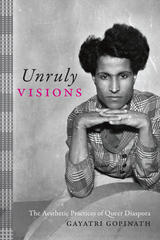 Unruly Visions: The Aesthetic Practices of Queer Diaspora
Gayatri Gopinath
Duke University Press, 2018 In Unruly Visions Gayatri Gopinath brings queer studies to bear on investigations of diaspora and visuality, tracing the interrelation of affect, archive, region, and aesthetics through an examination of a wide range of contemporary queer visual culture. Spanning film, fine art, poetry, and photography, these cultural forms—which Gopinath conceptualizes as aesthetic practices of queer diaspora—reveal the intimacies of seemingly disparate histories of (post)colonial dwelling and displacement and are a product of diasporic trajectories. Countering standard formulations of diaspora that inevitably foreground the nation-state, as well as familiar formulations of queerness that ignore regional gender and sexual formations, she stages unexpected encounters between works by South Asian, Middle Eastern, African, Australian, and Latinx artists such as Tracey Moffatt, Akram Zaatari, and Allan deSouza. Gopinath shows how their art functions as regional queer archives that express alternative understandings of time, space, and relationality. The queer optics produced by these visual practices creates South-to-South, region-to-region, and diaspora-to-region cartographies that profoundly challenge disciplinary and area studies rubrics. Gopinath thereby provides new critical perspectives on settler colonialism, empire, military occupation, racialization, and diasporic dislocation as they indelibly mark both bodies and landscapes.
 The Unruly Voice: Rediscovering Pauline Elizabeth Hopkins
Edited by John Cullen Gruesser
University of Illinois Press, 1996 The work and times of the Black writer, editor, and intellectual John Cullen Gruesser edits essays that explore the literary and journalistic career of Pauline Elizabeth Hopkins. A Black woman writer at the turn of the twentieth century, Hopkins worked as the unacknowledged editor-in-chief of the Colored American Magazine but also wrote short fiction, novels, nonfiction articles, and a play believed to be the first by a Black woman. Versatile and politically committed, she was fired when her strong editorial stands and non-conciliatory politics offended the new owner of Colored American Magazine. A rare examination of an overlooked figure in Black letters, The Unruly Voice explores Hopkins’s writing and her significance for contemporary readers. Contributors: Elizabeth Ammons; Kristina Brooks; Lois Lamphere Brown; C. K. Doreski; John Cullen Gruesser; Jennie A. Kassanoff; Kate McCullough; Nelly Y. McKay; and Cynthia D. Schrager
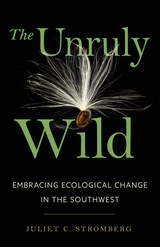 The Unruly Wild: Embracing Ecological Change in the Southwest
Juliet C. Stromberg
University of Arizona Press, 2026 What is considered a beneficial plant? In this era of global change, The Unruly Wild is a timely and relevant look at plant conservation and the evolving plant communities of the American Southwest.
Challenging the traditional invasion biology paradigm, Juliet C. Stromberg invites readers to reconsider the “alien invader” narrative and explore the beneficial roles that newly arrived plants can play in our ecosystems. Drawing from her extensive experience as a plant and restoration ecologist, Stromberg introduces a cast of plant characters that includes longtimers as well as newcomers.
Through compelling stories and scientific insights, Stromberg explains why some plants are thriving while others are in decline. Stromberg’s engaging narrative, enriched with personal anecdotes and detailed vignettes, encourages readers to pause, reflect, and deepen their relationship with the plant world. By promoting a more nuanced and respectful dialogue about our natural surroundings, this book offers valuable insights into biodiversity, climate resilience, and ecosystem restoration. This book is a call to embrace a more inclusive and adaptive approach to wild plants.
The Unruly Woman: Gender and the Genres of Laughter
By Kathleen Rowe
University of Texas Press, 1995 Unruly women have been making a spectacle of themselves in film and on television from Mae West to Roseanne Arnold. In this groundbreaking work, Kathleen Rowe explores how the unruly woman—often a voluptuous, noisy, joke-making rebel or "woman on top"—uses humor and excess to undermine patriarchal norms and authority. At the heart of the book are detailed analyses of two highly successful unruly women—the comedian Roseanne Arnold and the Muppet Miss Piggy. Putting these two figures in a deeper cultural perspective, Rowe also examines the evolution of romantic film comedy from the classical Hollywood period to the present, showing how the comedic roles of actresses such as Katharine Hepburn, Barbara Stanwyck, and Marilyn Monroe offered an alternative, empowered image of women that differed sharply from the "suffering heroine" portrayed in classical melodramas.
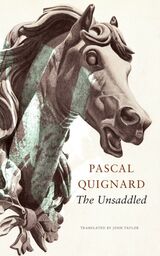 The Unsaddled
Pascal Quignard
Seagull Books, 2023 A captivating and wide-ranging interpretation of accidental dismounting.
In Pascal Quignard’s writing, philology hunts for wild game in a dark forest. The Unsaddled, which features horses as its central figure, is no exception. Taking off from puns, multifarious imagery, and metaphorical meanings—“to be baffled,” “to be thrown”—that the book’s title provides, Quignard focuses on life-changing moments. We meet George Sand (whose father died after being thrown from his horse), Saint Paul, Abelard, Agrippa d’Aubigné, and countless other writers, philosophers, theologians, or kings who fell off their horses—not to forget Jean-Jacques Rousseau, who was knocked over by a dog. Being “unsaddled” can also be associated, as Quignard shows in regard to Nietzsche, with an “overturning” of values. Scenes of war, hunting, “fleeing” or sexuality—“When lovers have a horse ride, they gallop in another world”—come before our eyes, each time from those unsettling vantage points that Quignard knows how to find. As ever, he ranges far and wide in his intense quest, taking examples from across human history, from the neolithic age to his own childhood memories of postwar Le Havre in northern France.
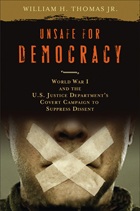 Unsafe for Democracy: World War I and the U.S. Justice Department's Covert Campaign to Suppress Dissent
William H. Thomas Jr.
University of Wisconsin Press, 2009 During the First World War it was the task of the U.S. Department of Justice, using the newly passed Espionage Act and its later Sedition Act amendment, to prosecute and convict those who opposed America’s entry into the conflict. In Unsafe for Democracy, historian William H. Thomas Jr. shows that the Justice Department did not stop at this official charge but went much further—paying cautionary visits to suspected dissenters, pressuring them to express support of the war effort, or intimidating them into silence. At times going undercover, investigators tried to elicit the unguarded comments of individuals believed to be a threat to the prevailing social order. In this massive yet largely secret campaign, agents cast their net wide, targeting isolationists, pacifists, immigrants, socialists, labor organizers, African Americans, and clergymen. The unemployed, the mentally ill, college students, schoolteachers, even schoolchildren, all might come under scrutiny, often in the context of the most trivial and benign activities of daily life. Delving into numerous reports by Justice Department detectives, Thomas documents how, in case after case, they used threats and warnings to frighten war critics and silence dissent. This early government crusade for wartime ideological conformity, Thomas argues, marks one of the more dubious achievements of the Progressive Era—and a development that resonates in the present day. Best Books for Special Interests, selected by the American Association of School Librarians “Recommended for all libraries.”—Frederic Krome, Library Journal
 Unsafe Haven: The United States, the IRA and Political Prisoners
Karen McElrath
Pluto Press, 2000 For almost two hundred years the United States has been a safe haven for Irish political prisoners seeking refuge. More recently however the US government has sought deportation, extradition and prosecution to exclude Irish republicans from the country. In the first book to focus on the relationship between these tools of exclusion and US foreign policy, Karen McElrath examines why this change has come about and the extent to which the granting of political asylum in the US is influenced by relations with Britain and other countries.
Karen McElrath questions US government attempts to portray an impartial role in the Irish conflict, arguing that historical and contemporary evidence reveals otherwise. She shows that, far from being a neutral process, the success of bids for political asylum often depends on the relationship between the US and the government of the applicant’s country of origin. Drawing on exclusive interviews with Irish Republicans who have faced deportation or extradition from the United States, or who have been prosecuted in the US for politically-motivated offences, McElrath explores the links between deportation and extradition outcomes and foreign policy issues. The tools of exclusion are defined in their historical context, and the history of US extradition law is described, with particular focus on the treaties with Britain. McElrath also examines the offences for which Irish and Irish-American Republicans have been charged, discusses the various levels of support for Irish political prisoners in the US, and summarises the findings by international human rights organisations.
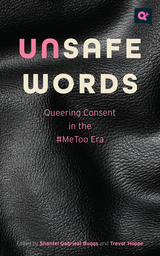 Unsafe Words: Queering Consent in the #MeToo Era
Shantel Gabrieal Buggs
Rutgers University Press, 2023 Queer people may not have invented sex, but queers have long been pioneers in imagining new ways to have it. Yet their voices have been largely absent from the #MeToo conversation. What can queer people learn from the #MeToo conversation? And what can queer communities teach the rest of the world about ethical sex? This provocative book brings together academics, activists, artists, and sex workers to tackle challenging questions about sex, power, consent, and harm. While responding to the need for sex to be consensual and mutually pleasurable, these chapter authors resist the heteronormative assumptions, class norms, and racial privilege underlying much #MeToo discourse. The essays reveal the tools that queer communities themselves have developed to practice ethical sex—from the sex worker negotiating with her client to the gay man having anonymous sex in the back room. At the same time, they explore how queer communities might better prevent and respond to sexual violence without recourse to a police force that is frequently racist, homophobic, and transphobic.
Telling a queerer side of the #MeToo story, Unsafe Words dares to challenge dogmatic assumptions about sex and consent while developing tools and language to promote more ethical and more pleasurable sex for everyone.
Unsecular Media: MAKING NEWS OF RELIGION IN AMERICA
Mark Silk
University of Illinois Press, 1995 Writing in the New York Times Magazine, Max Frankel characterized Unsecular Media as a book that "leaves you thinking about the saintly role that religion has acquired in our allegedly irreligious media."
Mark Silk's book is the first to offer a comprehensive description and analysis of how American news media cover religion.
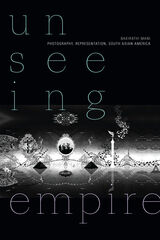 Unseeing Empire: Photography, Representation, South Asian America
Bakirathi Mani
Duke University Press, 2020 In Unseeing Empire Bakirathi Mani examines how empire continues to haunt South Asian American visual cultures. Weaving close readings of fine art together with archival research and ethnographic fieldwork at museums and galleries across South Asia and North America, Mani outlines the visual and affective relationships between South Asian diasporic artists, their photographic work, and their viewers. She notes that the desire for South Asian Americans to see visual representations of themselves is rooted in the use of photography as a form of colonial documentation and surveillance. She examines fine art photography by South Asian diasporic artists who employ aesthetic strategies such as duplication and alteration that run counter to viewers' demands for greater visibility. These works fail to deliver on viewers' desires to see themselves, producing instead feelings of alienation, estrangement, and loss. These feelings, Mani contends, allow viewers to question their own visibility as South Asian Americans in U.S. public culture and to reflect on their desires to be represented.
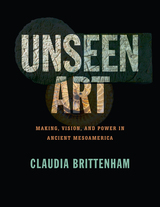 Unseen Art: Making, Vision, and Power in Ancient Mesoamerica
Claudia Brittenham
University of Texas Press, 2023 In Unseen Art, Claudia Brittenham unravels one of the most puzzling phenomena in Mesoamerican art history: why many of the objects that we view in museums today were once so difficult to see. She examines the importance that ancient Mesoamerican people assigned to the process of making and enlivening the things we now call art, as well as Mesoamerican understandings of sight as an especially godlike and elite power, in order to trace a gradual evolution in the uses of secrecy and concealment, from a communal practice that fostered social memory to a tool of imperial power. Addressing some of the most charismatic of all Mesoamerican sculptures, such as Olmec buried offerings, Maya lintels, and carvings on the undersides of Aztec sculptures, Brittenham shows that the creation of unseen art has important implications both for understanding status in ancient Mesoamerica and for analyzing art in the present. Spanning nearly three thousand years of the Indigenous art of Mexico, Guatemala, Honduras, and Belize, Unseen Art connects the dots between vision, power, and inequality, providing a critical perspective on our own way of looking.
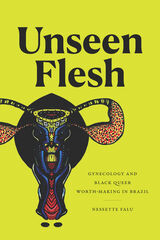 Unseen Flesh: Gynecology and Black Queer Worth-Making in Brazil
Nessette Falu
Duke University Press, 2023 In Unseen Flesh Nessette Falu explores how Black lesbians in Brazil define and sustain their well-being and self-worth against persistent racial, sexual, class, and gender-based prejudice. Focusing on the trauma caused by interactions with gynecologists, Falu draws on in-depth ethnographic work among the Black lesbian community to reveal their profoundly negative affective experiences within Brazil’s deeply biased medical system. In the face of such entrenched, intersectional intimate violence, Falu’s informants actively pursue well-being in ways that channel their struggle for self-worth toward broader goals of social change, self care, and communal action. Demonstrating how the racist and heteronormative underpinnings of gynecology erase Black lesbian subjecthood through mental, emotional, and physical traumas, Falu explores the daily resistance and abolitionist practices of worth-making that claim and sustain Black queer identity and living. Falu rethinks the medicalization of race, sex, and gender in Brazil and elsewhere while offering a new perspective on Black queer life through well-being grounded in relationships, socioeconomic struggles, the erotic, and freedom strivings.
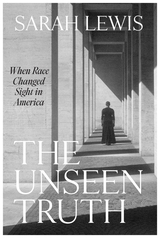 The Unseen Truth: When Race Changed Sight in America
Sarah Lewis
Harvard University Press, 2024 American Book Award Winner
Anisfield-Wolf Book Award Finalist
Chicago Tribune, 10 Best Books of the Year
A Hyperallergic Best Book of the Year
The award-winning art historian and founder of Vision & Justice uncovers a pivotal era in the story of race in the United States when Americans came to ignore the truth about the false foundations of the nation’s racial regime.
In a masterpiece of historical detective work, Sarah Lewis exposes one of the most damaging lies in American history. There was a time when Americans were confronted with the fictions shoring up the nation’s racial regime and learned to disregard them. The true significance of this hidden history has gone unseen—until now.
The surprising catalyst occurred in the nineteenth century when the Caucasian War—the fight for independence in the Caucasus that coincided with the end of the US Civil War—revealed the instability of the entire regime of racial domination. Images of the Caucasus region and peoples captivated the American public but also showed that the place from which we derive “Caucasian” for whiteness was not white at all. Cultural and political figures ranging from P. T. Barnum to Frederick Douglass, W. E. B. Du Bois to Woodrow Wilson recognized these fictions and more, exploiting, unmasking, critiquing, or burying them.
To acknowledge the falsehood at the core of racial order proved unthinkable, especially as Jim Crow and segregation took hold. Sight became a form of racial sculpture, vision a knife excising what no longer served the stability of racial hierarchy. That stability was shaped, crucially, by what was left out, what we have been conditioned not to see. Groundbreaking and profoundly resonant, The Unseen Truth shows how visual tactics have long secured our regime of racial hierarchy in spite of its false foundations—and offers a way to begin to dismantle it.
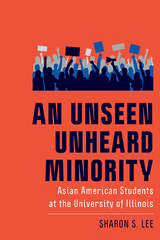 An Unseen Unheard Minority: Asian American Students at the University of Illinois
Sharon S. Lee
Rutgers University Press, 2022 Higher education hails Asian American students as model minorities who face no educational barriers given their purported cultural values of hard work and political passivity. Described as “over-represented,” Asian Americans have been overlooked in discussions about diversity; however, racial hostility continues to affect Asian American students, and they have actively challenged their invisibility in minority student discussions. This study details the history of Asian American student activism at the University of Illinois Urbana-Champaign, as students rejected the university’s definition of minority student needs that relied on a model minority myth, measures of under-representation, and a Black-White racial model, concepts that made them an “unseen unheard minority.” This activism led to the creation on campus of one of the largest Asian American Studies programs and Asian American cultural centers in the Midwest. Their histories reveal the limitations of understanding minority student needs solely along measures of under-representation and the realities of race for Asian American college students.
Unselfishness: The Role of the Vicarious Affects in Moral Philosophy and Social Theory
Nicholas Rescher
University of Pittsburgh Press, 1975 In Unselfishness, Nicholas Rescher criticizes the stance of many contemporary moral philosophers and social theorists-that rationality conflicts with morality, and instead defends the position of historical thinkers who believed that the worth of altruism is irreducible and that its rationalization does not require recourse to prudential self-interest. To support his position, Rescher provides detailed examples, and a theoretical critique of utilitarian morality.
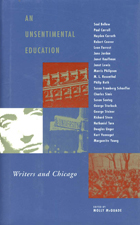 An Unsentimental Education: Writers and Chicago
Molly McQuade
University of Chicago Press, 1995 "Writers are both born and made, and their teachers share in the making of them, but in what ways?" Molly McQuade asks in An Unsentimental Education, a collection of candid interviews with twenty-one of our leading novelists and poets. Presented as first-person essays, the interviews are with contemporary writers who have studied, taught at, or cultivated other ties with the University of Chicago. The book provides an occasion for the writers to reflect on their Chicago experiences and on ideas about education in general. What education does a writer need? How can formal learning impel the writing life? What school stories or tales told out of school do Philip Roth, Hayden Carruth, Marguerite Young, George Steiner, Charles Simic, Susan Sontag, and Saul Bellow have in store and want to share.
Interviews with:Saul Bellow, Paul Carroll, Hayden Carruth, Robert Coover, Leon Forrest, June Jordan, Janet Kauffman, Morris Philipson, M. L. Rosenthal, Philip Roth, Susan Fromberg Shaeffer, Charles Simic, Susan Sontag, George Starbuck, George Steiner, Richard Stern, Nathaniel Tarn, Douglas Unger, Kurt Vonnegut, and Marguerite Young.
 Unsentimental Reformer: The Life of Josephine Shaw Lowell
Joan Waugh
Harvard University Press, 1997 If the poor are always with us, how we have perceived and treated them has changed like the seasons. Such was the massive and pitiless industrialization of the nation after the Civil War that Josephine Shaw Lowell (1843-1905) recoiled and sought a new way to approach poverty. She rationalized charity toward hapless families and children in ways that established social responsibility for the welfare of the poor. This introduction of "scientific" methods in social work bridged two great eras of social reform, creating a civic maternalism only denied in law in 1996.
A Brahmin, member of an illustrious family, sister of the martyred Robert Gould Shaw, who led his proud black troops against Fort Wagner, and, later, a war widow, Lowell constantly responded to changing ideological and economic conditions affecting the poor. From an emphasis on the regeneration of the individual, she soon showed an appreciation of the importance of social conditions.
This book challenges all previous interpretations of Lowell as a "genteel" reformer mostly interested in social control of the underclass. Rather, her aim was to cure pauperism, and her strategies eventually led her to support higher wages and full employment.
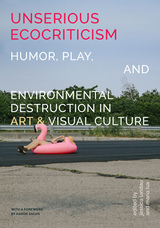 Unserious Ecocriticism: Humor, Play & Environmental Destruction in Art & Visual Culture
Edited by Jessica Landau and Maria Lux
Amherst College Press, 2026 Climate change, biodiversity loss, and environmental injustice are complex, messy, and gravely important issues. In addressing these concerns, traditional ecocriticism understandably has taken itself very seriously. Unserious Ecocriticism, by contrast, highlights alternative responses to the challenges of environmental collapse and catastrophe. By theorizing an unserious ecocriticism, the essays, artworks, and other contributions in this volume validate and empower alternatives to mainstream environmentalism, scholarship, and artmaking. The essays, artworks, and non-traditional scholarly formats of this edited collection demonstrate that the creative tools available to artists and those who study them are particularly well positioned to inventively disrupt normative modes of ecocritical presentation and environmentalist thought.
Rather than approach environmental crises through tragic and dire warnings, contributors take seriously the unexpected or easily dismissed, play with format and form, embrace the bodily and abject, take pleasure in their subjects of study, have fun, and crack jokes. In Unserious Ecocriticism, humor, playfulness, parody, and irreverence become tools to challenge expectations, cope with complicated problems, and imagine new futures.
Edited by Jessica Landau and Maria Lux, with a foreword by Aaron Sachs and contributions from Allie ES Wist, Deke Weaver, Kathleen McDermott, Annie Ronan, Kimiko Matsumura, Ina Linge, Paula Kupfer, Craig Carey, Anna Ialeggio, Topher Lineberry, Stentor Danielson, Patrick Gonder, Mathew Teti, Nicole Seymour, with Emily Eliza Scott, Rob Gioielli, and Jenny Price, Phaan Howng, and Jennifer Schell.
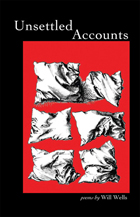 Unsettled Accounts: Poems
Will Wells
Ohio University Press, 2010 To take the mess of life and make meaning from it is what all poets seek to do. For Will Wells, recipient of the thirteenth annual Hollis Summers Poetry Prize, this includes reaching across centuries and continents, into the minds and hearts of disparate individuals—Albert Einstein, Andrea Yates, the traveler from Porlock, Dante, or Holocaust survivors, including his own grandmother—to extract the personal value embedded there for him. By turns funny, shocking, gentle, and musing, the poems of Unsettled Accounts reflect Will Wells’s constant attention to his environment and to his past—and to our environment and our past—and his persistent effort to keep them real and whole by turning them into art. Ping-Pong with the Nazis Bored couriers have kicked off boots and set
their pipes aside, a Dutch interior.
The slapped ball clacks over the table
like a telegraphic code, then trickles
like faint hope across the marble floor.
How quickly he bends to retrieve it
and puts it back in play, the Jewish boy
living with false papers in a villa
owned by his mother’s Gentile friends, and now
commandeered by retreating Germans
as divisional headquarters. The young
blond soldiers, deferential to a social
better, muss his blond locks like the kid
brothers back in the fatherland, like big
brothers steeped in genial menace.
He begs another game, so they relent.
As the ball resumes its chatter across
the no-man’s-land strung with a net,
he calculates the risk that each shot brings.
And so do they. He holds his pee and serves.
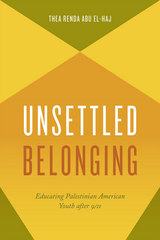 Unsettled Belonging: Educating Palestinian American Youth after 9/11
Thea Renda Abu El-Haj
University of Chicago Press, 2015 Unsettled Belonging tells the stories of young Palestinian Americans as they navigate and construct lives as American citizens. Following these youth throughout their school days, Thea Abu El-Haj examines citizenship as lived experience, dependent on various social, cultural, and political memberships. For them, she shows, life is characterized by a fundamental schism between their sense of transnational belonging and the exclusionary politics of routine American nationalism that ultimately cast them as impossible subjects.
Abu El-Haj explores the school as the primary site where young people from immigrant communities encounter the central discourses about what it means to be American. She illustrates the complex ways social identities are bound up with questions of belonging and citizenship, and she details the processes through which immigrant youth are racialized via everyday nationalistic practices. Finally, she raises a series of crucial questions about how we educate for active citizenship in contemporary times, when more and more people’s lives are shaped within transnational contexts. A compelling account of post-9/11 immigrant life, Unsettled Belonging is a steadfast look at the disjunctures of modern citizenship.
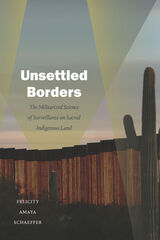 Unsettled Borders: The Militarized Science of Surveillance on Sacred Indigenous Land
Felicity Amaya Schaeffer
Duke University Press, 2022 In Unsettled Borders Felicity Amaya Schaeffer examines the ongoing settler colonial war over the US-Mexico border from the perspective of Apache, Tohono O’odham, and Maya who fight to protect their sacred land. Schaeffer traces the scientific and technological development of militarized border surveillance across time and space from Spanish colonial lookout points in Arizona and Mexico to the Indian wars, when the US cavalry hired Native scouts to track Apache fleeing into Mexico, to the occupation of the Tohono O’odham reservation and the recent launch of robotic bee swarms. Labeled “Optics Valley,” Arizona builds on a global history of violent dispossession and containment of Native peoples and migrants by branding itself as a profitable hub for surveillance. Schaeffer reverses the logic of borders by turning to Indigenous sacredsciences: ancestral land-based practices that are critical to reversing the ecological and social violence of surveillance, extraction, and occupation.
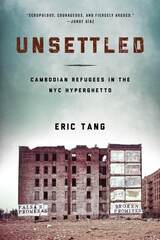 Unsettled: Cambodian Refugees in the New York City Hyperghetto
Eric Tang
Temple University Press, 2015 After surviving the Khmer Rouge genocide, followed by years of confinement to international refugee camps, as many as 10,000 Southeast Asian refugees arrived in the Bronx during the 1980s and ‘90s. Unsettled chronicles the unfinished odyssey of Bronx Cambodians, closely following one woman and her family for several years as they survive yet resist their literal insertion into concentrated Bronx poverty. Eric Tang tells the harrowing and inspiring stories of these refugees to make sense of how and why the displaced migrants have been resettled in the “hyperghetto.” He argues that refuge is never found, that rescue discourses mask a more profound urban reality characterized by racialized geographic enclosure, economic displacement and unrelenting poverty, and the criminalization of daily life. Unsettled views the hyperghetto as a site of extreme isolation, punishment, and confinement. The refugees remain captives in late-capitalist urban America. Tang ultimately asks: What does it mean for these Cambodians to resettle into this distinct time and space of slavery’s afterlife?
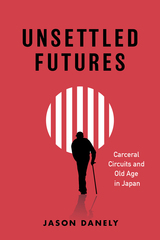 Unsettled Futures: Carceral Circuits and Old Age in Japan
Jason Danely
Vanderbilt University Press, 2024 There are two prevailing myths about Japanese society: first, that it has a successful elderly welfare system and second, that it has a successful criminal justice system. Both of these myths reinforce a social imaginary where cultural values of family and community harmony make extensive state intervention unnecessary. Yet not only are both of these myths and their arguments deeply flawed, but they also obscure the more troubling reality that institutions of welfare and punishment in Japan are co-extensive, both keeping Japan’s growing population of “excess” older people contained and controlled rather than providing ways for them to integrate and flourish.
Elderly ex-offenders are some of the most vulnerable and marginalized groups in Japan today, with high levels of poverty and homelessness, disability, mental health problems, and social isolation. Those with a history of incarceration and, by extension, their family, face stigma and discrimination that further erodes their ability to reintegrate and puts them at greater risk of reoffending. Unlike in any other country in the world, older people in Japan have a higher rate of reoffending than other age groups. In Unsettled Futures, author Jason Danely argues that we cannot dismiss these individuals merely as deviants; rather, their circumstances reveal deep contradictions in the overlapping terrain of welfare and punishment, and the precarity that forecloses on possibilities for older people to build a good life.
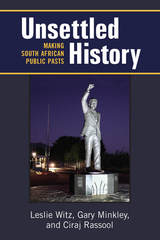 Unsettled History: Making South African Public Pasts
Leslie Witz, Gary Minkley, and Ciraj Rassool
University of Michigan Press, 2017 Unsettled History examines South African society and the construction and presentation of its public pasts, from Nelson Mandela’s release from prison in 1990 to South Africa’s hosting of the 2010 FIFA World Cup ®. Conventionally represented as a time of rectifying the silences and distortions of settler history through inclusion and recovery, the focus here instead is on the shifts in processes and locations of historicizing and the unsettled state of categories of framing history in post-apartheid South Africa. This era saw fundamental transformations in the order of knowledge: from the academy to the public; from popular history to public history; from history-as-lesson to history-as-forum.
Leslie Witz, Gary Minkley, and Ciraj Rassool take the reader to sites of historical production in which complex ideas about pasts are invoked, and navigate a path toward understanding the agencies of image-making and memory production. This volume is the outcome of the authors’ intensive collaborative research and engagement over twenty-five years on questions including the production and performance of apartheid history; the cultural politics of social history; South Africa’s Truth and Reconciliation Commission and practices of orality; tourism as an arena of image-making and historical construction; museums as sites of heritage production for a new South Africa; photographs, archival meanings, and the construction of the social documentary; and the centenary commemorations of the South African War and the making of race. The authors not only witnessed many of these instances of history-making but were also participants in their constitution.
 Unsettled Labors: Migrant Care Work in Palestine/Israel
Rachel H. Brown
Duke University Press, 2024 In Unsettled Labors, Rachel H. Brown explores the overlooked labor of migrant workers in Israel’s eldercare industry. Brown argues that live-in eldercare in Palestine/Israel, which is primarily done by migrant workers, is an often invisible area where settler colonialism is reproduced culturally, economically, and biologically. Situating Israeli labor markets within a longer history of imperialism and dispossession of Palestinian land, Brown positions migrant eldercare within the resulting tangle of Israeli laws, policies, and social discourses. She draws from interviews with caretakers, public statements, court documents, and first-hand fieldwork to uncover the inherently contradictory nature of elder care work: the intimate presence of South and Southeast Asian workers in the home unsettles the idea of the Israeli home as an exclusively Jewish space. By paying close attention to the comparative racialization of migrant workers, Palestinians, asylum seekers, and Mizrahi and Ashkenazi settlers, Brown raises important questions of labor, social reproduction, displacement, and citizenship told through the stories of collective care provided by migrant workers in a settler colonial state.
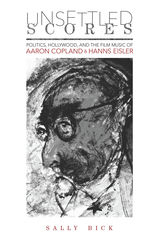 Unsettled Scores: Politics, Hollywood, and the Film Music of Aaron Copland and Hanns Eisler
Sally Bick
University of Illinois Press, 2019 The Hollywood careers of Aaron Copland and Hanns Eisler brought the composers and their high art sensibility into direct conflict with the premier producer of America's potent mass culture. Drawn by Hollywood's potential to reach—and edify—the public, Copland and Eisler expertly wove sophisticated musical ideas into Hollywood and, each in their own distinctive way, left an indelible mark on movie history. Sally Bick's dual study of Copland and Eisler pairs interpretations of their writings on film composing with a close examination of their first Hollywood projects: Copland's music for Of Mice and Men and Eisler's score for Hangmen Also Die! Bick illuminates the different ways the composers treated a film score as means of expressing their political ideas on society, capitalism, and the human condition. She also delves into Copland's and Eisler's often conflicted attempts to adapt their music to fit Hollywood's commercial demands, an enterprise that took place even as they wrote hostile critiques of the film industry.
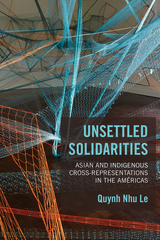 Unsettled Solidarities: Asian and Indigenous Cross-Representations in the Américas
Quynh Nhu Le
Temple University Press, 2019 Unsettled Solidarities examines contemporary Asian and Indigenous cross-representations within different settler states in the Américas. Quynh Nhu Le looks at literary works by both groups alongside public apologies, interviews, and hemispheric race theories to trace cross-community tensions and possibilities for solidarities amidst the uneven imposition of racialization and settler colonization. Contrasting texts such as Maxine Hong Kingston’s China Men with Gerald Vizenor’s Hiroshima Bugi, and Karen Tei Yamashita’s Through the Arc of the Rain Forest with Leslie Marmon Silko’s Almanac of the Dead, among others, Le reveals how settler colonialism persists through the liberal ideological structuring or incorporation of critical and political resistance. She illuminates the tense collisions of Asian and Indigenous movements from the heroic/warrior traditions, reparations and redress, and transnational/cross-racial mobilization against global capital to mixed-race narratives. Reading these tensions as formed through the unstable grammatical and emotional economies of liberalism, Le frames settler colonialism as a process that is invoked and yet ruptured by Asian and Indigenous peoples. In analyzing Asian/Indigenous crossings in the United States, Canada, Mexico, and Brazil, Unsettled Solidarities conveys the logics and instabilities that connect these settler empires.
 Unsettled Subjects: Restoring Feminist Politics to Poststructuralist Critique
Susan Lurie
Duke University Press, 1997 During the 1980s much of the work of feminist theory aimed to fully account for issues of class, race, and sexuality that previously had been overlooked. Susan Lurie argues that this work tended to privilege questions of race and class at the expense of gender, and frequently, if inadvertently, left patriarchal power unquestioned. Developing a feminist model that keeps multiple political forces in view, Lurie returns to three literary feminists from earlier parts of the century: Ellen Glasgow, Zora Neale Hurston, and Elizabeth Bishop. As Lurie argues, each of these women shows that both resistance to male domination and alliances between different oppositional politics rely on recognizing how power regulates a subject’s multiple beliefs.
In her analysis, Lurie traces each author’s strategies for revealing and challenging the ways that patriarchal gender ideology profits from what is always plural and contested female subjectivity. Only such an inquiry, Lurie demonstrates, can explain the impasses that have steered poststructuralist feminism away from gender as a category of analysis and can point toward the models necessary for a more complete feminist critique of patriarchal power.
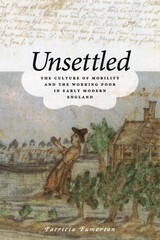 Unsettled: The Culture of Mobility and the Working Poor in Early Modern England
Patricia Fumerton
University of Chicago Press, 2006 Migrants made up a growing class of workers in late sixteenth- and seventeenth- century England. In fact, by 1650, half of England’s rural population consisted of homeless and itinerant laborers. Unsettled is an ambitious attempt to reconstruct the everyday lives of these dispossessed people. Patricia Fumerton offers an expansive portrait of unsettledness in early modern England that includes the homeless and housed alike. Fumerton begins by building on recent studies of vagrancy, poverty, and servants, placing all in the light of a new domestic economy of mobility. She then looks at representations of the vagrant in a variety of pamphlets and literature of the period. Since seamen were a particularly large and prominent class of mobile wage-laborers in the seventeenth century, Fumerton turns to seamen generally and to an individual poor seaman as a case study of the unsettled subject: Edward Barlow (b. 1642) provides a rare opportunity to see how the laboring poor fashioned themselves, for he authored a journal of over 225,000 words and 147 pages of drawings. Barlow’s journal, studied extensively here for the first time, vividly charts what he himself termed his “unsettled mind” and the perpetual anxieties of England’s working and wayfaring poor. Ultimately, Fumerton explores representations of seamen as unsettled in the broadside ballads of Barlow’s time.
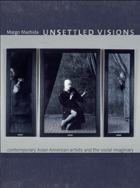 Unsettled Visions: Contemporary Asian American Artists and the Social Imaginary
Margo Machida
Duke University Press, 2008 In Unsettled Visions, the activist, curator, and scholar Margo Machida presents a pioneering, in-depth exploration of contemporary Asian American visual art. Machida focuses on works produced during the watershed 1990s, when surging Asian immigration had significantly altered the demographic, cultural, and political contours of Asian America, and a renaissance in Asian American art and visual culture was well underway. Machida conducted extensive interviews with ten artists working during this transformative period: women and men of Chinese, Filipino, Indian, Vietnamese, Korean, and Japanese descent, most of whom migrated to the United States. In dialogue with the artists, Machida illuminates and contextualizes the origins of and intent behind bodies of their work. Unsettled Visions is an engrossing look at a vital art scene and a subtle account of the multiple, shifting meanings of “Asianness” in Asian American art. Analyses of the work of individual artists are grouped around three major themes that Asian American artists engaged with during the 1990s: representations of the Other; social memory and trauma; and migration, diaspora, and sense of place. Machida considers the work of the photographers Pipo Nguyen-duy and Hanh Thi Pham, the printmaker and sculptor Zarina Hashmi, and installations by the artists Tomie Arai, Ming Fay, and Yong Soon Min. She examines the work of Marlon Fuentes, whose films and photographs play with the stereotyping conventions of visual anthropology, and prints in which Allan deSouza addresses the persistence of Orientalism in American popular culture. Machida reflects on Kristine Aono’s museum installations embodying the multigenerational effects of the internment of Japanese Americans during World War II and on Y. David Chung’s representations of urban spaces transformed by migration in works ranging from large-scale charcoal drawings to multimedia installations and an “electronic rap opera.”
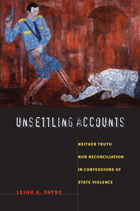 Unsettling Accounts: Neither Truth nor Reconciliation in Confessions of State Violence
Leigh A. Payne
Duke University Press, 2008 An Argentine naval officer remorsefully admits that he killed thirty people during Argentina’s Dirty War. A member of General Augusto Pinochet’s intelligence service reveals on a television show that he took sadistic pleasure in the sexual torture of women in clandestine prisons. A Brazilian military officer draws on his own experiences to write a novel describing the military’s involvement in a massacre during the 1970s. The head of a police death squad refuses to become the scapegoat for apartheid-era violence in South Africa; he begins to name names and provide details of past atrocities to the Truth Commission. Focusing on these and other confessions to acts of authoritarian state violence, Leigh A. Payne asks what happens when perpetrators publicly admit or discuss their actions. While mechanisms such as South Africa’s Truth and Reconciliation Commission are touted as means of settling accounts with the past, Payne contends that public confessions do not settle the past. They are unsettling by nature. Rather than reconcile past violence, they catalyze contentious debate. She argues that this debate—and the public confessions that trigger it—are healthy for democratic processes of political participation, freedom of expression, and the contestation of political ideas. Payne draws on interviews, unedited television film, newspaper archives, and books written by perpetrators to analyze confessions of state violence in Argentina, Chile, Brazil, and South Africa. Each of these four countries addressed its past through a different institutional form—from blanket amnesty, to conditional amnesty based on confessions, to judicial trials. Payne considers perpetrators’ confessions as performance, examining what they say and what they communicate nonverbally; the timing, setting, and reception of their confessions; and the different ways that they portray their pasts, whether in terms of remorse, heroism, denial, or sadism, or through lies or betrayal.
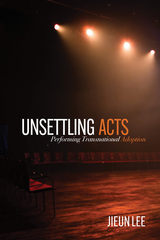 Unsettling Acts: Performing Transnational Adoption
Jieun Lee
Ohio State University Press, 2025 Analyzing contemporary theater and performance works about Korean transnational adoption, Jieun Lee’s Unsettling Acts: Performing Transnational Adoption challenges longstanding ideas about adoption. Lee contends that in staging adoptees’ birth family searches and reunions, theater and performance artists unsettle dominant discourses that have essentialized adoptees through ethnonationalist, gendered, and postwar humanitarian narratives in both birth and adoptive cultures. In doing so, Lee reveals how these performances engage in acts of disavowal of and resistance to mythologies of adoption and adoptee experience.
Lee examines twelve works—from South Korea, the United States, the United Kingdom, Belgium, and Denmark—including plays, musicals, solo performances, community-based theater, and performance art. Through her analysis, theater and performance become a means for reimagining adoptees’ identity, kinship, and sense of belonging. Further, these pieces encourage critical exploration of the history, politics, and social impacts of Korean transnational adoption. These works thus nurture a countermemory to engender redressive accountability and transpacific justice, pointing a way forward for remaking the transnational adoptee experience in the twenty-first century.
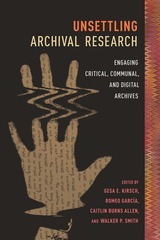 Unsettling Archival Research: Engaging Critical, Communal, and Digital Archives
Edited by Gesa E. Kirsch, Romeo García, Caitlin Burns Allen, and Walker P. Smith
Southern Illinois University Press, 2023 HONORABLE MENTION, 2024 Conference on College Composition and Communication Outstanding Book Award in Edited Collection!
A collection of accessible, interdisciplinary essays that explore archival practices to unsettle traditional archival theories and methodologies.
What would it mean to unsettle the archives? How can we better see the wounded and wounding places and histories that produce absence and silence in the name of progress and knowledge? Unsettling Archival Research sets out to answer these urgent questions and more, with essays that chart a more just path for archival work.
Unsettling Archival Research is one of the first publications in rhetoric and writing studies dedicated to scholarship that unsettles disciplinary knowledge of archival research by drawing on decolonial, Indigenous, antiracist, queer, and community perspectives. Written by established and emerging scholars, essays critique not only the practices, ideologies, and conventions of archiving, but also offer new tactics for engaging critical, communal, and digital archiving within and against systems of power. Contributors reflect on efforts to unsettle and counteract racist, colonial histories, confront the potentials and pitfalls of common archival methodologies, and chart a path for the future of archival research otherwise. Unsettling Archival Research intervenes in a critical issue: whether the discipline’s assumptions about the archives serve or fail the communities they aim to represent and what can be done to center missing voices and perspectives. The aim is to explore the ethos and praxis of bearing witness in unsettling ways, carried out as a project of queering and/or decolonizing the archives.
Unsettling Archival Research takes seriously the rhetorical force of place and wrestles honestly with histories that still haunt our nation, including the legacies of slavery, colonial violence, and systemic racism.
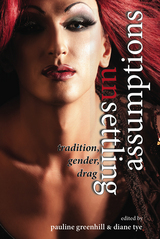 Unsettling Assumptions: Tradition, Gender, Drag
Pauline Greenhill
Utah State University Press, 2014 In Unsettling Assumptions, editors Pauline Greenhill and Diane Tye examine how tradition and gender come together to unsettle assumptions about culture and its study.
Contributors explore the intersections of traditional expressive culture and sex/gender systems to question, investigate, or upset concepts like family, ethics, and authenticity. Individual essays consider myriad topics such as Thanksgiving turkeys, rockabilly and bar fights, Chinese tales of female ghosts, selkie stories, a noisy Mennonite New Year’s celebration, the Distaff Gospels, Kentucky tobacco farmers, international adoptions, and more.
In Unsettling Assumptions, folkloric forms express but also counteract negative aspects of culture like misogyny, homophobia, and racism. But expressive culture also emerges as fundamental to our sense of belonging to a family, an occupation, or friendship group and, most notably, to identity performativity and the construction and negotiation of power.
 Unsettling Blackness, Volume 72
Houston A. Baker Jr.
Duke University Press This special issue of American Literature transcends the old debates surrounding black expressive culture and reexamines major African American texts through the lenses of modernism, progressivism, architecture, avant-gardism, hybridity, and Continental theory. With this arsenal of critical and theoretical tools, the scholars here declare that the concept of "blackness" is agile and dynamic, both unsettled and unsettling.
Articles in this issue address topics as rich and varied as the friendship between Richard Wright and Ralph Ellison; hybridity, montage, and the avant-garde in the works of Jean Toomer; and the interplay of eugenics and racial uplift in W. E. B. DuBois’s Crisis. One piece explores Langston Hughes’s use of bebop in Montage, and another considers the ways in which James Weldon Johnson’s Autobiography of an Ex-Coloured Man challenges assumptions about black music and its relationship to the "classics." The collection moves into a discussion of physical space when Arlene Keizer assesses Carolivia Herron’s Thereafter Johnnie, a novel in which the geography and architecture of Washington, D.C. construct as well as express the slave-owning, patriarchal culture.
Unsettling Blackness would be a valuable addition to the syllabus of any course grappling with the galaxy of issues surrounding African American literature and culture.
 Unsettling Brazil: Urban Indigenous and Black Peoples' Resistances to Dependent Settler Capitalism
Desirée Poets
University of Alabama Press Analyzes favela, quilombola, and indigenous communities’ responses to settler colonialism in urban Brazil. Based on ethnographic research and her experiences growing up in Brazil, the author tells the stories of communities in Rio de Janeiro, São Paulo, and Belo Horizonte
Unsettling Brazil offers a powerful account of five urban Indigenous and Black communities and movements in Brazil that illuminates their struggle for land, dignity, and their ways of life amid historic and ongoing settler colonialism, marked by militarization and dependent capitalist development. The in-depth case studies are the Indigenous movement Aldeia Maracanã and the quilombola community Sacopã in Rio, the Quilombo dos Luízes in Belo Horizonte, the Indigenous movement behind the Pindorama scholarship program in São Paulo, and the Complexo da Maré favela in Rio. For each, Poets vividly documents the intersectional and transnational structures of power that perpetuate the erasure, dispossession, and exploitation of nonwhite populations and the creative ways that Black and Indigenous communities have mobilized to unsettle these structures. Drawing on the knowledge produced by Black and Indigenous organizers and thinkers, Poets argues for an interdisciplinary framework that prioritizes the voices and experiences of these communities. Addressing increasingly salient calls for decolonization, Poets ponders the paradoxical role of rights, citizenship, and the state in the fight for freedom and justice. Unsettling Brazil urges readers to confront the uncomfortable truths about the nation's history and stands in solidarity with those fighting to reclaim their heritage, identity, and land.
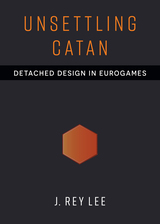 Unsettling Catan: Detached Design in Eurogames
J. Rey Lee
University of Michigan Press, 2025 Most revolutions don’t start with nineteen cardboard hexagons, but Klaus Teuber’s game about settling a hexagonal island quietly revolutionized boardgaming. Catan’s commercial success selling over 40 million copies certainly catalyzed a modern boardgaming boom. More importantly, its playful experiments set a new tone for game design. By making its cutthroat gameplay feel peaceful and pastoral, Catan helped a fledgling eurogame tradition forge its distinctive style and was heralded by Wired for “changing the American idea of what a board game can be.”
Although peaceful revolutions are usually the best kind, it’s worth questioning how these games cultivate peaceful feelings. Today, peaceful-feeling eurogames often settle into detached design—a mindset of making conflict feel peaceful by dampening conflicted feelings. Unsettling Catan questions how peaceful-feeling eurogames can make implicitly imperialist themes palatable by cultivating a detached mindset that imagines power as peaceful, neutral, and abstract. To ask the hard questions that eurogames often look away from, the book walks through each aspect of Catan’s gameplay (placing hexes, rolling the dice, robbing and trading, collecting resources, building and scoring) to explore how simple design decisions can play out, or play with, cultural ideas and ideals. As the first entry in the Tabletop Games book series, Unsettling Catan introduces key concepts for thinking about board games as a medium and offers accessible game analyses and personal reflections to help players, creators, and scholars reimagine what board games can be and become.
 Unsettling Choice: Race, Rights, and the Partitioning of Public Education
Ujju Aggarwal
University of Minnesota Press, 2024 How the Great Recession revealed a system of school choice built on crisis, precarity, and exclusion What do universal rights to public goods like education mean when codified as individual, private choices? Is the “problem” of school choice actually not about better choices for all but, rather, about the competition and exclusion that choice engenders—guaranteeing a system of winners and losers? Unsettling Choice addresses such questions through a compelling ethnography that illuminates how one path of neoliberal restructuring in the United States emerged in tandem with, and in response to, the Civil Rights movement. Drawing on ethnographic research in one New York City school district, Unsettling Choice traces the contestations that surfaced when, in the wake of the 2007–2009 Great Recession, public schools navigated austerity by expanding choice-based programs. Ujju Aggarwal argues that this strategy, positioned as “saving public schools,” mobilized mechanisms rooted in market logics to recruit families with economic capital on their side, thereby solidifying a public sphere that increasingly resembled the private—where contingency was anticipated and rights for some were marked by intensified precarity for poor and working-class Black and Latinx families. As Unsettling Choice shows, these struggles over public schools—one of the last remaining universal public goods in the United States—were entrapped within neoliberal regimes that exceeded privatization and ensured exclusion even as they were couched in language of equity, diversity, care, and rights. And yet this richly detailed and engaging book also tracks an architecture of expansive rights, care, and belonging built among poor and working-class parents at a Head Start center, whose critique of choice helps us understand how we might struggle for—and reimagine—justice, and a public that remains to be won. Retail e-book files for this title are screen-reader friendly with images accompanied by short alt text and/or extended descriptions.
Unsettling History: Archiving and Narrating in Historiography
Edited by Sebastian Jobs and Alf Lüdtke
Campus Verlag, 2010 In recent decades, scholars working in postcolonial history have successfully challenged the primacy of Western historiography and its Eurocentric worldview. With Unsettling History, a group of historians extend that challenge to two central components of work in history: archiving and narrating. Archival resources, they argue, despite their air of impartiality, are the product of established interests and subject to various practices of selection, cataloguing, and preservation. Narrating, too, is more complicated than it might at first seem, especially as the range of genres available to the historians for presenting their findings has expanded in recent years.
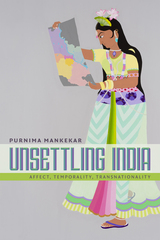 Unsettling India: Affect, Temporality, Transnationality
Purnima Mankekar
Duke University Press, 2015 In Unsettling India, Purnima Mankekar offers a new understanding of the affective and temporal dimensions of how India and “Indianness,” as objects of knowledge production and mediation, circulate through transnational public cultures. Based on over a decade of ethnographic fieldwork in New Delhi and the San Francisco Bay Area, Mankekar tracks the sense of unsettlement experienced by her informants in both places, disrupting binary conceptions of homeland and diaspora, and the national and transnational. She examines Bollywood films, Hindi TV shows, advertisements, and such commodities as Indian groceries as interconnected nodes in the circulation of transnational public cultures that continually reconfigure affective connections to India and what it means to be Indian, both within the country and outside. Drawing on media and cultural studies, feminist anthropology, and Asian/Asian American studies, this book deploys unsettlement as an analytic to trace modes of belonging and not-belonging.
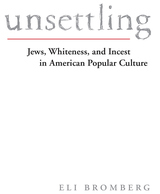 Unsettling: Jews, Whiteness, and Incest in American Popular Culture
Eli Bromberg
Rutgers University Press, 2021 By analyzing how various media told stories about Jewish celebrities and incest, Unsettling illustrates how Jewish community protective politics impacted the representation of white male Jewish masculinity in the 1990s. Chapters on Woody Allen, Roseanne Barr, and Henry Roth demonstrate how media coverage of their respective incest denials (Allen), allegations (Barr), and confessions (Roth) intersect with a history of sexual antisemitism, while an introductory chapter on Jewish second-wave feminist criticism of Sigmund Freud considers how Freud became “white” in these discussions. Unsettling reveals how film, TV, and literature have helped displace once prevalent antisemitic stereotypes onto those who are non-Jewish, nonwhite, and poor. In considering how whiteness functions for an ethnoreligious group with historic vulnerability to incest stereotype as well as contemporary white privilege, Unsettling demonstrates how white Jewish men accused of incest, and even those who defiantly confess it, became improbably sympathetic figures representing supposed white male vulnerability.
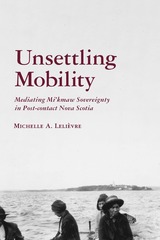 Unsettling Mobility: Mediating Mi’kmaw Sovereignty in Post-contact Nova Scotia
Michelle A. Lelièvre
University of Arizona Press, 2017 Since contact, attempts by institutions such as the British Crown and the Catholic Church to assimilate indigenous peoples have served to mark those people as “Other” than the settler majority. In Unsettling Mobility, Michelle A. Lelièvre examines how mobility has complicated, disrupted, and—at times—served this contradiction at the core of the settler colonial project. Drawing on archaeological, ethnographic, and archival fieldwork conducted with the Pictou Landing First Nation—one of thirteen Mi’kmaw communities in Nova Scotia—Lelièvre argues that, for the British Crown and the Catholic Church, mobility has been required not only for the settlement of the colony but also for the management and conversion of the Mi’kmaq. For the Mi’kmaq, their continued mobility has served as a demonstration of sovereignty over their ancestral lands and waters despite the encroachment of European settlers. Unsettling Mobility demonstrates the need for an anthropological theory of mobility that considers not only how people move from one place to another but also the values associated with such movements, and the sensual perceptions experienced by moving subjects. Unsettling Mobility argues that anthropologists, indigenous scholars, and policy makers must imagine settlement beyond sedentism. Rather, both mobile and sedentary practices, the narratives associated with those practices, and the embodied experiences of them contribute to how people make places—in other words, to how they settle. Unsettling Mobility arrives at a moment when indigenous peoples in North America are increasingly using movement as a form of protest in ways that not only assert their political subjectivity but also remake the nature of that subjectivity.
Unsettling Obligations: Essays on Reason, Reality and the Ethics of Belief
Allen W. Wood
CSLI, 2002 Should we hold beliefs only insofar as they are rationally supportable? According to Allen W. Wood, we're morally obliged to do so—and yet how does this apply to religious beliefs? Unsettling Obligations examines these and related ethical and philosophical issues, taking and defending stances on many of them. Along with the theme of belief and evidence, other topics include a historical perspective of philosophy based on the Enlightenment rationalist tradition and a study of how our practical commitments help define truth and value.
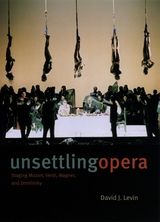 Unsettling Opera: Staging Mozart, Verdi, Wagner, and Zemlinsky
David J. Levin
University of Chicago Press, 2007 What happens when operas that are comfortably ensconced in the canon are thoroughly rethought and radically recast on stage? What does a staging do to our understanding of an opera, and of opera generally? While a stage production can disrupt a work that was thought to be established, David J. Levin here argues that the genre of opera is itself unsettled, and that the performance of operas, at its best, clarifies this condition by bringing opera’s restlessness and volatility to life.
Unsettling Opera explores a variety of fields, considering questions of operatic textuality, dramaturgical practice, and performance theory. Levin opens with a brief history of opera production, opera studies, and dramatic composition, and goes on to consider in detail various productions of the works of Wagner, Mozart, Verdi, and Alexander Zemlinsky. Ultimately, the book seeks to initiate a dialogue between scholars of music, literature, and performance by addressing questions raised in each field in a manner that influences them all.
 Unsettling Queer Anthropology: Foundations, Reorientations, and Departures
Margot Weiss, editor
Duke University Press, 2024 This field-defining volume of queer anthropology foregrounds both the brilliance of anthropological approaches to queer and trans life and the ways queer critique can reorient and transform anthropology. Consisting of fourteen original essays by both distinguished and new voices, Unsettling Queer Anthropology advances a vision of queer anthropology grounded in decolonial, abolitionist, Black feminist, transnational, postcolonial, Indigenous, and queer of color approaches. Critically assessing both anthropology’s queer innovations and its colonialist legacies, contributors highlight decades of work in queer anthropology; challenge the boundaries of anthropology’s traditional methodologies, forms, and objects of study; and forge a critical, queer of color, decolonizing queer anthropology that unsettles anthropology’s normative epistemologies. At a moment of revitalized calls to reckon with the white supremacist and settler colonial logics that continue to shape anthropology, this volume advances an anthropology accountable to the vitality of queer and trans life.
Contributors. Jafari Sinclair Allen, Tom Boellstorff, Erin L. Durban, Elijah Adiv Edelman, Lyndon K. Gill, K. Marshall Green, Brian A. Horton, Nikki Lane, Martin F. Manalansan IV, Shaka McGlotten, Scott L. Morgensen, Kwame Otu, Juno Salazar Parreñas, Lucinda Ramberg, Sima Shakhsari, Savannah Shange, Anne Spice, Margot Weiss, Ara Wilson
 Unsettling Scripture: Iroquois and the Book of Mormon
Thomas W Murphy
University of Utah Press, 2025 A groundbreaking exploration of the unexpected intersections between Haudenosaunee oral tradition and Latter-day Saint scripture
In Unsettling Scripture: Iroquois and the Book of Mormon, anthropologist Thomas W Murphy delves into the visions of Seneca prophet Handsome Lake, the epic narratives of the Iroquois Confederacy, and the origin story of the Book of Mormon, revealing surprising parallels between Indigenous and Mormon traditions.
Through ethnohistorical research and decolonizing methodologies, Murphy reexamines how both communities understand their origins, faith, and prophecy. From Handsome Lake’s revelations to Joseph Smith’s seer stone, from ancient sibling rivalries to the Great Peace, this book unsettles traditional narratives while opening new conversations on scripture, identity, and cultural exchange. Drawing from living Indigenous voices, Unsettling Scripture challenges readers to rethink sacred texts and the histories they tell.
Unsettling 'Sensation': Arts Policy Lessons from the Brooklyn Museum of Art Controversy
Rothfield, Lawrence
Rutgers University Press, 2001 In September 1999, Sensation, an exhibition at the Brooklyn Museum of Art, opened its doors, igniting a controversy that would rage for many months in the world's art capital. This collection of cutting-edge art from the Saatchi collection in England, and the museum's arrangements with Charles Saatchi to finance the show, so offended New York City mayor Rudolph Giuliani that he attempted to shut the museum down by withholding city funds that are crucially needed by that institution. Only a legal ruling prevented him from doing so. Like the Robert Mapplethorpe exhibition before it,Sensation once again raises questions about public spending for "controversial" art, but with the added dimension of religious conflict, animal rights, and charges of commercialization.
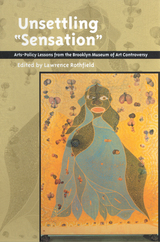 Unsettling 'Sensation': Arts-Policy Lessons from the Brooklyn Museum of Art Controversy
Rothfield, Lawrence
Rutgers University Press, 2001 In September 1999, Sensation, an exhibition at the Brooklyn Museum, opened its doors, igniting a controversy still burning in the art world. This collection of cutting-edge art from the Saatchi collection in England, and the museum’s arrangements with Charles Saatchi to finance the show, so offended New York City mayor Rudolph Giuliani that he attempted to shut the museum down by withholding city funds that are crucially needed by that institution. Only a legal ruling prevented him from doing so. Like the Robert Mapplethorpe exhibition before it, Sensation once again raises questions about public spending for “controversial” art, but with the added dimension of religious conflict and charges of commercialization.
The contributors to this volume use the Sensation exhibition as a stepping-stone to analyze larger questions such as the authority the government has to withhold funds, various interpretations of the First Amendment, how to respect divergent cultural and religious values; and the economic stake of museums and dealers in art. In their articles—written expressly for this volume, and spanning the disciplines of law, cultural studies, public policy, and art—the contributors consider issues at the center of arts policy. They propose various legal strategies, curatorial practices, and standards of doing business intended to serve the public interest in the arts.
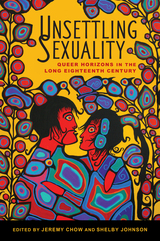 Unsettling Sexuality: Queer Horizons in the Long Eighteenth Century
Jeremy Chow
University of Delaware Press, 2025 This book is also freely available online as an open access digital edition on Manifold, here: https://openpub.udel.edu/projects/unsettling-sexuality. Unsettling Sexuality: Queer Horizons in the Long Eighteenth Century challenges the traditional ways that scholarship has approached sexuality, gender nonconformity, and sex (as well as its absence) in the long eighteenth century. Drawing from recent and emerging criticisms in Middle Eastern and Asian studies, Black studies, and Native American and Indigenous studies, the collected authors perform intersectional queer readings, reimagine queer historiographic methods, and spearhead new citational models that can invigorate the field. Contributors read with and against diverse European, transatlantic, and global archives to explore mutually informative frameworks of gender, sexuality, race, indigeneity, ability, and class. In charting multidirectional queer horizons, this collection locates new prospective desires and intimacies in the literature, culture, and media of the period to imagine new directions and simultaneously unsettle eighteenth-century studies.
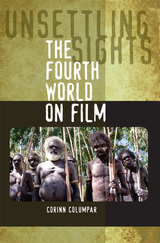 Unsettling Sights: The Fourth World on Film
Corinn Columpar
Southern Illinois University Press, 2010 Unsettling Sights: The Fourth World on Film examines the politics of representing Aboriginality, in the process bringing frequently marginalized voices and visions, issues and debates into the limelight. Corinn Columpar uses film theory, postcolonial theory, and Indigenous theory to frame her discussion of the cinematic construction and transnational circulation of Aboriginality. The result is a broad interdisciplinary analysis of how Indigeneity is represented in cinema, supported by more than twenty rigorous and theoretically informed case studies of contemporary feature films by both First- and Fourth-World filmmakers in the United States, Canada, New Zealand, and Australia. Columpar relies heavily on textual analysis of the films but also explores contextual issues in filmmaking such as funding, personnel, modes of production, and means of distribution. Part one of Unsettling Sights focuses on contact narratives in which the Aboriginal subject is constructed in reactive response to a colonizing or invading presence. Films such as The Piano and The Proposition, wherein a white man “goes native,” and The New World and Map of the Human Heart, which approach contact from the perspective of an Aboriginal character, serve as occasions to examine the ways in which Aboriginal identities are negotiated within dominant cinema. Part two shifts the focus from contact narratives to films that seek to define Aboriginality on its own terms, with reference to a (lost) homeland and/or Indigenous practices of (hi)story-telling: while texts such as Once Were Warriors and Smoke Signals foster an engagement with issues of deterritorialization, relocation, and urbanization, discussion of beDevil, Atanarjuat, and The Business of Fancydancing, among others,bring questions of voice, translation, and the relationship between cinema and oral tradition to the forefront. Unsettling Sights is the first significant, scholarly examination of Aboriginality and cinema in an international context and will be invaluable to scholars and students in many fields including cinema studies, anthropology, critical race studies, cultural studies, and postcolonial studies.
Unsettling Statecraft: Democracy and Neoliberalism in the Central Andes
Catherine M Conaghan
University of Pittsburgh Press, 1995 Latin America in the 1980s was marked by the transition to democracy and a turn toward economic orthodoxy. Unsettling Statecraft analyzes this transition in Bolivia, Ecuador, and Peru, focusing on the political dynamics underlying change and the many disturbing tendencies at work as these countries shed military authoritarianism for civilian rule.
Conaghan and Malloy draw on insights from the political economy literature, viewing policy making as a “historically conditioned” process, and they conclude that the disturbing tendencies their research reveals are not due to regional pathology but are part of the more general experience of postmodern democracy.
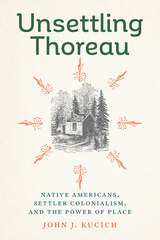 Unsettling Thoreau: Native Americans, Settler Colonialism, and the Power of Place
John J. Kucich
University of Massachusetts Press, 2024 Finalist for the 2025 New England Society Book Awards
Henry David Thoreau’s life-long fascination with Native Americans is widely known and a recurring topic of interest, and it is also a source of modern debate. This is a figure who both had a deep interest in Native American history and culture and was seen by many of his contemporaries, including Ralph Waldo Emerson and Nathaniel Hawthorne, as “more like an Indian” than his white neighbors. At the same time, Thoreau did little to protest the systematic dispossession of Indigenous people across the country in his lifetime. John J. Kucich charges into this contradiction, considering how Thoreau could demonstrate deep respect for Native American beliefs on one hand and remain largely silent about their genocide, actively happening throughout his life, on the other. Thoreau’s long study of Native peoples, as reflected in so much of his writing, allowed him to glimpse an Indigenous worldview, but it never fully freed him from the blind spots of settler colonialism.
Drawing on Indigenous studies and critiques of settler colonialism, as well as new materialist approaches that illustrate Thoreau’s radical reimagining of the relationship between humans and the natural world, Unsettling Thoreau explores the stakes of Thoreau’s effort to live mindfully and ethically in place when living alongside, or replacing marginalized peoples. By examining the whole scope of his writings, including the unpublished Indian Notebooks, and placing them alongside Native writers and communities in and beyond New England, this book gauges Thoreau’s effort to use Indigenous knowledge to reimagine a settler colonial world, without removing him from its trappings.
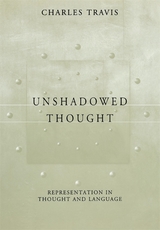 Unshadowed Thought: Representation in Thought and Language
Charles Travis
Harvard University Press, 2000 This book mounts a sustained attack on ideas that are dear to many practitioners of analytic philosophy. Charles Travis targets the seductive illusion that—in Wittgenstein’s terms—“if anyone utters a sentence and means or understands it, he is operating a calculus according to definite rules.” This book rejects the idea that thoughts are essentially representational items whose content is independent of context. In doing so, it undermines the foundations of much contemporary philosophy of mind.
Travis’s main argument in Unshadowed Thought is that linguistic expressions and forms are occasion-sensitive; they cannot be abstracted out of a concrete context. With compelling examples and a thoroughgoing scrutiny of opposing positions, his book systematically works out the implications of the work of J. L. Austin, Hilary Putnam, and John McDowell. Eloquently insisting that there is no particular way one must structure what one relates to, no one way one must represent it, Unshadowed Thought identifies and resists a certain strain of semantic Platonism that permeates current philosophy—a strain that has had profoundly troubling consequences for our ideas about attitudes and beliefs and for our views about what language might be.
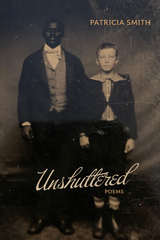 Unshuttered: Poems
Patricia Smith
Northwestern University Press, 2023 An award-winning author presents a portrait of Black America in the nineteenth century
Over the course of two decades, award-winning poet Patricia Smith has amassed a collection of rare nineteenth-century photographs of Black men, women, and children who, in these pages, regard us from the staggering distance of time. Unshuttered is a vessel for the voices of their incendiary and critical era. Smith’s searing stanzas and revelatory language imbue the subjects of the photos with dynamism and revived urgency while she explores how her own past of triumphs and losses is linked inextricably to their long-ago lives: We ache for fiction etched in black and white. Our eyes never touch. These tragic grays and bustles, mourners’
hats plopped high upon our tamed but tangled crowns, strain to disguise what yearning does with us. The poet’s unrivaled dexterity with dramatic monologue and poetic form reanimates these countenances, staring back from such yesterdays, and the stories they may have told. This is one of American literature’s finest wordsmiths doing what she does best—unreeling history to find its fierce and formidable lyric.
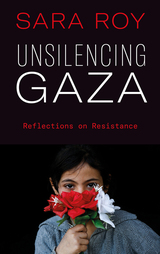 Unsilencing Gaza: Reflections on Resistance
Sara Roy
Pluto Press, 2021 'Roy is humanely and professionally committed in ways that are unmatched by any other non-Palestinian scholar' - Edward W. Said
Gaza, the centre of Palestinian nationalism and resistance to the occupation, is the linchpin of the Israeli-Palestinian conflict and the key to its resolution. Since 2005, Israel has deepened the isolation of the territory, severing it almost completely from its most vital connections to the West Bank, Israel and beyond, and has deliberately shattered its economy, transforming Palestinians from a people with political rights into a humanitarian problem.
Sara Roy unpacks this process, looking at US foreign policy towards the Palestinians, as well as analysing the trajectory of Israeli policy toward Gaza, which became a series of punitive approaches meant not only to contain the Hamas regime but weaken Gazan society.
Roy also reflects on Gaza's ruination from a Jewish perspective and discusses the connections between Gaza's history and her own as a child of Holocaust survivors. This book, a follow up from the renowned Failing Peace, comes from one of the world's most acclaimed writers on the region.
 Unsilencing Gaza: Reflections on Resistance
Sara Roy
Pluto Press, 2021 'Roy is humanely and professionally committed in ways that are unmatched by any other non-Palestinian scholar' - Edward W. Said
Gaza, the centre of Palestinian nationalism and resistance to the occupation, is the linchpin of the Israeli-Palestinian conflict and the key to its resolution. Since 2005, Israel has deepened the isolation of the territory, severing it almost completely from its most vital connections to the West Bank, Israel and beyond, and has deliberately shattered its economy, transforming Palestinians from a people with political rights into a humanitarian problem.
Sara Roy unpacks this process, looking at US foreign policy towards the Palestinians, as well as analysing the trajectory of Israeli policy toward Gaza, which became a series of punitive approaches meant not only to contain the Hamas regime but weaken Gazan society.
Roy also reflects on Gaza's ruination from a Jewish perspective and discusses the connections between Gaza's history and her own as a child of Holocaust survivors. This book, a follow up from the renowned Failing Peace, comes from one of the world's most acclaimed writers on the region.
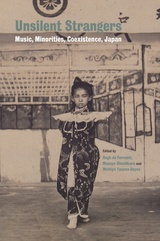 Unsilent Strangers: Music, Minorities, Co-existence, Japan
Edited by Hugh de Ferranti, Michiyo Yoneno-Reyes, and Masaya Shishikura
National University of Singapore Press, 2023 An analysis of the role of music in Japanese migrant communities.
This collection of essays on the music of migrant minorities in and from Japan examines the central role music plays in the ongoing adjustment, conciliation, and transformation of newcomers and “hosts” alike. It is the first academic text to address musical activities across a range of migrant groups in Japan––particularly those of Tokyo and its neighboring areas and the first to juxtapose such communities with those of Japanese emigrants as ethnic minorities elsewhere. It presents both archival and fieldwork-based case studies that highlight music in the dynamics of encounter and attempted identity-making, under a unifying framework of migration.
The 2019 introduction of a new “Specified Skilled Worker” visa category marked the beginning of Japan’s “new immigration era,” led by the slogan of tabunka kyosei, or “multicultural coexistence.” The contributors to this volume analyze the concept itself and the many problems around realizing this ideal through ethnographic accounts of current minorities, including South Indians, Brazilians, Nepalis, Filipinos, Iranians, and Ainu domestic migrants. This volume will be of interest to ethnomusicologists, students of the cultures of migrant communities, and those engaged with cultural change and diversity in Japan and East Asia.
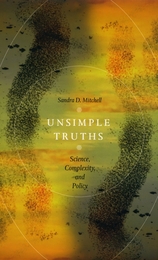 Unsimple Truths: Science, Complexity, and Policy
Sandra D. Mitchell
University of Chicago Press, 2009 The world is complex, but acknowledging its complexity requires an appreciation for the many roles context plays in shaping natural phenomena. In Unsimple Truths, Sandra Mitchell argues that the long-standing scientific and philosophical deference to reductive explanations founded on simple universal laws, linear causal models, and predict-and-act strategies fails to accommodate the kinds of knowledge that many contemporary sciences are providing about the world. She advocates, instead, for a new understanding that represents the rich, variegated, interdependent fabric of many levels and kinds of explanation that are integrated with one another to ground effective prediction and action.
Mitchell draws from diverse fields including psychiatry, social insect biology, and studies of climate change to defend “integrative pluralism”—a theory of scientific practices that makes sense of how many natural and social sciences represent the multi-level, multi-component, dynamic structures they study. She explains how we must, in light of the now-acknowledged complexity and contingency of biological and social systems, revise how we conceptualize the world, how we investigate the world, and how we act in the world. Ultimately Unsimple Truths argues that the very idea of what should count as legitimate science itself should change.
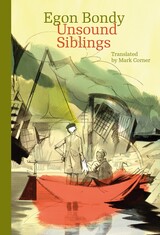 Unsound Siblings
Egon Bondy
Karolinum Press, 2025 A new translation of Egon Bondy’s classic critique and parody of Communist Czechoslovakia.
Bondy's merry utopia, or rather anti-utopia, was written during the bleakest years of “normalization” in Communist Czechoslovakia during the 1970s. Once considered a cult novel of the Czech underground, Unsound Siblings is not only a celebration of the “alternative way of life” of people living deliberately outside of (Communist) state power and a mockery of the contemporary consumerist ideas of the police state, but also a light parody of science fiction, organically incorporating philosophical themes. As much as this work can also be described as “adventure literature,” evoking, for example, the scenery of a “mysterious island,” its overall message reaches the power of a religious, gospel message that it is, despite all odds, possible to live in this world after all. Unsound Siblings, first published in Czech by the exiled 68 Publishers in Toronto and circulated in samizdat copies in Czechoslovakia, later won the Egon Hostovský Prize.
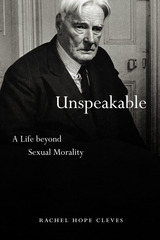 Unspeakable: A Life beyond Sexual Morality
Rachel Hope Cleves
University of Chicago Press, 2020 The sexual exploitation of children by adults has a long, fraught history. Yet how cultures have reacted to it is shaped by a range of forces, beliefs, and norms, like any other social phenomenon. Changes in how Anglo-American culture has understood intergenerational sex can be seen with startling clarity in the life of British writer Norman Douglas (1868–1952), who was a beloved and popular author, a friend of luminaries like Graham Greene, Aldous Huxley, and D.H. Lawrence, and an unrepentant and uncloseted pederast. Rachel Hope Cleves’s careful study opens a window onto the social history of intergenerational sex in the nineteenth and twentieth centuries, revealing how charisma, celebrity, and contemporary standards protected Douglas from punishment—until they didn’t.
Unspeakable approaches Douglas as neither monster nor literary hero, but as a man who participated in an exploitative sexual subculture that was tolerated in ways we may find hard to understand. Using letters, diaries, memoirs, police records, novels, and photographs—including sources by the children Douglas encountered—Cleves identifies the cultural practices that structured pedophilic behaviors in England, Italy, and other places Douglas favored. Her book delineates how approaches to adult-child sex have changed over time and offers insight into how society can confront similar scandals today, celebrity and otherwise.
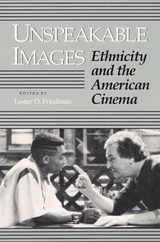 Unspeakable Images: ETHNICITY AND THE AMERICAN CINEMA
Edited by Lester D. Friedman
University of Illinois Press, 1991 Could Woody Allen have made the same movies if he weren't Jewish? Would John Ford's pictures have been different if he weren't an Irish Catholic? Is Spike Lee's color an important ingredient in his movie-making? Such engaging issues are considered in Unspeakable Images, a volume that encourages fresh thinking and research about ethnic issues and the American cinema.
In fourteen chapters on topics ranging from film comedy to reporter movies to Latins in Manhattan, contributors from diverse disciplines explore ethnicity as a broad, complex, multilayered concept. The book's first section scrutinizes ethnicity within the context of traditional modes of film analysis---historical, auteurist, and generic. Essays in the second section relate ethnicity to broader areas of critical thought such as cultural studies, ethnography, postmodernism, psychoanalysis, feminism, and class studies, analyzing how each intersects and amplifies the other.
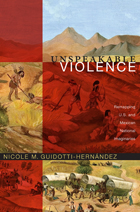 Unspeakable Violence: Remapping U.S. and Mexican National Imaginaries
Nicole M. Guidotti-Hernández
Duke University Press, 2011 Unspeakable Violence addresses the epistemic and physical violence inflicted on racialized and gendered subjects in the U.S.–Mexico borderlands from the mid-nineteenth century through the early twentieth. Arguing that this violence was fundamental to U.S., Mexican, and Chicana/o nationalisms, Nicole M. Guidotti-Hernández examines the lynching of a Mexican woman in California in 1851, the Camp Grant Indian Massacre of 1871, the racism evident in the work of the anthropologist Jovita González, and the attempted genocide, between 1876 and 1907, of the Yaqui Indians in the Arizona–Sonora borderlands. Guidotti-Hernández shows that these events have been told and retold in ways that have produced particular versions of nationhood and effaced other issues. Scrutinizing stories of victimization and resistance, and celebratory narratives of mestizaje and hybridity in Chicana/o, Latina/o, and borderlands studies, she contends that by not acknowledging the racialized violence perpetrated by Mexicans, Chicanas/os, and indigenous peoples, as well as Anglos, narratives of mestizaje and resistance inadvertently privilege certain brown bodies over others. Unspeakable Violence calls for a new, transnational feminist approach to violence, gender, sexuality, race, and citizenship in the borderlands.
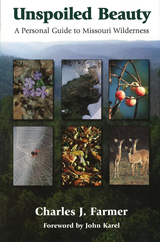 Unspoiled Beauty: A Personal Guide to Missouri Wilderness
Charles J. Farmer
University of Missouri Press, 1999
Tucked within Missouri's borders are eight Congressionally designated Wilderness areas. These magnificent forests, scattered across the southern portion of the state, combine a wide variety of unique ecosystems. In Unspoiled Beauty, Charles Farmer captures the essence of the Missouri Wilderness experience, allowing even those who have never set foot in the wilderness to enjoy its wonders and appreciate its importance.
Farmer begins by describing the wilderness region prior to the Congressional Wilderness designation, providing an overview of the numerous battles that were waged to reclaim the state's wilderness and to assure its preservation. Featured are key players who were instrumental in the acquisition and preservation of Missouri wilderness.
Farmer devotes a chapter to each of the eight Wilderness areas, accompanied by numerous engaging photographs, many in color. He provides a brief history of each and shares his own fascinating personal experiences of camping, hiking, backpacking, hunting, and fishing within each. He discusses trails, fauna, flora, and other colorful details along the way. His adventures take place during different seasons of the year; he is sometimes alone, sometimes in company. Through his eyes, each area is brought vividly to life.
"Wilderness Tips" and a guide with rules for the novice camper, hiker, backpacker, hunter, and fisherman enhance the book's usefulness. The final chapter lists the areas in Missouri that qualify for Wilderness designation in the New Forest Plan. Unspoiled Beauty may well play a part in saving Missouri's remaining wilderness candidates. It will also help other states that are preparing campaigns to save their own wilderness areas.
Wilderness advocates, hikers and backpackers, fishermen and hunters, anyone who appreciates the great outdoors will enjoy this important new book.
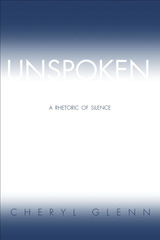 Unspoken: A Rhetoric of Silence
Cheryl Glenn
Southern Illinois University Press, 2004 In our talkative Western culture, speech is synonymous with authority and influence while silence is frequently misheard as passive agreement when it often signifies much more. In her groundbreaking exploration of silence as a significant rhetorical art, Cheryl Glenn articulates the ways in which tactical silence can be as expressive and strategic an instrument of human communication as speech itself.
Drawing from linguistics, phenomenology, feminist studies, anthropology, ethnic studies, and literary analysis, Unspoken: A Rhetoric of Silence theorizes both a cartography and grammar of silence. By mapping the range of spaces silence inhabits, Glenn offers a new interpretation of its complex variations and uses. Glenn contextualizes the rhetoric of silence by focusing on selected contemporary examples. Listening to silence and voice as gendered positions, she analyzes the highly politicized silences and words of a procession of figures she refers to as “all the President’s women,” including Anita Hill, Lani Guiner, Gennifer Flowers, and Chelsea Clinton. She also turns an investigative ear to the cultural taciturnity attributed to various Native American groups—Navajo, Apache, Hopi, and Pueblo—and its true meaning. Through these examples, Glenn reinforces the rhetorical contributions of the unspoken, codifying silence as a rhetorical device with the potential to deploy, defer, and defeat power. Unspoken concludes by suggesting opportunities for further research into silence and silencing, including music, religion, deaf communities, cross-cultural communication, and the circulation of silence as a creative resource within the college classroom and for college writers.
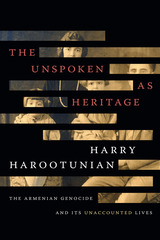 The Unspoken as Heritage: The Armenian Genocide and Its Unaccounted Lives
Harry Harootunian
Duke University Press, 2019 In the 1910s historian Harry Harootunian's parents Ohannes and Vehanush escaped the mass slaughter of the Armenian genocide, making their way to France, where they first met, before settling in suburban Detroit. Although his parents rarely spoke of their families and the horrors they survived, the genocide and their parents' silence about it was a permanent backdrop to the Harootunian children's upbringing. In The Unspoken as Heritage Harootunian—for the first time in his distinguished career—turns to his personal life and family heritage to explore the genocide's multigenerational afterlives that remain at the heart of the Armenian diaspora. Drawing on novels, anecdotes, and reports, Harootunian presents a composite sketch of the everyday life of his parents, from their childhood in East Anatolia to the difficulty of making new lives in the United States. A meditation on loss, inheritance, and survival—in which Harootunian attempts to come to terms with a history that is just beyond his reach—The Unspoken as Heritage demonstrates how the genocidal past never leaves the present, even in its silence.
 Unspooled: How the Cassette Made Music Shareable
Rob Drew
Duke University Press, 2024 Well into the new millennium, the analog cassette tape continues to claw its way back from obsolescence. New cassette labels emerge from hipster enclaves while the cassette’s likeness pops up on T-shirts, coffee mugs, belt buckles, and cell phone cases. In Unspooled, Rob Drew traces how a lowly, hissy format that began life in office dictation machines and cheap portable players came to be regarded as a token of intimate expression through music and a source of cultural capital. Drawing on sources ranging from obscure music zines to transcripts of Congressional hearings, Drew examines a moment in the early 1980s when music industry representatives argued that the cassette encouraged piracy. At the same time, 1980s indie rock culture used the cassette as a symbol to define itself as an outsider community. Indie’s love affair with the cassette culminated in the mixtape, which advanced indie’s image as a gift economy. By telling the cassette’s long and winding history, Drew demonstrates that sharing cassettes became an acceptable and meaningful mode of communication that initiated rituals of independent music recording, re-recording, and gifting.
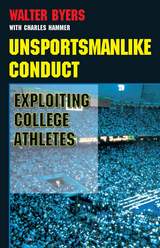 Unsportsmanlike Conduct: Exploiting College Athletes
Walter Byers
University of Michigan Press, 1997 Walter Byers, who served as NCAA executive director from 1951 to 1987, was charged with the dual mission of keeping intercollegiate sports clean while generating millions of dollars each year as income for the colleges. Here Byers exposes, as only he can, the history and present-day state of college athletics: monetary gifts, questionable academic standards, advertising endorsements, legal battles, and the political manipulation of college presidents.
Byers believes that modern-day college sports are no longer a student activity: they are a high-dollar commercial enter-prise, and college athletes should have the same access to the free market as their coaches and colleges. He favors no one as he cites individual cases of corruption in NCAA history. From Byers' first enforcement case, against the University of Kentucky in 1952, to the NCAA's 1987 "death penalty" levied against Southern Methodist University of Dallas, he shows the change in the athletic environment from simple rules and personally responsible officials to convoluted, cyclopedic regulations with high-priced legal firms defending college violators against a limited NCAA enforcement system. This book is a must for anyone involved in college sports--athletes, coaches, fans, college faculty, and administrators. As NCAA executive director, Byers started the an enforcement program, pioneered a national academic rule for athletes, and signed more than fifty television contracts with ABC, CBS, NBC, ESPN, and Turner Broadcasting. He oversaw the growth of the NCAA basketball tournament to one that, in 1988, grossed $68.2 million. As the one person who has been inside college athletics for forty years, Walter Byers is uniquely qualified to tell the story of the NCAA and today's exploitation of college athletes.
"There has been no other executive in the history of professional, college, or amateur sports who has had such an impact in his area." --Keith Jackson, ABC Sports
"Walter Byers has done more to shape intercollegiate athletics that any single person in history. He brought a combination of leadership, insight, and integrity to intercollegiate athletics that we will never again see equaled." --Bob Knight, Head Basketball Coach, Indiana University
 Unstable Frontiers: Technomedicine and the Cultural Politics of “Curing” AIDS
John Nguyet Erni
University of Minnesota Press, 1994 Unstable Frontiers was first published in 1994. Minnesota Archive Editions uses digital technology to make long-unavailable books once again accessible, and are published unaltered from the original University of Minnesota Press editions. "John Erni's heartfelt and insightful book is a valuable contribution to the study of the cultural politics of AIDS."–Jeff Nunokawa Princeton University The "cure" for AIDS: The search goes on, keeping pace with our belief that AIDS is incurable. How such a seeming paradox works-and how it may well work against the proper treatment of the disease-is the subject of Unstable Frontiers, a probing, critical look at the cultural politics behind the quest for a cure for AIDS. This massive commercial and scientific project, John Erni suggests, actually hinges on our contradictory definitions of the disease as curable and incurable at the same time. Drawing on diverse sources, from popular media to medical literature to cultural theory, he shows how the dual discourse of curability/incurability frames the way we think about and act on issues of medical treatment for AIDS. His work makes a major advance in our understanding of—and, perhaps, humane response to—a national crisis. In his critique of the logic and fantasies underlying the double definition of AIDS, Erni explores a broad range of issues: the scientific paradigm used to develop AZT; the politics of alternative treatment practices, of clinical drug trials, and of AIDS activism; and the notions of time and temporality operating in AIDS treatment science. He also addresses the problematic popular themes, such as "AIDS is invariably fatal" and "Knowledge = Cure." Unique in its approach to a social and political issue still in the making, the book reveals how AIDS has challenged technomedicine's historical position of authority-and in doing so, recasts this challenge in a powerful and ultimately hopeful way. John Nguyet Erni is assistant professor of communication at the University of New Hampshire. He has published essays on AIDS and is currently working on a book about AIDS in Thailand.
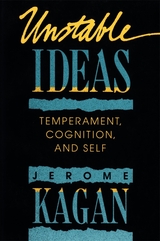 Unstable Ideas: Temperament, Cognition, and Self
Jerome Kagan
Harvard University Press, 1989 In his most probing and expansive work to date, Jerome Kagan—one of this country’s leading psychologists—demonstrates that innovative research methods in the behavioral sciences and neurobiology, together with a renewed philosophical commitment to rigorous empiricism, are transforming our understanding of human behavior. Contemporary psychology, according to Kagan, has been preoccupied with three central themes: How malleable is temperament? How predictable are the milestones of cognitive development? How accurate is consciousness as a window onto the self, its motives, beliefs, and emotions?
In a review of past approaches to these questions, Kagan argues persuasively that behavioral scientists have reached less-than-satisfactory answers because they have failed to appreciate the biases inherent in their frame of reference and the limitations of their investigative procedures. He calls into question a number of techniques that have been mainstays of psychological investigation: the Ainsworth Strange Situation for assessing the emotional attachment of an infant to its mother, and interviews and questionnaires as indexes of personality, to name only two. Kagan’s own research has used novel laboratory situations to discover a group of children who exhibit a pattern of behavior he calls “temperamentally inhibited”—they are restless and irritable from birth, and by twenty-four months cling to the mother and show biological signs of high anxiety in unfamiliar situations.
These findings, coupled with current understanding of the structure and chemistry of the nervous system, lead him to speculate that these children are born with a biological predisposition that favors the development of a shy, fearful personality. Through longitudinal studies of this kind, as well as through his cross-cultural investigations of cognitive development, Kagan has infused new meaning into the nature–nurture debate.
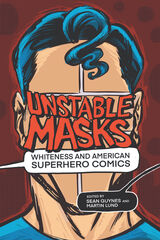 Unstable Masks: Whiteness and American Superhero Comics
Edited by Sean Guynes and Martin Lund
Ohio State University Press, 2020 A CHOICE Outstanding Academic Title for 2020
In Unstable Masks: Whiteness and American Superhero Comics, Sean Guynes and Martin Lund bring together a series of essays that contextualize the histories and stakes of whiteness studies, superhero comics, and superhero studies for academics, fans, and media-makers alike. The volume illustrates how the American comic book superhero is fundamentally a figure of white power and white supremacy and ultimately calls for diversity in superhero comics as well as a democratized media culture.
Contributors not only examine superhero narratives but also delve into the production, distribution, audience, and reception of those narratives, highlighting the imbrication of forces that have helped to create, normalize, question, and sometimes even subvert American beliefs about whiteness and race. Unstable Masks considers the co-constitutive nature of identity, representation, narrative, production and consumption, and historical and cultural contexts in forging the stereotypes that decide who gets to be a superhero and who gets to be American on the four-color pages of comic books.
Unstable Modules over the Steenrod Algebra and Sullivan's Fixed Point Set Conjecture
Lionel Schwartz
University of Chicago Press, 1994 A comprehensive account of one of the main directions of algebraic topology, this book focuses on the Sullivan conjecture and its generalizations and applications. Lionel Schwartz collects here for the first time some of the most innovative work on the theory of modules over the Steenrod algebra, including ideas on the Segal conjecture, work from the late 1970s by Adams and Wilkerson, and topics in algebraic group representation theory.
This course-tested book provides a valuable reference for algebraic topologists and includes foundational material essential for graduate study.
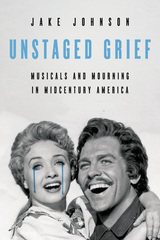 Unstaged Grief: Musicals and Mourning in Midcentury America
Jake Johnson
University of Illinois Press, 2025 Often dismissed as escapism, screen musicals of the 1960s in fact tapped into unspoken sadness about an America that was slipping away. Jake Johnson delves into film and television musicals of the era to examine their place in networks of grieving in America, for America, and about America. The Golden Age of musical theater ended just as Elisabeth Kübler-Ross’s On Death and Dying debuted, and Johnson uses Kübler-Ross’s five stages to frame the intertwining of musicals and grief. He analyzes films like Seven Brides for Seven Brothers and State Fair alongside paintings, poetry, and other images and texts to reveal how the musical theater engine built in the first half of the century broke down just as a new language emerged to describe the melancholy felt by people facing the end of the world they had known. Nuanced and original, Unstaged Grief plumbs the grief, loss, and hope behind the Technicolor spectacle and rousing showstoppers.
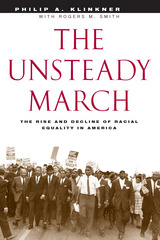 The Unsteady March: The Rise and Decline of Racial Equality in America
Philip A. Klinkner and Rogers M. Smith
University of Chicago Press, 1999 American life is filled with talk of progress and equality, especially when the issue is that of race. But has the history of race in America really been the continuous march toward equality we'd like to imagine it has? This sweeping history of race in America argues quite the opposite: that progress toward equality has been sporadic, isolated, and surrounded by long periods of stagnation and retrenchment.
"[An] unflinching portrait of the leviathan of American race relations. . . . This important book should be read by all who aspire to create a more perfect union."—Publishers Weekly, starred review
"Could it be that our unswerving belief in the power of our core values to produce racial equality is nothing but a comforting myth? That is the main argument put forth by Philip Klinkner and Rogers Smith . . . The Unsteady March is disturbing because it calls into question our cherished national belief and does so convincingly. . . . [It] is beautifully written, and the social history it provides is illuminating and penetrating."—Aldon Morris, American Journal of Sociology
Winner of the Horace Mann Bond Award of the W.E.B. Du Bois Institute for Afro-American Research at Harvard University.
 Unsung Heroes: Federal Execucrats Making a Difference
Norma M. Riccucci
Georgetown University Press, 1995 This book explores an important side of public employment that most Americans never get the opportunity to see—high-level career executives who make positive contributions to our quality of life. Norma M. Riccucci profiles six "unsung heroes," the people behind the scenes of some of the most successful programs in American government, and identifies the tools, skills, and strategies that make them effective leaders. Through in-depth interviews and provocative story-telling, Riccucci demonstrates that while these executive-level bureaucrats—or "execucrats"—may have an overall negative public image, they create, develop, execute, and enforce a number of programs and public policies that change our country for the better. She highlights six of these modern execucrats who best exemplify the creativity, determination, and leadership found in such officials: —William Black, Senior Deputy Chief Counsel, Office of Thrift Supervision, who attacked the rampant corruption and mismanagement that created the savings and loan crisis; —Eileen Claussen, Director, Atmospheric and Indoor Air Programs, U.S. Environmental Protection Agency, who negotiated as intensely within her own government as with other countries to create an international plan to protect the earth's ozone layer; —Ambassador Edward Perkins, U.S. State Department, the first African-American Ambassador to South Africa and the first American ambassador to meet with black South African leaders as part of his persistent efforts to end apartheid in that country; —Stephen Marica, Assistant Inspector General, Small Business Administration, who investigated the Wedtech scandal, which bilked millions of dollars in fraudulent defense contracts from American taxpayers; —Dr. Vince Hutchins, Director, Division of Maternal and Child Health, U.S. Department of Health and Human Services, who spearheaded the team that developed "Healthy Mothers, Healthy Babies Coalition," a public-private partnership that improved, and even saved, the lives of thousands of newborn babies; and —Dr. Helene Gayle, Division Chief, HIV-AIDS Division, U.S. Centers for Disease Control, who is actively battling the AIDS virus through education and prevention programs around the world. Riccucci not only relates the intriguing tales of these six dedicated officials who overcame the challenges before them, but she also analyzes the specific factors—from knowledge of the system to honesty, integrity, and humor—that are needed to become a dynamic government executive. Of interest to those both inside and outside government circles, Unsung Heroes gives captivating insights into effective executive leadership.
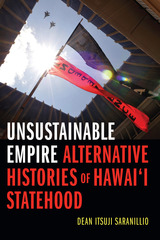 Unsustainable Empire: Alternative Histories of Hawai‘i Statehood
Dean Itsuji Saranillio
Duke University Press, 2018 In Unsustainable Empire Dean Itsuji Saranillio offers a bold challenge to conventional understandings of Hawai‘i’s admission as a U.S. state. Hawai‘i statehood is popularly remembered as a civil rights victory against racist claims that Hawai‘i was undeserving of statehood because it was a largely non-white territory. Yet Native Hawaiian opposition to statehood has been all but forgotten. Saranillio tracks these disparate stories by marshaling a variety of unexpected genres and archives: exhibits at world's fairs, political cartoons, propaganda films, a multimillion-dollar hoax on Hawai‘i’s tourism industry, water struggles, and stories of hauntings, among others. Saranillio shows that statehood was neither the expansion of U.S. democracy nor a strong nation swallowing a weak and feeble island nation, but the result of a U.S. nation whose economy was unsustainable without enacting a more aggressive policy of imperialism. With clarity and persuasive force about historically and ethically complex issues, Unsustainable Empire provides a more complicated understanding of Hawai‘i’s admission as the fiftieth state and why Native Hawaiian place-based alternatives to U.S. empire are urgently needed.
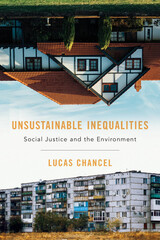 Unsustainable Inequalities: Social Justice and the Environment
Lucas Chancel
Harvard University Press, 2020 A Financial Times Best Book of the Year
A hardheaded book that confronts and outlines possible solutions to a seemingly intractable problem: that helping the poor often hurts the environment, and vice versa.
Can we fight poverty and inequality while protecting the environment? The challenges are obvious. To rise out of poverty is to consume more resources, almost by definition. And many measures to combat pollution lead to job losses and higher prices that mainly hurt the poor. In Unsustainable Inequalities, economist Lucas Chancel confronts these difficulties head-on, arguing that the goals of social justice and a greener world can be compatible, but that progress requires substantial changes in public policy.
Chancel begins by reviewing the problems. Human actions have put the natural world under unprecedented pressure. The poor are least to blame but suffer the most—forced to live with pollutants that the polluters themselves pay to avoid. But Chancel shows that policy pioneers worldwide are charting a way forward. Building on their success, governments and other large-scale organizations must start by doing much more simply to measure and map environmental inequalities. We need to break down the walls between traditional social policy and environmental protection—making sure, for example, that the poor benefit most from carbon taxes. And we need much better coordination between the center, where policies are set, and local authorities on the front lines of deprivation and contamination.
A rare work that combines the quantitative skills of an economist with the argumentative rigor of a philosopher, Unsustainable Inequalities shows that there is still hope for solving even seemingly intractable social problems.
 Unswerving
Barbara Ridley
University of Wisconsin Press, 2024 When Tave wakes up alone in the hospital, she barely remembers the car wreck. Far from home, dazed, and despondent, she struggles to face the challenges of her new paralysis—all while worrying about her partner, Les, also severely injured in the accident, now cared for by her homophobic parents who refuse to allow contact.
In rehab, Tave relearns life skills and comes to recognize that her future will be completely different than she’d imagined. Where will she live? How will she find the help she needs? Can her friends rise to the occasion? Or will she be forced to move back in with her mother, putting up with endless talk of faith healers? Her one beacon of hope is Beth, her physical therapist. But Beth’s relationship problems with her own girlfriend push her toward overinvolvement—and risk damaging both her career and Tave’s recovery.
A story of courage, resilience, and love, Unswerving challenges readers’ preconceived notions of disability, of limitations, and of the inevitability of fate.
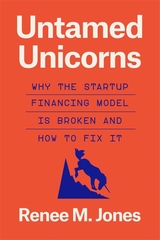 Untamed Unicorns: Why Startup Finance Is Broken and How to Fix It
Renée M. Jones
Harvard University Press The term “unicorn” for a private startup company worth $1 billion or more was coined to emphasize the rarity of such ventures. But today there are more than 1,500 of them, with a combined valuation of over $4 trillion. By remaining private, these corporate behemoths shield themselves from disclosure requirements, investor oversight, and market discipline—mechanisms designed to protect investors and the public from corporate wrongdoing. It’s no coincidence that in recent years, a number of prominent startups have been the sites of founder misconduct and fraud. This wave of startup scandals exposes significant problems with the venture capital financing model and the deregulation that helped fuel the industry’s explosive growth.
Untamed Unicorns connects the most dramatic startup scandals, including FTX, Theranos, WeWork, and Uber, to structural flaws in the startup financing model. Detailing the deregulatory reforms
implemented by Congress and the Securities and Exchange Commission over the past 40 years, it shows how these have eroded core safeguards of securities law that were first established during the New Deal era.
As Renée M. Jones makes clear, allowing unicorn companies to run wild doesn’t threaten only the sophisticated venture capitalists who finance Silicon Valley. When the largest startups go awry, the consequences are often severe for ordinary investors, employees, and the public at large. Revealing the risks inherent in the current system, Untamed Unicorns presents a roadmap for reform to restore proper boundaries between public and private securities markets.
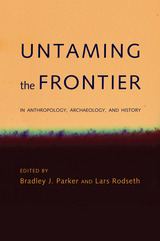 Untaming the Frontier in Anthropology, Archaeology, and History
Edited by Bradley J. Parker and Lars Rodseth
University of Arizona Press, 2005 Despite a half century of attempts by social scientists to compare frontiers around the world, the study of these regions is still closely associated with the nineteenth-century American West and the work of Frederick Jackson Turner. As a result, the very concept of the frontier is bound up in Victorian notions of manifest destiny and rugged individualism. The frontier, it would seem, has been tamed. This book seeks to open a new debate about the processes of frontier history in a variety of cultural contexts, untaming the frontier as an analytic concept, and releasing it in a range of unfamiliar settings. Drawing on examples from over four millennia, it shows that, throughout history, societies have been formed and transformed in relation to their frontiers, and that no one historical case represents the normal or typical frontier pattern. The contributors—historians, anthropologists, and archaeologists—present numerous examples of the frontier as a shifting zone of innovation and recombination through which cultural materials from many sources have been unpredictably channeled and transformed. At the same time, they reveal recurring processes of frontier history that enable world-historical comparison: the emergence of the frontier in relation to a core area; the mutually structuring interactions between frontier and core; and the development of social exchange, merger, or conflict between previously separate populations brought together on the frontier. Any frontier situation has many dimensions, and each of the chapters highlights one or more of these, from the physical and ideological aspects of Egypt’s Nubian frontier to the military and cultural components of Inka outposts in Bolivia to the shifting agrarian, religious, and political boundaries in Bengal. They explore cases in which the centripetal forces at work in frontier zones have resulted in cultural hybridization or “creolization,” and in some instances show how satellite settlements on the frontiers of core polities themselves develop into new core polities. Each of the chapters suggests that frontiers are shaped in critical ways by topography, climate, vegetation, and the availability of water and other strategic resources, and most also consider cases of population shifts within or through a frontier zone. As these studies reveal, transnationalism in today’s world can best be understood as an extension of frontier processes that have developed over thousands of years. This book’s interdisciplinary perspective challenges readers to look beyond their own fields of interest to reconsider the true nature and meaning of frontiers.
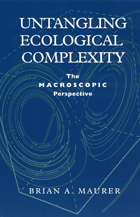 Untangling Ecological Complexity: The Macroscopic Perspective
Brian A. Maurer
University of Chicago Press, 1998 Ecologists increasingly find themselves called upon to address the impacts of global change on biodiversity. Yet most studies of biodiversity focus solely on intensive, experimental analyses of localized ecological communities. In Untangling Ecological Complexity, Brian A. Maurer argues for a more pluralistic approach, showing how ecologists might enhance their ability to tackle global problems by incorporating broader spatial and temporal perspectives into their research.
Maurer begins by reviewing the strengths and limitations of reductionist experimental approaches. Although these studies have produced much valuable data, their small scale restricts the kinds of inferences that can be drawn from them. Maurer then demonstrates how statistical methods can be used to identify processes (such as dispersal or nonrandom extinction) that operate across broad geographic scales, yet which also have profound impacts on local ecosystems. This macroscopic perspective, Maurer suggests, provides a powerful tool for untangling ecological complexity.
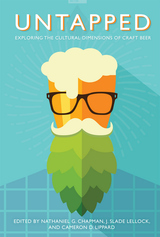 Untapped: Exploring the Cultural Dimensions of Craft Beer
Nathaniel G. Chapman
West Virginia University Press, 2017 Untapped collects twelve previously unpublished essays that analyze the rise of craft beer from social and cultural perspectives.
In the United States, the United Kingdom, and Western Europe there has been exponential growth in the number of small independent breweries over the past thirty years – a reversal of the corporate consolidation and narrowing of consumer choice that characterized much of the twentieth century. While there are legal and policy components involved in this shift, the contributors to Untapped ask broader questions. How does the growth of craft beer connect to trends like the farm-to-table movement, gentrification, the rise of the “creative class,” and changing attitudes toward both cities and farms? How do craft beers conjure history, place, and authenticity? At perhaps the most fundamental level, how does the rise of craft beer call into being new communities that may challenge or reinscribe hierarchies based on gender, class, and race?
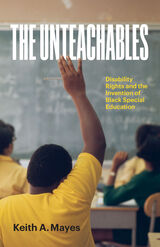 The Unteachables: Disability Rights and the Invention of Black Special Education
Keith A. Mayes
University of Minnesota Press, 2023 How special education used disability labels to marginalize Black students in public schools
The Unteachables examines the overrepresentation of Black students in special education over the course of the twentieth century. As African American children integrated predominantly white schools, many were disproportionately labeled educable mentally retarded (EMR), learning disabled (LD), and emotionally behavioral disordered (EBD). Keith A. Mayes charts the evolution of disability categories and how these labels kept Black learners segregated in American classrooms. The civil rights and the educational disability rights movements, Mayes shows, have both collaborated and worked at cross-purposes since the beginning of school desegregation. Disability rights advocates built upon the opportunity provided by the civil rights movement to make claims about student invisibility at the level of intellectual and cognitive disabilities. Although special education ostensibly included children from all racial groups, educational disability rights advocates focused on the needs of white disabled students, while school systems used disability discourses to malign and marginalize Black students. From the 1940s to the present, social science researchers, policymakers, school administrators, and teachers have each contributed to the overrepresentation of Black students in special education. Excavating the deep-seated racism embedded in both the public school system and public policy, The Unteachables explores the discriminatory labeling of Black students, and how it indelibly contributed to special education disproportionality, to student discipline and push-out practices, and to the school-to-prison pipeline effect.
 The Unthinkable Revolution in Iran
Charles Kurzman
Harvard University Press, 2005 The shah of Iran, Mohammad Reza Pahlavi, would remain on the throne for the foreseeable future: This was the firm conclusion of a top-secret CIA analysis issued in October 1978. One hundred days later the shah--despite his massive military, fearsome security police, and superpower support was overthrown by a popular and largely peaceful revolution. But the CIA was not alone in its myopia, as Charles Kurzman reveals in this penetrating work; Iranians themselves, except for a tiny minority, considered a revolution inconceivable until it actually occurred. Revisiting the circumstances surrounding the fall of the shah, Kurzman offers rare insight into the nature and evolution of the Iranian revolution and into the ultimate unpredictability of protest movements in general.
As one Iranian recalls, "The future was up in the air." Through interviews and eyewitness accounts, declassified security documents and underground pamphlets, Kurzman documents the overwhelming sense of confusion that gripped pre-revolutionary Iran, and that characterizes major protest movements. His book provides a striking picture of the chaotic conditions under which Iranians acted, participating in protest only when they expected others to do so too, the process approaching critical mass in unforeseen and unforeseeable ways. Only when large numbers of Iranians began to "think the unthinkable," in the words of the U.S. ambassador, did revolutionary expectations become a self-fulfilling prophecy. A corrective to 20-20 hindsight, this book reveals shortcomings of analyses that make the Iranian revolution or any major protest movement seem inevitable in retrospect.
Unthinking Mastery: Dehumanism and Decolonial Entanglements
Julietta Singh
Duke University Press, 2018 Julietta Singh challenges the drive toward the mastery over self and others by showing how the forms of self-mastery advocated by anticolonial thinkers like Fanon and Gandhi unintentionally reproduced colonial logic, thereby leading her to argue for a more productive human subjectivity that is not centered on concepts of mastery.
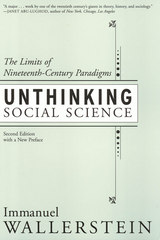 Unthinking Social Science: Limits Of 19Th Century Paradigms
Immanuel Wallerstein
Temple University Press, 2001 In this new edition of a classic work -- now with a new preface -- on the roots of social scientific thinking, Immanuel Wallerstein develops a thorough-going critique of the legacy of nineteenth-century social science for social thought in the new millennium. We have to "unthink" -- radically revise and discard -- many of the presumptions that still remain the foundation of dominant perspectives today. Once considered liberating, these notions are now barriers to a clear understanding of the social world. They include, for example, ideas built into the concept of "development." In place of such a notion, Wallerstein stresses transformations in time and space. Geography and chronology should not be regarded as external influences upon social transformations but crucial to what such transformation actually is. Unthinking Social Science applies the ideas thus elaborated to a variety of theoretical areas and historical problems. Wallerstein also offers a critical discussion of the key figures whose ideas influenced the position he formulates -- including Karl Marx and Fernand Braudel, among others. In the concluding sections of the book, Wallerstein demonstrates how these new insights lead to a revision of world-systems analysis.
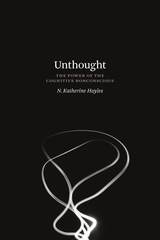 Unthought: The Power of the Cognitive Nonconscious
N. Katherine Hayles
University of Chicago Press, 2017 N. Katherine Hayles is known for breaking new ground at the intersection of the sciences and the humanities. In Unthought, she once again bridges disciplines by revealing how we think without thinking—how we use cognitive processes that are inaccessible to consciousness yet necessary for it to function.
Marshalling fresh insights from neuroscience, cognitive science, cognitive biology, and literature, Hayles expands our understanding of cognition and demonstrates that it involves more than consciousness alone. Cognition, as Hayles defines it, is applicable not only to nonconscious processes in humans but to all forms of life, including unicellular organisms and plants. Startlingly, she also shows that cognition operates in the sophisticated information-processing abilities of technical systems: when humans and cognitive technical systems interact, they form “cognitive assemblages”—as found in urban traffic control, drones, and the trading algorithms of finance capital, for instance—and these assemblages are transforming life on earth. The result is what Hayles calls a “planetary cognitive ecology,” which includes both human and technical actors and which poses urgent questions to humanists and social scientists alike.
At a time when scientific and technological advances are bringing far-reaching aspects of cognition into the public eye, Unthought reflects deeply on our contemporary situation and moves us toward a more sustainable and flourishing environment for all beings.
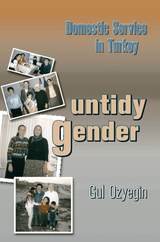 Untidy Gender: Domestic Service in Turkey
Gul Ozyegin
Temple University Press, 2000 "A sophisticated and sensitive text on domestic service in Turkey that singles itself out by a powerful account of the micro-sociology of power. It engages the reader in much broader debates about the mutual relations of class and gender, the role of patriarchal controls in shaping informal female labor markets and the management of status differentials by women in their daily lives. An important scholarly contribution written in a lucid and accessible style."
--Deniz Kandiyoti, School of Oriental and African Studies, University of London
Untidy Gender takes readers into the interconnected worlds of Turkish maids and the women who employ them, tracing the incorporation of rural migrant women into the interiors of the domestic spheres of the urban middle-classes. Firmly grounded in data collected through a representative survey of 160 domestic workers, in-depth interviews, and participant observation in the kinship-based communities of domestic workers, this book forges a new understanding of the complex interaction between gender and class subordination.
Ozyegin traces the lives of two kinds of workers; those from the squatter settlements who work in a number of locations, and those who live with husbands employed as "doorkeepers" or building superintendents in the basements of middle-class apartment buildings. In a literal "upstairs, downstairs" arrangement, the latter women sometimes take on apartment cleaning for clients in the building.
At the center of the book are a number of ironies about patriarchy. On the surface, husbands have absolute control over whether or not their wives work, but some women work in secret, and those "doorkeeper" husbands who allow their wives to work often provide child care themselves. Ironically, the very constraints on the spatial and social mobility of the women creates a labor market in which domestic workers' labor is expensive and not readily forthcoming, which, in turn, gives them a degree of power in negotiating their relationship with their middle-class employers.
Untidy Gender offers insights not only into the gender and class dynamics of Turkish society, but contributes to the refinement of central terms of feminist scholarship and research on work in the informal sector, cross-class relations between women, gender and class inequality, and women's experiences of modernity and urbanization. The author ends with a personal account of her own difficulties with the class tensions of the maid-employer relationship.
"Untidy Gender makes contributions to a large number of debates in several social science fields and sub-fields. And it does so on an extraordinarily sound methodological base: Ozyegin was able to construct a random sample for her 'women in the basement.' This is the gold standard of research, and may be unique in the research annals of studies of domestic workers."
--Rae Lesser Blumberg, William R. Kenan, Jr. Professor of Sociology, University of Virginia
"This original book sheds new light on the dynamics of modernity and newly constituted urban identities. Through a careful ethnographic study of paid domestic work, Ozyegin illuminates the varied ways in which relations of class and gender inequalities are shaped and maintained. American audiences interested in rural-urban migrants, in intersectionalities of race, class, and gender, and in identities, power, and resistance in the workplace will find some of the most compelling ethnography and many valuable theoretical nuggets in this book."
--Pierrette Hondagneu-Sotelo, Associate Professor, Department of Sociology, University of Southern California
"Ozyegin presents a cutting-edge analysis of the complexities of modernization by focusing on gender relations. While avoiding numerous rhetorical traps around questions of 'difference' Ozyegin seamlessly weaves together a thoughtfully articulated theory with a meticulous empirical analysis of patriarchal and class relations among modern urban women and more traditional migrant women living at the margins of modernity. Given its significant substantive and theoretical contributions, I will look forward to teaching Untidy Gender in my courses."
--Judith M. Gerson, Associate Professor, Departments of Sociology and Women's Studies, Rutgers University, New Brunswick
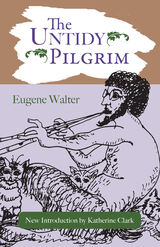 The Untidy Pilgrim
Eugene Walter
University of Alabama Press, 2001 "A zanier bunch of characters has seldom been collected between the covers of a novel. And yet, eccentric though they may be, it is impossible not to love them." —New York Times Eugene Walter’s first novel, and winner of the 1954 Lippincott Fiction Prize for Young Novelists, is about a young man from a small central Alabama town who goes south of the “salt line” to Mobile to work in a bank and study law. As soon as this unnamed pilgrim arrives, he realizes that—although he is still in Alabama—he has entered a separate physical kingdom of banana trees and palm fronds, subtropical heat and humidity, and old houses and lacy wrought-iron balconies. In Mobile, Alabama, the town that can claim the oldest Mardi Gras in America, there is no Puritan work ethic; the only ruling forces are those of chaos, craziness, and caprice. Such forces overtake the pilgrim, seduce him away from the beaten career path, and set him on a zigzag course through life.
The Untidy Pilgrim celebrates the insularity as well as the eccentricity of southerners—and Mobilians, in particular—in the mid-twentieth century. Cut off from the national mainstream, they are portrayed as devoid of that particularly American angst over what to “do” and accomplish with one’s life, and indulge instead in art, music, cooking, nature, and love. In this novel Walter dispels the gloomy southern literary tradition established by Faulkner, Capote, and McCullers to illuminate the joyous quirkiness of human existence.
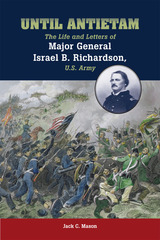 Until Antietam: The Life and Letters of Major General Israel B. Richardson, U.S. Army
Jack C. Mason
Southern Illinois University Press, 2009 While researching this book, Jack C. Mason made the kind of discovery that historians dream of. He found more than one hundred unpublished and unknown letters from Union general Israel B. Richardson to his family, written from his time as a West Point cadet until the day before his fatal wounding at the Battle of Antietam, the bloodiest day in American history. Using these freshly uncovered primary sources as well as extensive research in secondary materials, Mason has written the first-ever biography of Israel Bush Richardson. Mason traces Richardson’s growth as a soldier through his experiences and the guidance of his superiors, and then as a leader whose style reflected the actions of the former commanders he respected. Though he was a disciplinarian, Richardson took a relaxed attitude toward military rules, earning him the affection of his men. Unfortunately, his military career was cut short just as high-ranking officials began to recognize his aggressive leadership. He was mortally wounded while leading his men at Antietam and died on November 3, 1862. Until Antietam brings to life a talented and fearless Civil War infantry leader. Richardson’s story, placed within the context of nineteenth-century warfare, exemplifies how one soldier’s life influenced his commanders, his men, and the army as a whole. Winner of the Army Historical Foundation 2009 Distinguished Book Award
|
|
